#we had vastly different reactions to the situation but it didn’t change the basics of the situation
Explore tagged Tumblr posts
Text
.
#I was talking with my sister today about our parents’ approach to parenting and like what they fucked up#and we both had noted how while our reactions to them yelling at us were polar opposites both of us faced severe consequences#like if our parents wanted to have a Talk with me I would end up hyperventilating and crying and not able to speak#because I was having a panic attack that was caused by the situation I was in and I wasn’t allowed to leave and I would be yelled at for#having a panic attack and crying and not talking#if our parents wanted to have a Talk with my sister she would be assertive and call them out and then enforce her boundaries and decide to#walk away when she was done/they were being too shitty#and that resulted in my dad dragging her through the house on several occasions because leaving Was Not Allowed.#it usually ended in yelling from both sides and my sister crying#we had vastly different reactions to the situation but it didn’t change the basics of the situation#Talks always happened when our parents wanted to exert their power over us (whether consciously or not)#we were also talking about piercings my sister wants and I realized that the difference between what I see as good parenting and what our#parents do is much bigger than I’d realized/is much wider ranging#like if my kid wanted to get a piercing or something I’d say make sure you’re certain. then wait a month and reevaluate.#if you still want the piercing then I will help you get it and make sure it’s done well and at a reputable place (like. not Claire’s)#my parents just won’t allow my sister to get certain piercings. like yeah she’s young but also one of them she’s wanted for at least a year#i would also talk to my kid about how piercings and other body mods are perceived in public and in the workplace so that they’d understand#that there might be impacts beyond just it not healing right or something. but that would be more so that they’d be educated not discouraged#if they were in like middle school I might ask them to wait until they’re older/why they want it then and then help them get it when they’re#older but that would be more for difficult to care for piercings or ones that can’t close up (that go through cartilage)#but just because someone is a minor doesn’t mean that they don’t have just as much bodily autonomy as someone who’s over 18#their guardian should guide them to make safe healthy and educated choices because an adult knows more. not restrict choices all together#just because they have more power over someone#like that already led to my sister piercing her nose on her own. do my parents think that she just won’t give herself another piercing if#they tell her no? because that’s not how any of this works#other things that they fucked up- ‘I don’t know isn’t an answer’#it was originally banned for me with my first therapist and my parents expanded it to the whole house (except for them of course)#my sister never really got the opportunity to say I don’t know because I started therapy in elementary school#uncertainty is okay! and all that ever taught us was how to say the answers they wanted to hear which in turn made us only be the kind of#person they wanted us to be and neither of us got to explore who we are and how we want to express ourselves until recently
0 notes
Text
A meta and analysis on Yagami Taichi
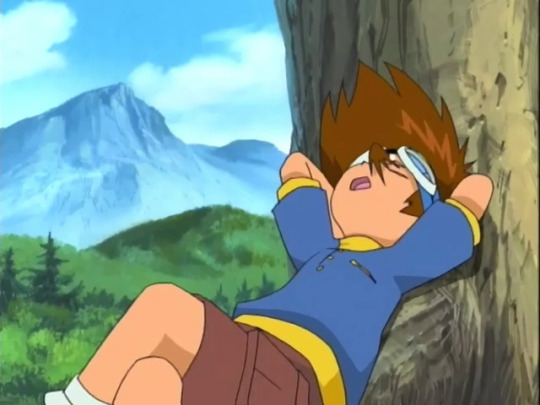
Being the face of Adventure and arguably the rest of the franchise, Taichi has the honor of being an important figure in the realm of shounen anime overall, which has the unfortunate side effect of very often being described with things that don’t actually match him at all -- the way people often talk about him (especially mainstream press) tends to portray him like a stereotypical shounen hero who charges aggressively into everything and is hot-blooded all of the time. That’s not...quite on the mark.
I think “impulsive” is certainly a correct way to describe him, but in a very different way than one might think -- and, in fact, Taichi is much more of a multifaceted character than he’s often pigeonholed as. How? Well, let’s talk about it!
Taichi in Adventure
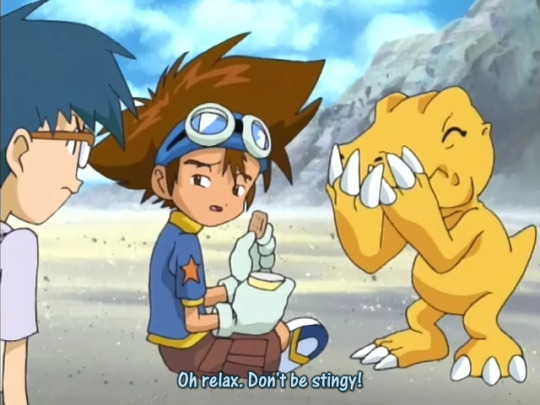
The main reason it’s probably incorrect to call Taichi “hot-blooded” by nature is that, in actuality, he is far more often too chill than otherwise. It’s not that he aggressively charges into everything without any rhyme or reason! Rather, it’s more like he takes everything very easily and has a “don’t worry about it!” attitude.
In fact, I think our friend the Animation Chronicle explains it better than I can:
If he doesn’t know/understand something, he acts while he tries to figure it out...
So in other words, rather than our conventional version of “being impulsive” meaning beelining to the most aggressive possible action, rather, it’s more like “the first thing that pops into his head” -- even if it’s a fairly easygoing or relatively harmless-seeming solution, he just goes for it because it sounds like it’ll work and he doesn’t see any reason why not.
That said, it’s also made abundantly clear by multiple sources that his ideas do come with some kind of consideration:
From the Animation Chronicle: “He appears to move with reckless abandon, but he actually does take in his surroundings and he takes good care of his juniors in the soccer club.”
From the Adventure novels: “Taichi treated everyone without discrimination, as equals. That attitude of his didn’t change, even towards Koushiro. If Taichi hadn’t invited him, Koushiro was sure that he would have never gone to summer camp.”
Sora and Koushirou even back this up personally in Adventure episode 16, when Koushirou points out that Taichi had always been kind to his juniors, and Sora recalls an incident when he’d foregone an opportunity to score a goal because he’d known Sora was more likely to pull it off successfully.
So in other words, Taichi is, fundamentally speaking, not someone who does things for personal glory, but does want to work for other people’s sake. It’s just that, in trying to carry that out, he has a tendency to default to the first thing that pops into his head. Or in other words, Taichi’s primary way of thinking is “act first and figure out the details later” -- and this has both good and bad things about it.
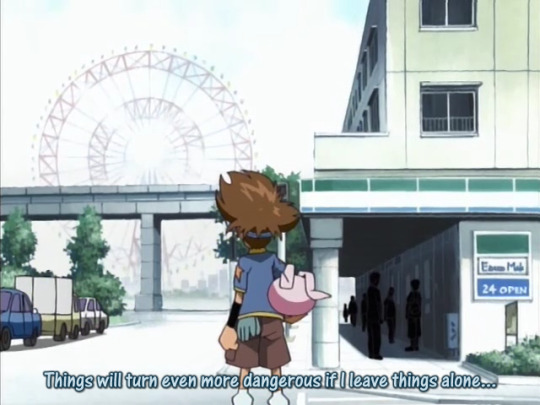
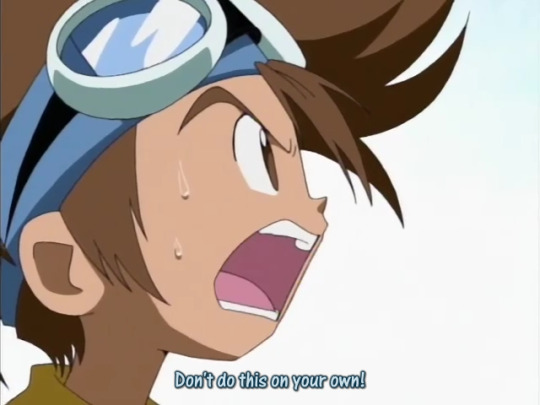
Firstly, the fact that Taichi has such an “action-first” philosophy means that he’s capable of acting very practically in situations when others would freeze up. A very good example of this is Adventure episode 21; after angsting for half an episode considering quitting the fighting and enjoying his life at home, the moment he realizes that everyone else will be in danger if he leaves everyone be, he immediately instinctively steps in to help everyone. It’s not necessarily that Taichi doesn’t feel the stress or danger of fighting; it’s just that when he sees the practical impact of people he cares about getting hurt in front of him, all bets are off, because he needs to help people now.
The second thing is that, as Koushirou points out, he’s very kind to his juniors, and people in general -- he doesn’t really pay much mind to things like seniority, and is more concerned about treating everyone in accordance to their practical capabilities. This means that he’s someone who has a certain sense of charisma, especially since he’s appreciative of people’s abilities.
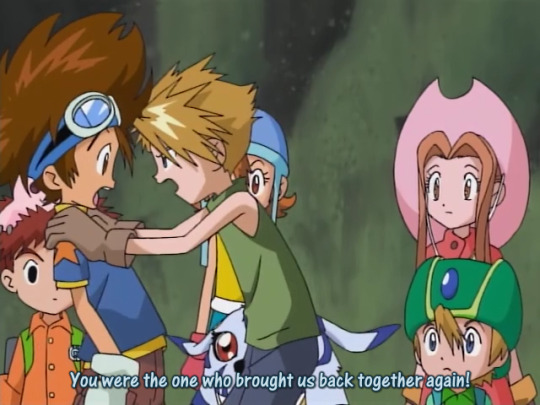
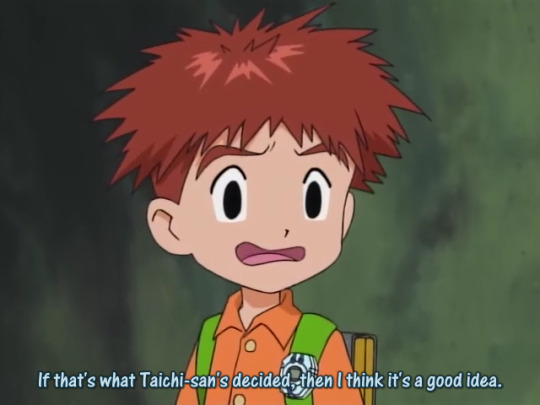
This is best indicated in Adventure episode 28, when two important things about Taichi are brought to the forefront:
Taichi’s natural charisma and ability to appeal to people makes him someone good at “bringing people together” -- indicated by the fact that the group hadn’t taken long to completely fall apart after he’d momentarily departed in Adventure episode 20, but came back together after he’d rallied them. The Adventure kids, coming from rather different social circles and backgrounds, were not originally the type to stay together or be particularly tight with each other by default, and so, during the first half of the series when they still had ways to go in terms of having any kind of meaningful bond with each other, they were unconsciously dependent on the charismatic Taichi to keep them together.
Taichi is a “natural leader” in every sense -- “leader” meaning not only someone who pushes people forward, but also someone who recognizes others’ abilities and is willing to delegate rather than trying to do everything by himself. This was briefly demonstrated in Sora’s Adventure episode 16 flashback when she remembers that Taichi willingly gave up the opportunity for a goal when he understood she could do it better (it’s reflected in his soccer position, too), but also here in Adventure episode 28, he gives the task of solving the card puzzle to Koushirou because he (correctly) determines that Koushirou, not himself, is best equipped to do the job. Also note that the episode makes clear that everyone agrees to it specifically because Taichi appointed him to the position -- much like how “understanding everyone’s abilities and delegating properly” is an important and necessary skill for a leader, everyone trusts Taichi to make that decision, and therefore trusts in Koushirou because he was appointed by said well-informed decision.
So those are the good things about him. What about the drawbacks?
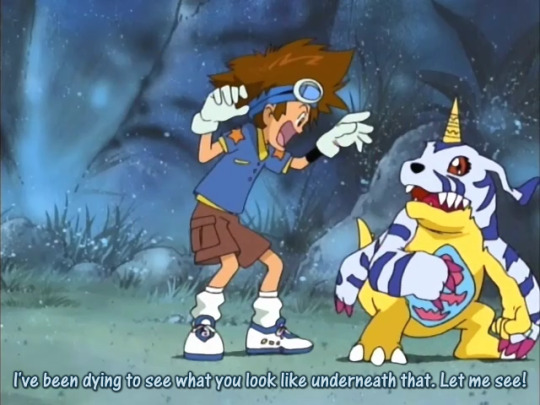
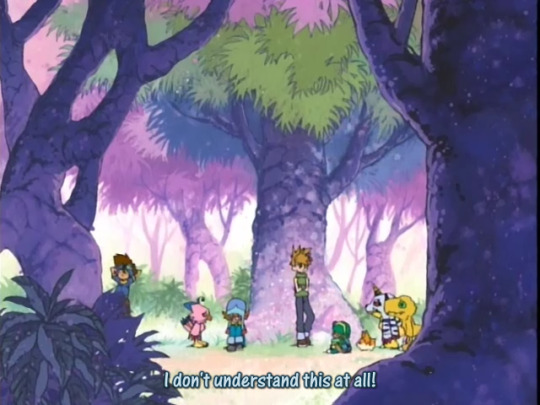
The first is that Taichi is, unfortunately, a little emotionally insensitive. He doesn’t mean badly, of course -- you can’t deny that his penchant for teasing or trolling people makes him quite a fun person to be around -- but he tends to lack a bit of emotional insight and is prone to crossing the line with his remarks. Again, this is a symptom of him being too chill about things at times; he tends to react with “what’s the big deal?!” -- a statement that one should absolutely not say when arguing with someone, and which tends to get Taichi in hot water, especially with Yamato.
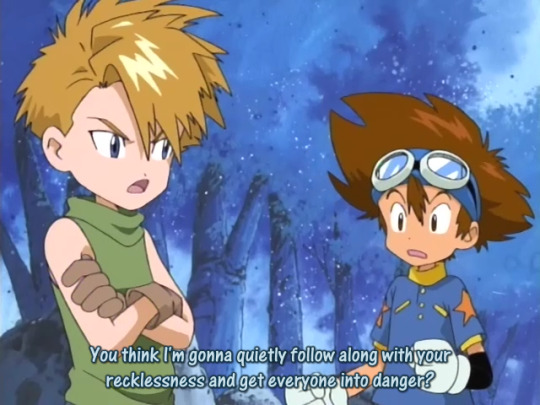

While the trope of “the shounen hero and the cool rival often having friction” is quite common in anime like this, Adventure’s play on it is actually quite different from how it would usually be played elsewhere. In most other shounen anime, this kind of relationship would have to do with something like the hot-blooded protagonist wanting to charge in and the cool-headed person wanting to be more “rational” about it, but in Adventure, Taichi and Yamato are pit against each other due to reasons that have to do with emotions. Yamato, contrary to what his character archetype might suggest, is someone who’s openly passionate and emotional, and is also someone who goes out of his way to care about others and their welfare -- so he often gets into fights with Taichi because he perceives Taichi to be insensitive and not putting sufficient thought into the others.
Yamato’s reactions are certainly extreme -- Adventure episodes 9 very clearly depicts him as the one losing control of his emotions and escalating the argument with Taichi to a full-on fight, whereas Taichi wanted him to calm down -- but he’s not fundamentally wrong in that this is an aspect Taichi needs to improve about, because it is true that Taichi tends to take the first suggestion of “what’ll get something done” that pops into his head, but also has a problem of vastly underestimating how dangerous things might be.
Again -- and this is very important to stress -- it’s not that he doesn’t care about others, and it’s not that he’s unaware of the dangers around him or the potential for repercussions! As Sora says in Adventure episode 16, he is conscientious of his surroundings and aware of potential risks. He has always put thought into his actions, and he doesn’t just charge into things with no rhyme or reason. He just has an abysmally poor sense of judgment, because he’s so naturally chill that he thinks “it’ll be fine, don’t worry!” -- and thus starts stubbornly locking down on what he wants to do because he’s so sure it’ll be fine and that everyone (usually Yamato) is overreacting.
If you want a specific example about Taichi’s tendency to misjudge: in Adventure episode 9, Taichi and Yamato get in a fight when Yamato perceives Taichi as too insensitive about Takeru’s potential welfare, which weirds Taichi out because Yamato’s being awfully overprotective. On its face, it might seem hypocritical because we later find out in Adventure episode 48 that Taichi is just as overprotective of his own sister, but it’s important to note that in the relevant episode, Taichi states that he has to go out of his way because Hikari continually fails to vocalize whenever she’s hurt or in pain. This implies that Taichi sees Takeru as someone who’s clearly capable of taking care of himself because he expresses himself better (and thus, Taichi doesn’t understand why Yamato has to go out of his way for him). Indeed, Takeru ends up latching onto Taichi because he sees him as treating him with the independence that Yamato won’t -- but Takeru has his own very deep-seated emotional issues that he just happens to be very good at hiding, and while Taichi is certainly always looking out for Takeru, he never seemed to have become aware of this problem.
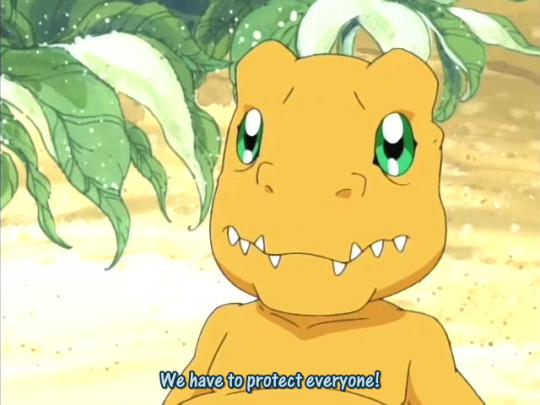
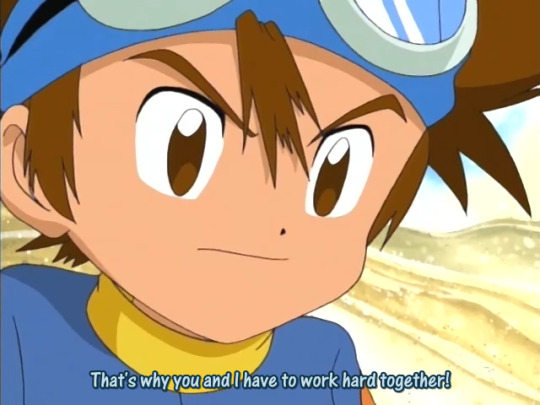
This difficulty in judgment leads into a certain pattern of behavior that Taichi exhibits that only comes up in very specific situations, but is so consistently depicted that it’s basically an inherent trait of his: what I call the “Yagami Taichi stress response”.
Taichi is the kind of selfless person who prioritizes others’ welfare over himself, and there are times when it will often fall into almost self-destructive levels. (This is a trait he actually shares with his sister, although the two of them naturally deal with it in very different ways.) His first priority is “helping everyone”, and especially “helping anyone who’s in trouble” (especially when it’s happening right in front of him). Which means that whenever he feels that others are depending on him for something, he ends up often taking too much responsibility for everyone’s welfare, and starts cracking under the pressure.
Because Taichi is the kind of person who prioritizes “action first” and figuring things out as they go along, this means that his reaction to stress is basically becoming a completely unfocused mess. Or, in other words, he lets the thought of but we have to do something!! completely consume his head, methodology be damned, and he starts panicking and doing everything in every which way to get it done, to the point he starts lashing out at others or becoming an emotional wreck because of the stress. The first time we see this is Adventure episode 16, where, being the only one with a working Crest and feeling that he and Agumon have the responsibility of protecting everyone, starts pushing himself and Agumon to carry everyone’s burdens, resulting in everything going wrong and the dark evolution to SkullGreymon at the end of the episode.
Again: It’s important to remember that, even at his “worst”, Taichi’s main priority is helping and protecting others, which means that his way of responding to that stress is basically determining that he’ll take all of the responsibility onto himself. That involves things like forcing himself to “work harder for everyone’s sake”, or becoming dangerously self-sacrificial, or at least allowing himself to become an emotional wreck because as much as he knows better, his one strongest thought is always we have to do something!!
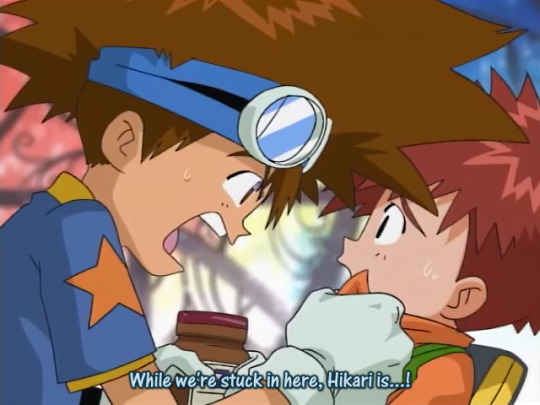
Taichi exhibits more of this behavior in Adventure episodes 48 and 49, to the point he gets unusually aggressive with Koushirou (which is also explicitly pointed out as him not acting like his usual self) once he starts panicking about Hikari’s welfare. Again, note that all of this stems from we have to do something!! -- he basically starts panicking because despite Koushirou clearly doing the best he can, once things start going south, it’s just not enough.
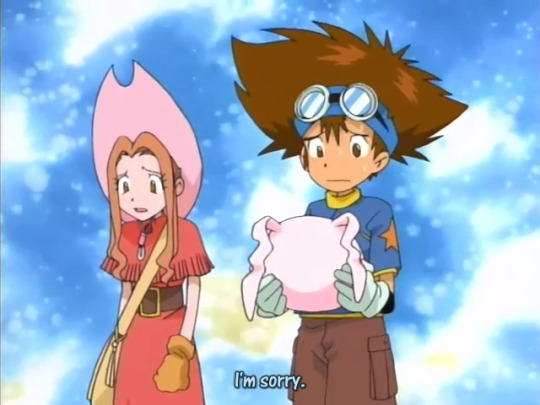
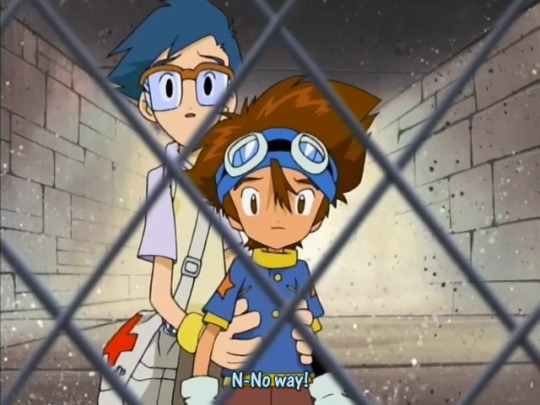
So, speaking of things going south: because Taichi often misjudges situations, whenever things go wrong, he takes it badly. This is someone whose first course of action is to “act first and work it out as we go along,” but the number one thing he can’t stand is seeing other people get hurt, and so when other people do get hurt because of the consequences, Taichi shuts down -- for instance, when he learns that his ploy to attempt to get Greymon to evolve ended up hurting Koromon and everyone around him in Adventure episodes 16-17, and when his taking the Digital World too lightly (taking Koushirou’s explanation of it being “like a game world” at too much face value) ends up getting Sora in trouble and his own life in danger.
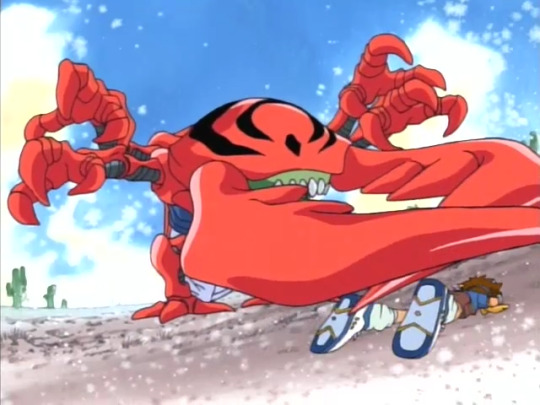
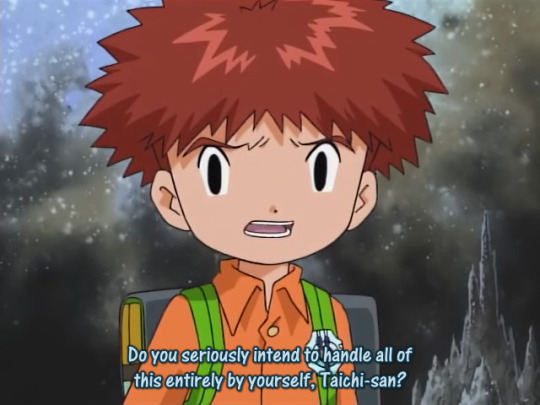
Which leads to a certain degree of irony: Taichi’s behavior isn’t normally out of solely recklessness -- mainly really poor judgment and a tendency to underestimate things -- but when he does slip up and start having to deal with consequences, he does become reckless. But because this recklessness is out of a desire to “not let anyone else get hurt”, it results in him being reckless specifically with his own welfare -- he’s the kind of person who “takes too much responsibility onto himself”, and his way of responding to the issues of “someone might get hurt” and “but we have to do something!!” means that he, by default, responds to everything with “okay, then I’ll be the one who gets hurt!” Or in other words, his solution to preventing other casualties while still doing something to help others involves becoming dangerously self-sacrificial. Because in the end, Taichi is the kind of person who hates seeing people being in trouble or hurt in front of him, and his instinct is to always protect people, no matter what.
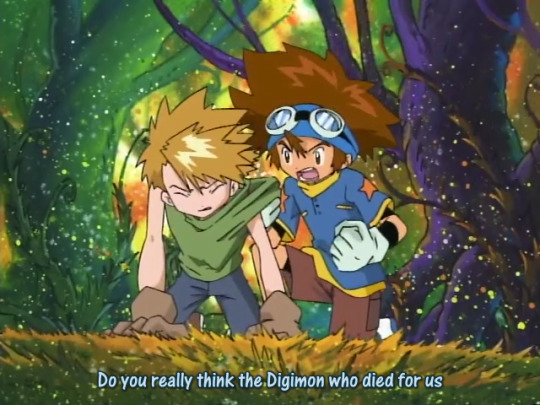
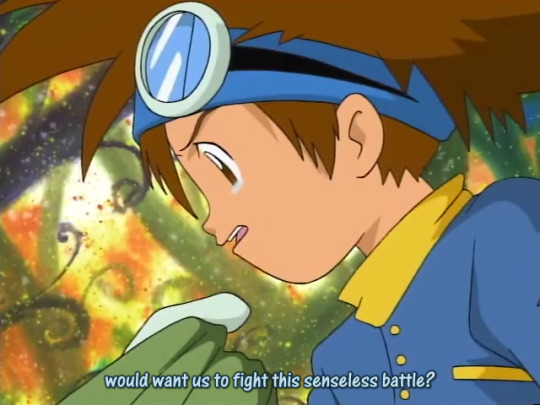
But, again: Taichi’s way of “action first” is not a fundamentally bad thing -- remember, Adventure episode 21 established very well that this trait of his is very good for bringing him out of his biggest bouts of hesitation, because he has a very practical understanding of the need to fight in order to prevent more casualties. This is especially because the final arc of Adventure deals heavily with the concept of “collateral damage”, or the question of how to handle fighting to save people, when people are inevitably hurt (or, in this case, dying) in the process.
Yamato accuses Taichi in Adventure episode 43 of not being conscientious enough about the friends they’ve lost in the process, but once Yamato succumbs to his resentment and personal beefs and starts selfishly picking a fight with Taichi in Adventure episode 44-45, Taichi indicates that he is keeping his fallen friends in mind -- it’s just that, to him, not continuing the fight is an insult to everything they’d died for (especially because, indeed, more people will get hurt if they don’t do something).
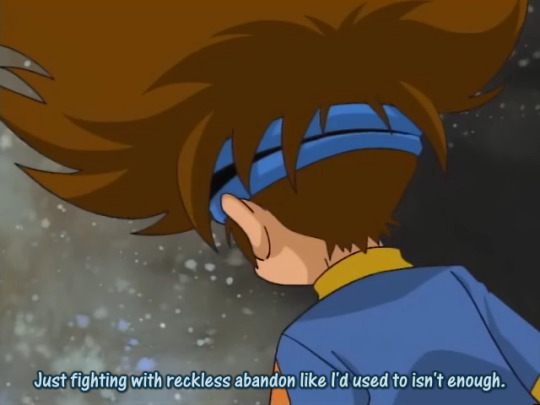
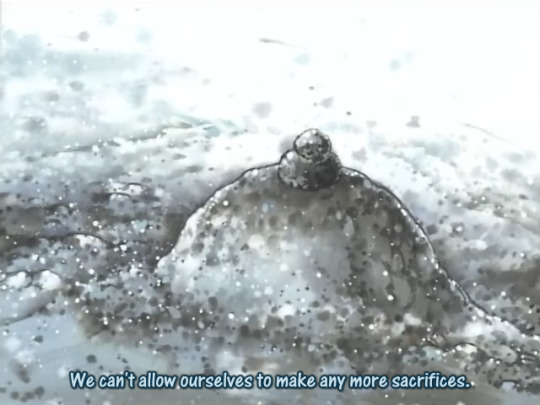
And, ultimately, in Adventure episode 50, Taichi does conclude that Yamato, Jou, and Mimi are right about one thing: while he’s always been right about them needing to do something, they do at least need to be careful about how they go about it so that they don’t incur more sacrifices along the way. Fortunately, Taichi is a soccer captain and perfectly capable of quickly coming up with a suitable plan on the fly (he even cites it in this episode, and in fact had already demonstrated an ability to come up with tactics when necessary back in Adventure episode 20) -- it’s not that he’s never been able to do flexible thinking, it’s just that his natural tendency to be “too chill’ about things and overestimate the efficacy of the first thing that popped into his head was something he needed to learn to think through a little harder.
And so, the final episodes of Adventure indicate him finally starting to tap into his capacity for that -- thus truly becoming the definition of the Adventure group’s “leader”.
Taichi after Adventure
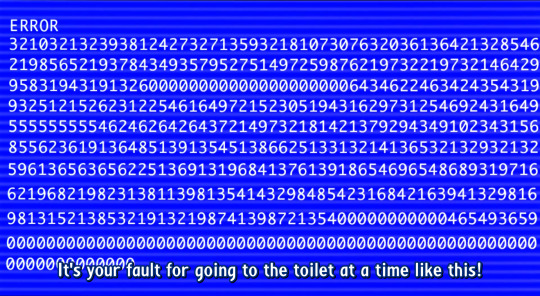
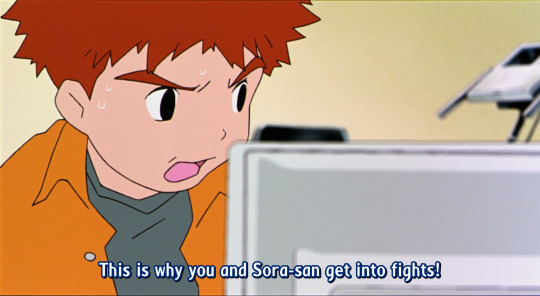
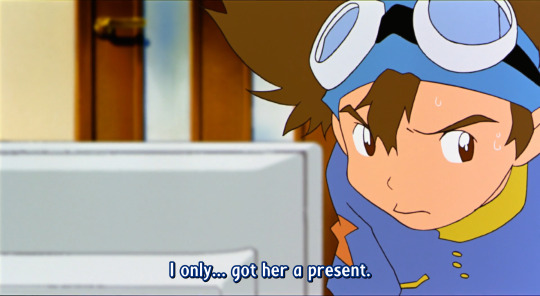
We learn in Our War Game! that Taichi still has a bit of a way to go in terms of the “emotional sensitivity” part, most notably when Taichi starts getting defensive when he accidentally disrupts the computer connection, and Koushirou (most likely correctly) pinpoints this insensitivity as the likely reason he and Sora got into a nasty fight prior to the events of the movie. In fact, while Taichi already clearly had some shades of this in Adventure, when his “teasing” of others or stepping over their boundaries could sometimes go a little too far, it’s especially indicated here that Taichi is very, very bad at dispute resolution, because he keeps trying to deflect blame for his own actions and indirectly accuses Sora of being the irrational one in regards to their argument. (Again, for anyone entangled in a dispute with a friend: “dismissing the other person’s feelings” and going for the ad hominem, instead of at the very least acknowledging them in the process of making your point, is the number one worst way to handle this.)
Of course, Taichi wouldn’t have gotten this far if he didn’t have the natural charisma to compensate -- again, he’s fundamentally someone who cares about other people and attends to them. But, unfortunately, he’s still bad at knowing how to deal with other people’s emotions and learning to deal with them with proper empathy...
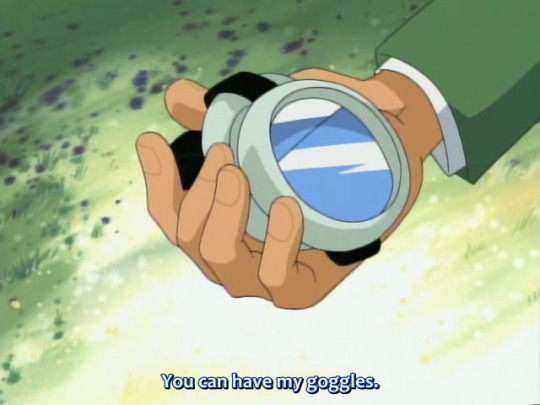
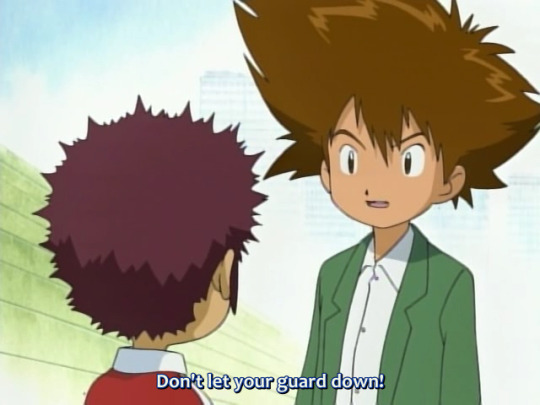
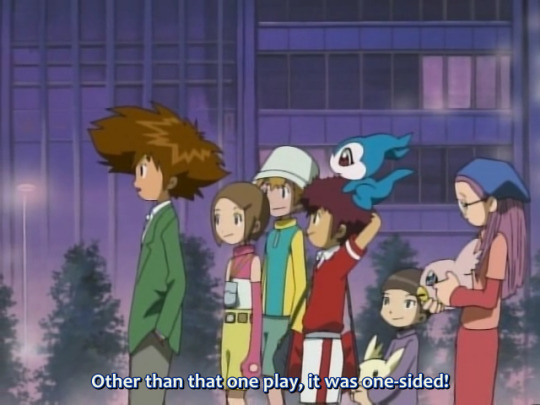
...So, in fact, it’s striking that the Taichi we initially meet in 02 is someone who, most of the time, seems to come off as very mature and put-together. The fact that he so willingly turned over his goggles to Daisuke at the beginning of the episode is a really huge deal, frankly -- even if you don’t subscribe to the theory that there’s any major sentimental backstory to it a la V-Tamer, that’s still an item he’s kept on him since he was a tiny child and clearly must have a huge amount of attachment to, yet he immediately handed it over to Daisuke the moment he felt Daisuke was worthy of it.
It’s actually quite a bit of a swerve for those of us used to the more “playful” Taichi who sometimes took things way too lightly, but it’s also important to realize that this is the Taichi that Daisuke and his friends see. This is especially in light of the fact that Daisuke starts off the series with a very severe inability to be assertive, so Taichi, who’s always been naturally assertive from the get-go (almost too much sometimes), is everything he is not, and therefore admires.

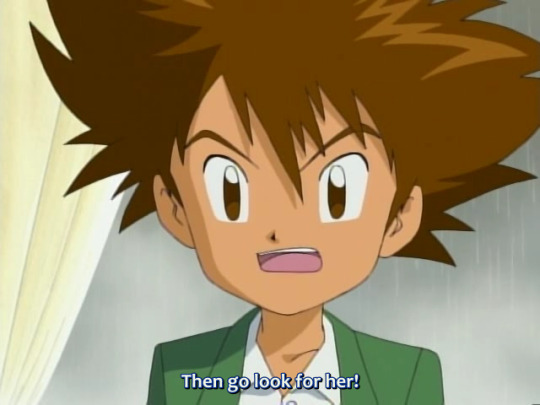
Taichi is still Taichi, which means that he’s still subject to the Yagami Taichi stress response, and he gets very close to blowing up angrily at the others when they show up late. But unlike how he had a whole train of being rather out of control when emotionally compromised in Adventure episodes 48-49, he gets himself together fairly quickly and admits that he also didn’t want to force everyone to come if they didn’t want to (to the point where he had even thought about going alone with Hikari in the worst-case scenario -- again, note the tendency for self-sacrifice and putting responsibility on himself).
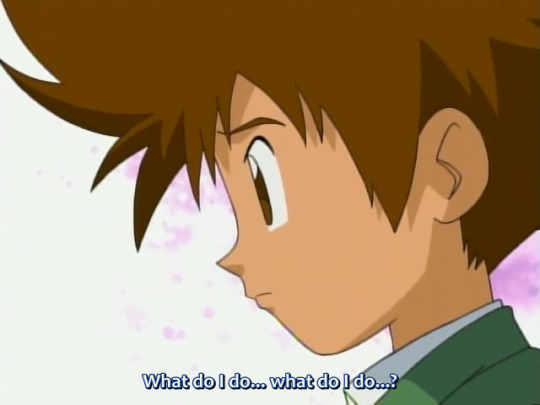
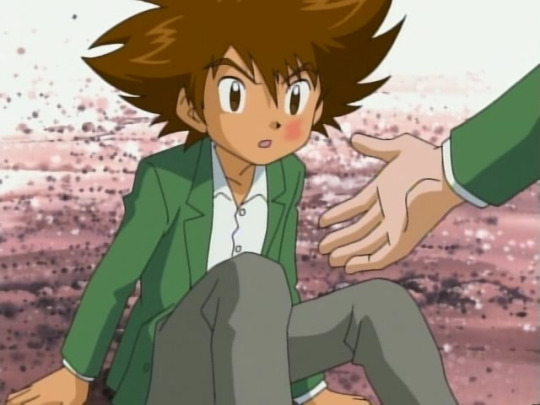

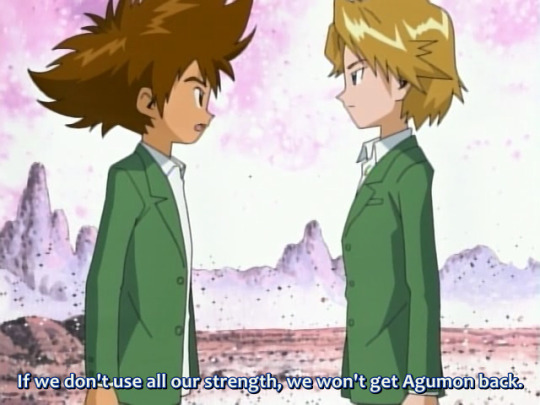
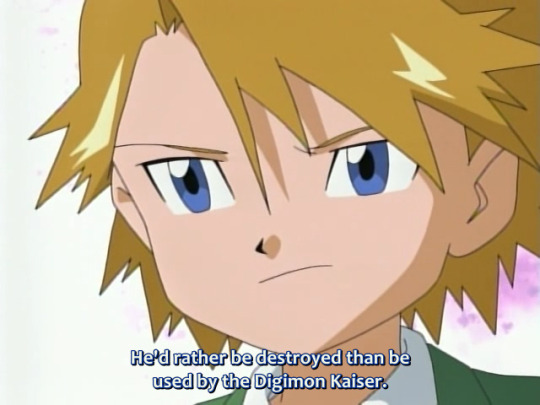
We also see him about to lapse into it again at the end of the episode, when he freezes up because he’s not sure about what to do in regards to the potential of hurting Agumon in the process of getting him back -- but Yamato manages to get him back on his feet, rather literally, and with a punch to the face.
This punch tends to be really often misinterpreted as if violence is just a fact of life when it comes to Taichi and Yamato, but it is very, very important to understand the context behind this scene and how it differs from the two’s relationship in Adventure. Whenever the two fought back in Adventure, it would be a very vicious argument with the two genuinely angry at each other, and with Yamato accusing Taichi of being insensitive and thus becoming hostile and resentful towards him. In this scene, however, Yamato has become conscientious of Taichi’s own feelings and reasons for hesitating. This is evidenced by the fact he only does a single punch and holds out his hand to Taichi right after -- said punch was strictly meant as one meant to snap him back to reality, and Yamato holds out that hand knowing that Taichi will not take it as anger or resentment, but rather “I did this because you needed something to get you back into focus, I know you also know this and won’t take it as an insult, and I understand your feelings and want to help you.”
It’s important in establishing the level of deep trust Taichi and Yamato have where they understand each other’s positions now without fighting over it -- the two of them even point out in the next episode that the reason they can get away with this is because of how much worse they used to go through before, but now, the two of them treat each other with mutual sympathy, understanding, and support, and devoid of condescension whatsoever. And because of that, Taichi is able to “snap out” of his hesitation much more quickly than he would three years prior, because now he has Yamato’s emotional support, and Yamato even frames the situation in a way the “we have to do something!!” Taichi would understand: if they don’t do something, Agumon will continue to be the Kaiser’s slave destroying everything that he himself would never want to see destroyed, and even if they end up accidentally losing him in the process, it would arguably be a bigger mercy to him than it would to let him continue in this state. It’s all very practical reasoning that works best with Taichi’s way of thinking, and because of that, they’re able to push forward into the events of the next episode.
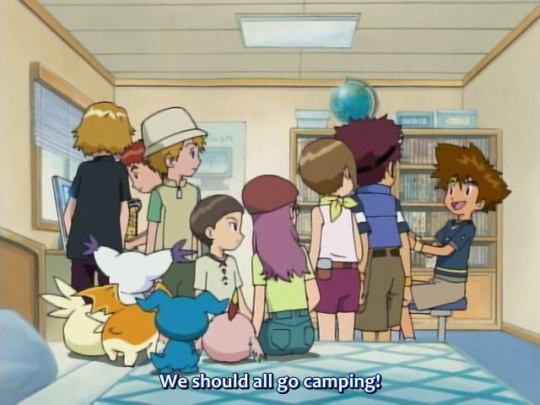
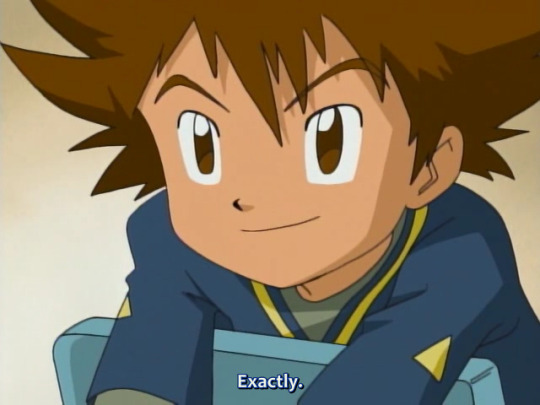
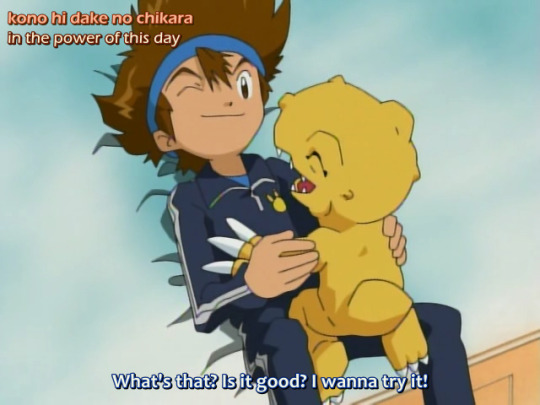
But just because he’s become more mature doesn’t mean he’s lost his characteristic charisma or ability to be playful or a tease -- after all, Taichi has always had a penchant for a bit of a smug personality, sometimes even bordering on the petulant. This especially comes out when he’s with Agumon, but, really, Taichi is a person who really likes fun.
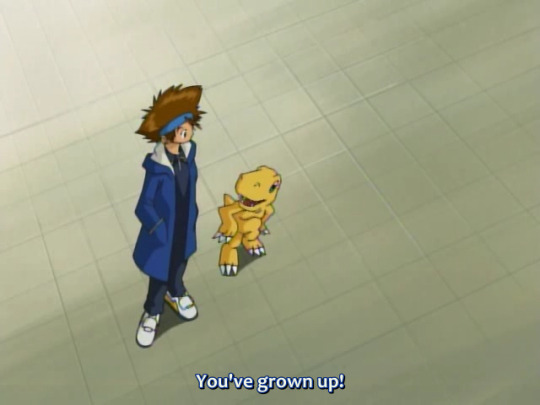
On another interesting note, however, Taichi sends Sora off in 02 episode 38 when he’s very heavily implied to have caught on that Sora is about to confess to Yamato, and pushes her on without giving her grief for it. Regardless of whether you subscribe to the theory that Taichi has his own unresolved feelings in the situation, the important part is that he understood that this was a grave enough situation for Sora that this did not merit teasing her or insensitively poking into her feelings on it -- in other words, it’s a huge contrast to Adventure episode 26 when he was clearly at a loss on how to deal with her when she was emotionally compromised, and Agumon and Gabumon commented that he wasn’t as mature as Yamato in dealing with this.
But now, Taichi is much more capable of showing actual empathy for others and understanding when it’s the time to hold back on the teasing or potential insensitivity, and for that, Agumon compliments him on the same maturity he’d failed to express three years prior.
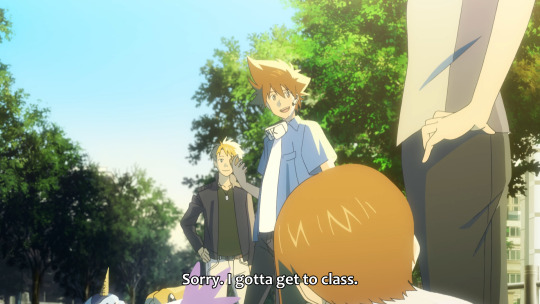
By the time we get to Kizuna, the fact that Taichi is one of the lead protagonists is for obvious meta reasons (he’s the protagonist of Adventure, after all), but it also makes sense that a movie centered around the millennial existential crisis -- and, specifically, the issue of career uncertainty -- would have him as a major player in it. Remembering that Taichi is fundamentally the kind of person who operates as “act first, deal with it later,” it makes perfect sense that the terrifying pressure of dealing with something as vague and uncertain as career pressure would be something that Taichi would continually put off. Again, Taichi is a very practical-minded person who usually works best with things that are clearly happening in front of him, so “wide-ranging” things are things he plays badly with.
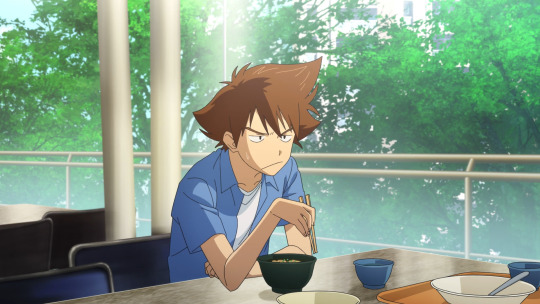
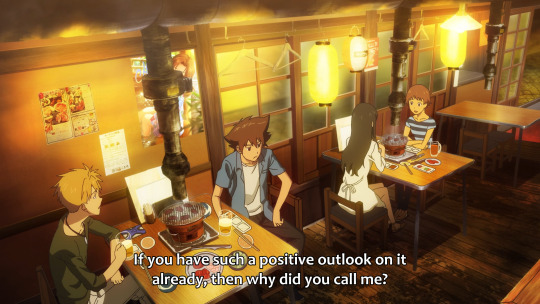

Despite Taichi being very clearly depicted as “out of it” for this movie, at the very least, certain fundamental personality traits of his haven’t gone away -- for one, he’s still one of the most expressive characters in the movie (to the point many a fan has commented on his jackpot of facial expressions) in terms of petulance, sometimes getting a little defensive, and driving poor Koushirou a little nuts with his tendency to be reckless with electronics. He also gets a bit cocky during the battle with Eosmon, which, again, tracks with his tendency to do that every so often (and to be fair to him, everyone was guilty of severely underestimating Eosmon at the time, so it’s not like this was a major miscalculation on Taichi’s part).
Moreover, much like in 02, Taichi and Yamato are understanding of each other’s feelings to the extent that Yamato is the first person Taichi calls to dump his feelings about his existential crisis over. Even though they’re still prone to some mild bickering at the beginning of the movie, they immediately go back on high-fiving terms right after, so it’s a very far cry from the time back in Adventure when Yamato would look down on Taichi for being insensitive.
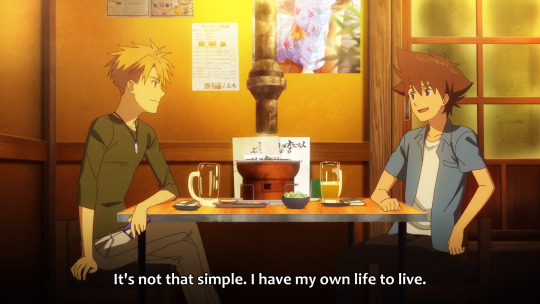
But here, we have this one line that basically represents the source of all of the problems Taichi ends up going through in this movie, including the reason for his loss of Agumon: Taichi is trying to “force” himself to become an independent person, and in the process is pushing Agumon away, and, on a more metaphorical level, his own self.
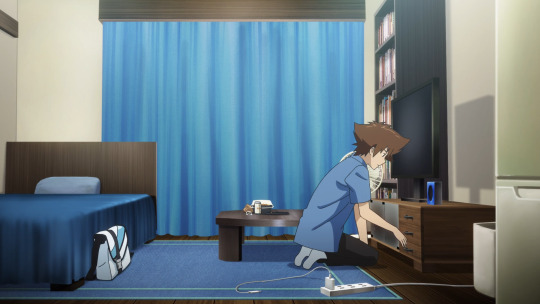
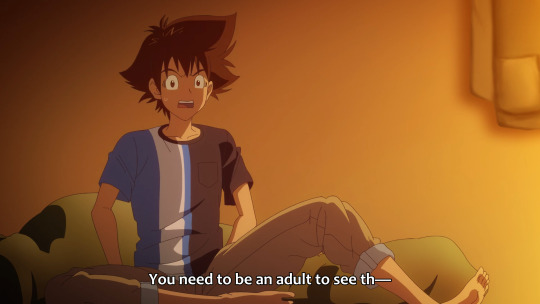
Taichi moved out of his parents’ house under the pretense of not burdening his family, but Hikari’s comment about their mother wanting him to drop by indicates that it’s not likely they necessarily wanted him to move out -- and despite that, Taichi is miserable in his daily routine of walking back and forth from school and working at a part-time job and eating convenience store food. He’s clearly lonely, yet he won’t allow Agumon into his room (it’s stated that his visit midway into the movie is his first time here). He keeps his old goggles and Digivice, yet he shuts it in a drawer and only opens the drawer to stare at it from time to time, and when Agumon finally does visit and finds his AVs, Taichi freaks out and pins it as an “adult thing” before he finds himself in the awkward situation of basically gatekeeping his own partner with a societal standard he doesn’t even understand.
I should point out that the AVs are not strictly porn, if you want to be really technical about it; it’s “gravure” videos, involving a cosplayer dressing up in sexy/high-exposure outfits and striking suggestive poses, but it��s not actually explicit porn. Moreover, a toned-down version of this scene exists in the Shueisha Mirai version of the novel, where the issue is not about AVs but rather the fact that Taichi only has alcohol in his fridge -- absolutely nothing non-alcoholic, despite how impractical this is -- because “[he’s] an adult, after all.” So the point of this scene is that Taichi’s being performative, or in other words trying to do Adult Things because That’s What Adults Do. And since a Digimon partner is representative of the inner self, and especially established in 02 to have relevance to one’s “less dignified and more childish dreams”, Taichi looking down on Agumon, i.e. looking down on himself, becomes the reason why he ends up losing him at the end of this movie.
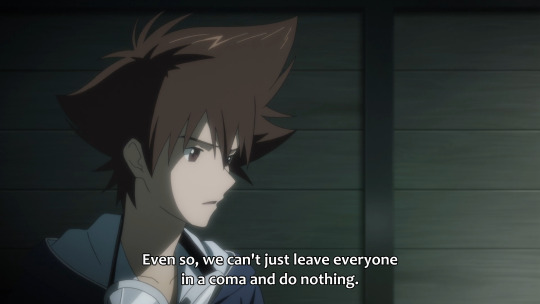
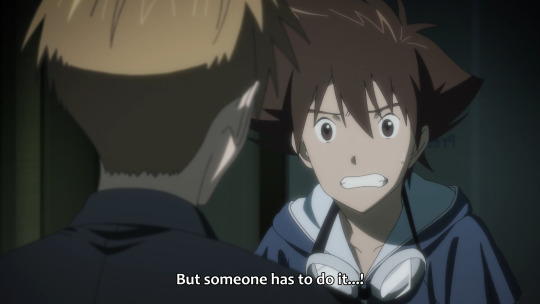
As things get worse for Taichi and the crisis escalates, we actually get another glimpse of the Yagami Taichi stress response -- Yamato confronts him on whether he’s okay with going in to save all of the Eosmon victims despite knowing what’ll happen to their partners. Taichi, frantically (Hanae Natsuki’s voice acting really sells it here), has an emotional outburst and professes that, no, of course he’s not, but, again: they have to do something!! Because in the end, Taichi is a selfless person who understands that bad things are happening to people now, and the important thing is saving them now and dealing with the consequences once that’s done with, and even Yamato admits that, as much as he hates it, this is the correct answer.

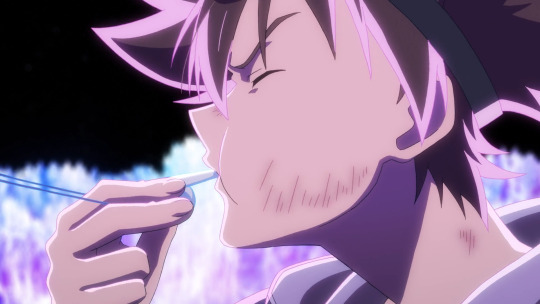
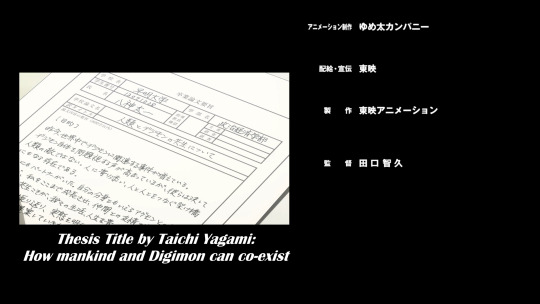
Taichi does, unfortunately, lose Agumon at the end of the movie, but there are multiple indications he’s already on his way to getting him back, given that Taichi’s starting to address all of the problems he was neck deep in at the start of the movie. In the middle of the movie, after having shut his goggles in the drawer all of this time and only pulling it out whenever he was depressed, he decides to embrace the courage they initially symbolized and puts them back on his neck, and when we reach the climax of the movie, he uses Hikari’s old whistle to wake everyone up. This needs to be distinguished from all of the “nostalgia” everyone else had been drowning themselves in by looping themselves eternally in old memories from a desire to never move on from them; symbolically speaking, Taichi’s blowing of the whistle represents acknowledging the important things in your past, and making productive use of them to move onto the future, rather than the unhealthy reactions of either drowning eternally in nostalgia, or performatively shutting everything out about your past in a bid to reach some arbitrary standard of adulthood.
Hence, Taichi’s thesis -- the one he had failed to write at the beginning of the movie -- is only filled out once Taichi embraces that past version of himself, because his thesis summary is about reflection on his past experiences, and making use of those to think about how to apply them to the future.
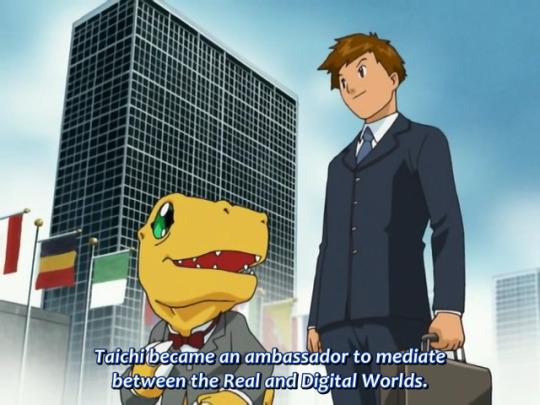
This is, obviously, intended as a lead-up to the 02 epilogue in which Taichi becomes an ambassador -- or in other words, someone who indeed specializes in “bringing humans and Digimon together” and offering proposals on how they can coexist in the future. Agumon, of course, is an important part of this job (look at his suit and bowtie!), instead of Taichi shutting him out and treating him like someone who doesn’t belong in his adult life.
Of the careers depicted in the epilogue, Taichi’s is the most “furthest-reaching”, since, as a diplomat, he has influence over a pretty huge range of things, which fits with Taichi’s tendency to shoot for some pretty high things -- and, also, conceptually, it works well with what we’ve always known since Adventure to be Taichi’s true specialties as a “leader”: having the charisma and understanding to bring people from different places together, and to lead them all forward.
#digimon#digimon adventure#digimon adventure 02#digimon adventure last evolution kizuna#kizuna spoilers#yagami taichi#taichi yagami#shihameta
194 notes
·
View notes
Note
why do you not like jane the virgin season5?
Ah JTV season 5... where does one begin with JTV season 5? The utter disaster. The NERVE to call that flaming mess their best season in promotions. The insanity of thinking this the best that show has offered us when it was their worsT season.
Let’s break this down, shall we?
1. Michael’s return: I was against the idea of them bringing back Michael from the very start. One of the reasons for that was that I didn’t like the implication that the only way to validate Jafael would be by her choosing Raf over Michael in a parallel situation, ‘cause guess what, that’s a crappy message. And makes it seem like whatever relationship one enters into after the tragic loss of a partner is lesser because they didn’t choose that new relationship over the old one, which is not at all something that you want to send to any audience. But my main reason was that I didn’t think they could pull it off. And guess what? I was right. His amnesia happening and I was like okay, but what the fork are you gonna make Jane insist he remembers her only to be like but lol I love Raf so bye. And then she does exactly that but not once does she or anyone else question the rightness of such actions? Everyone is so blase about it? And speaking of memory loss, memories are such a weighty SL to take on and rarely do shows get it right. So I wasn’t expecting JtV to get it right, really. But they still royally forked it up. Because Michael with no memories = Michael is a dick and I’m like???????????? Why???? One’s personality is vastly complex???? It doesn’t hinge on specific memories and experiences only? And even in the absence of the ability to recall specific things you still can have a visceral reaction to things through simple cognition and internalization of certain habitual patterns which has nothing to do with memories?
But, okay, fine, he’s back. He has no memories. He’s kind of a jerk. Fine. Okay. But then he gets his memories back and it has absolutely no bearing on anyone who is not Jane? Rogelio loved him? He was a part of the family for over 3 years? HELLO? Does no one else care about the implications of this beyond the godawful (at this point) love triangle? Where are the emotional stakes? The drama? The fact that they lost but didn’t lose this person and now he’s back and he fits back in but also doesn’t fit in all the worst places and it hurts and no one knows what to do with it? Who the fork care about the love triangle, this person was family and he DIED and then got back and then lost his memories and now he has them back oh my god stop just standing there. DO SOMETHING.
But okay, fine. He’s back. He has no memories. He’s kind of a jerk. He got his memories back and no one cares about it meaning anything except about the triangle. Okay, fine, I’ll roll with it. Now give us some juicy delicious drama for the triangle. But they don’t? Michael doesn’t at all react to her being with Rafael. He doesn’t lose his sh*t in any way about the trauma that he had to go through. He doesn’t have feelings of anger or resentment that he lost years of his life and now he’s back only to find that the love of his life has moved on. And no one is saying that he’d be right in those emotions, but he’s a person, yes? And sometimes you feel things that aren’t right or aren’t fair because that what emotions are like and that’s where all the drama is and I’m just absolutely bAFFELD? that?? they?? missed????? such??? obviously??? ripe?? material??? for?? heartbreak???? that would have made even the most die hard Jafael shippers cry????? How?????? AM I SUPPOSED TO TELL THEM HOW TO DO THEIR JOB?? Do I have to do everything myself to get it right? Not once does Michael react in any recognizably human, non-angelic way. He acts not like a person but a cardboard cut of a man who can do nothing but tout “I just want you to be happy” and it’s like????????????????? why??????????? bring????????????????????? this?????????????? storyline????????? if you will not take full advantage of one of its most obvious emotional stakes???? whyyyyyyyyyyyyyyyy?
2. Rafael: Micheal’s return inevitably leads us to the utter garbage that was Rafael’s characterization in this season. Fork me did we get forked seven different ways with how this was handled. First and foremost, Jennie Urman kept saying that it was a huge sacrifice of Raf to bring Michael back to Jane’s life and basically, this is the act, this is the incredible sacrifice that we are supposed to hold as the criteria for everything romantic and that’ll lead us to believe that Raf is the one and I’m like????? dude??? that was basic decency? I know it must have been painful but like..... he absolutely had to tell her he had absolutely no choice???? But no, GREAT SACRIFICE. Said as such so must be taken as such.
But okay, fine, whatever. Great sacrifice. But then what? Then he gets insecure. Which makes sense considering the whole situation about Michael before. But it’s brought up in a way that just makes him.... how do I put this nicely? Makes him a dick, tbf. And I’m like Jennie wants me to root for you but you’re crying about your pain and about wanting to be engaged to the woman whose world just turned upside down and I’m like????????????? Hello?????? Can you calm tf down for twO seconds and let her figure out her way??????????
But okay, fine, whatever. Great sacrifice. Then he’s a dick. It’s fine it makes sense that he’s so insecure. The ghost of the past has crept back up and he’s so damn afraid to lose everything that he ever wanted when he was so close to having it all. And people aren’t perfect and they don’t always react in a perfect way and that’s fine. AND this is a great opportunity to explore his insecurity! And finally put him through therapy! And finally have him move on past his self destructive behavior! So they kind of do that but in the most laughable way possible. So the moment that he breaks up with Jane could have actually been a great character development moment. And it is. Kind of. It’s a moment where he acknowledges that, unlike the first time where he went as far as to try and sabotage Michael’s career to take him out of the competition and win Jane over, this time around he’s not willing to live through that charade. He’s putting his own self preservation and making it easy for Jane by taking himself out of the equation altogether. So, he breaks up with her and we seem to be on the right track, barring the whole Mateo walking in on them situation (we will get to Mateo in a second). Sure, he has that momentary relapse in the following episode where he wants her back but it’s quickly done and he starts to take anti-depressants., And I’m like YES finally, getting to the good stuff! But then... THE WHOLE STORYLINE HAPPENS OFF-SCREEN. Do you know how ENRAGING it is that something so essential to Rafael’s arc in the last season happens completely off-screen? Not once do we see him go through therapy. Not once do we see his perspective. NOT ONCE. Not to mention it happens off-screen in the span of one episode which is like 2 days at most and I’m like????????? (ALSO, an aside to writers: As a person who suffers from depression, the healing is not in the medication, the healing is in the therapy sessions. The medication is important to curb your symptoms and lift up your mood and help your brain cope with the chemical nightmare happening there. But it doesn’t address the root cause that’s made you depressed. THAT happens in the sessions. So you can’t simply throw pills at the issue. That’s only a half solution)
But OKAY, FINE. Great sacrifice. Then he’s a dick, but it sort of kind of makes sense. And then he breaks up with her our of self preservation, and then depression that happens off-screen. But then... but then NONE of his past behavior is acknowledges or talked through. Jane doesn’t confront him about it. And then, when that conversation does come up when they decide to get married in city hall, it’s half baked and doesn’t really delve into root issues.
(I could talk about Rafael’s career, too, but I Do Not Have the Strength)
3. Jafael: Which brings me to Jafael *screams into a pillow*. So like, they’re happy by the end of season 4, and it looks like they’ll make it. And they’re about to get engaged and all. And then Michael comes back to throw a wrench in the plans. Because as Jennie Urman would have us believe, conflict and choosing each other can only happen in the context of a triangle. Heaven forbid that we come up with new storylines. ANYWAY. So all of the problems of early season are discussed in Raf’s section. But then, okay, Jane chooses Raf, she tells him that he’s the one for her and leaves Michael behind. And he’s like lol, nope, I don’t trust you no more. Which, okay, makes sense. If he’s so insecure and has been spiraling, it makes sense that he wouldn’t want to be with her right now. So I go like, yeah, okay, fair. And you guys need to figure your stuff out before you can get back into this relationship. Jane understands that she needs to win him over again and that doesn’t work and I’m like, yeah, that’s not the problem. Let’s talk about the real problem. But then they don’t? We, once again, do not get to see Rafael’s perspective, not once managing to experience what’s happening in his head. So we’re kind of just left in the dark, wondering what he’s thinking and how he’s dealing.
But, okay, fine, I’ll accept that this is not what we will be experiencing. But then once they reunite, surely they will address his trust issues. Right? RIGHT? Well, guess what, I am the forking goddamned motherforking fool. Absolutely NOTHING gets acknowledged. Their reunion is not prompted by a change that Rafael feels about his issues of trust, but rather just him remembering that he loves her. Which we know. The lack of love was never the issue. The issue was, has been, is about his insecurity and there is no reason for me to believe that this has been cured by absolutely no acknowledgement.
But fine, okay, I’ll accept all of this. Fine okay, he remembered how much he’s loved her and doesn’t have the strong will to use his head anymore. He just wants her back. But, surely, once they get back together they will march their asses to couple’s counseling and figure that shirt out, yes? RIGHT? But once again I am the forking goddamned motherforking fool. It is absolutely NOT what happens. Instead, they hurtle head first into their previous arrangements, as if the past few months, ripe with trauma and emotional distress has not at all happened. And, guess what? It DOES, in fact, become an issue, when Raf wants to pressure her into a city hall marriage because he’s afraid he’ll lose her again. And I’m sitting here like...????????/ you think one conversation where she promises and swears that she’s committed to him will actually solve things? An offhanded conversation that you had like three episodes before the finale and will absolutely not acknowledge after???? And I’m supposed to believe that, what, they’re cured? Saying the right words was never the issue, it’s internalizing them??? And marriage is no guarantor of you not losing a person???? You not feeling secure in a relationship will not disappear once a wedding happens?????? hELLO????
All of what is mentioned above about Jafael is also compounded by two other bullshirt factors in their writing for season 5: Mateo and sparks/romance.
The heavy involvement of Mateo in Jafael’s relationship and storyline has got to be one of the most baffling writing decisions of this season. First, let me clarify that I understand that this would justifiably and understandably be hard for Mateo. But Mateo’s direct involvement in the emotional conflict is just... no. I cannot fathom why they had him walk in on Jane and Rafael’s break up. Having him there to heighten Jane’s heartbreak actually undercuts Jafael because it becomes more about the loss of traditional, nuclear family bliss than about the couple itself. And the continued use for him as the epitome of tragedy for this couple not reuniting only serves to reinforce the idea. Making this more of a case where Mateo is heartbroken but reassured that this doesn’t mean that they’re no longer family would have been a lot more effective, IMO.
The other thing: Sparks and romance. Usually, in big couple moments on JtV, there tends to be a big moment, a big realization before a decision is made. And that realization is usually the result of build up from that same episode if not several ones. But, this season, those moments fell short. Jane’s realization was... okay, but wasn’t caused by anything externally that happened between her and Raf. Which, I guess is fair but misses the epic romance factor. But the one that was truly anti climactic is Rafael’s moment of realization that led to their reunion. This is IT, JtV, this is your main couple reuniting. This is your main male character fINALLY ready to reunite with the titular character. No time to hold back now. But then they did? Him realizing he loves her and wants to be with ehr still is merely through a list of pros and cons that he makes about someone else only to realize that it doesn’t matter. This person is Jane. And I’m like... but what changed, really? What shift happened? What did Jane do that made those sparks fly again??? How did he make the leap to actually deciding it’s time to throw caution to the wind. A huge part of this problem is that we didn’t see any of Raf’s point of view. So it’s near impossible for us as audience members to really follow his logic.
4. Cordueva: Now, of course, talk of Jafael naturally brings us to Michael and Jane. I don’t have much to say in their regard except they were done such a huge disservice. One of the things that makes my blood boil is how not only Jane’s book about Michael had to flop, but they also had to make it so that she couldn’t at all get the deal for the book if it weren’t for regelio’s intervention. And it’s such an unnecessary extra dig at the couple? Like why do that? Why not leave it at Jane’s book being a commercial flop? Commercial flops in the book industry are very very very common for a variety of reasons, especially for young authors. In fact, debut authors especially are unlikely to earn back their advances so like, it’s not the end of the world. And it’s hardly ever an indication of the quality of the book if it doesn’t sell well. Just fucking let it be what the fuck Jennie?
(I don’t have it in me to rant more about this couple though there is more that I can just reeeeeel over I’m sure)
5. Petra/Petramos: I’m kind of lumping these together because I do not have the strength. When it comes to Petra’s characterization itself, I think they did.. fine, for the most part. I think she had really good character development and has seemed to finally find her way through life in a balanced way, which i very much enjoyed. And her relationship with Jane, Raf, and the rest of the VIllanuevas became one of my favorite things by the end. Just so heart warming. The thing that puzzles me most about the characterization is her reaction to the triangle. The writers made her the writers’ stand in for Jafael which was a little ... eh? I know that she’s friends with both of them so she has a vested interest in the whole conversation, but it felt disingenuous in its representation. More of a way for the writers to validate their own approach to the couple than anything that seemed to naturally come from the character. Though, again, this is not really a huge deal, I guess, in the grand scheme of things.
Petramos is the one that really hurts. From the moment that we find out about Petra’s long lie to JR about the Anezka situation at the end of season 4, I knew we were in trouble for season 5. I couldn’t see how they could bounce back from that within the span of only 18 episodes that seemed already bloated with conflict and need to wrap up. I knew that while we were going to get some swoon worthy scenes between the two, the writing was going to be truly unsatisfying for the story. And that’s exactly what we ended up with: a half-baked initial reunion, followed by a quick relationship escalation, a brutal, traumatized and abrupt break-up, silence for the rest of the season, culminating in an endgame reunion that was anti-climactic and made no real sense. I have no reason to believe that what Petra and JR went through won’t happen again because the underlying cause that led them to a break-up never got fixed. And JR’s realization is far from effective because it happens off-screen, so there isn’t an arc that we’re following that would lead to the cathartic moment of their reunion. I’m glad we had that, don’t get me wrong. But it was not good enough.
6. Jane: This is the last character that I will go in-depth for. And even then, I’m not really sure how much strength I have for a deep-dive. I’m truly disheartened by the direction of Jane’s character by the end of the show. This is mainly due to the love triangle. Her SL was SO focused on the love triangle that she had very little else to do. And unlike season 1 and 2 where Jane’s love life worked in tandem with everything else that was happening in her life (being a mother to Mateo, her writing, her family, her friendships, her own inner world) none of these things truly shined in this last season. Her most satisfying interactions where with Petra. But all her other Storylines fell flat.
My main beef about this is her writing. What the actual fork happened to them this season when it comes to her writing? Jane has always been so good about incorporating Jane’s writing as a thread that holds the show together. They did it in entertaining and creative ways that weaved it seamlessly into the show without feeling too trite or too self conscious. But this last season just couldn’t seem to give a fork about Jane’s career as a writer anymore. Gone the magical realist elements stirred from her writing. Gone her alternate personas that she bounced ideas off of. Gone all the build up for the book. Instead, she writes the whole books, submits it, gets an agent, and gets a deal all within the span of like 3 episodes. There is no build up. It’s not thought through and has little bearing on emotional stakes beyond getting the deal. The show before has managed to somehow use Jane’s writing to propel forward storylines or plots. Sometimes, they were comedic goals (like her characters materializing and having conversations with her to offer insights, or the time when she messed up and sent a recording of her and Michael’s first time instead of her manuscript) or spurred on character relationships )the time when her story that’s based on Xo was accepted to be published and caused conflict) or were involved in a cathartic process for characters’ development (Her book about MIchael getting written and published). This last book that she writes feels so disjointed and has no bearing on anything else happening in the show beyond itself. It does not propel her into reconciliation with Rafael since it’s essentially the re-telling of their story. It doesn’t write into existence a different ending for the characters that would be interesting and imagine alternatives for their lives. It kind of just exist as a wink wink nudge nudge this is what we’re watching but how and WHY that’s important doesn’t really seem to matter all that much. And I’m like .. okay, cool.
The more disappointing thing about it is the lack of build up. For fork’s sake Rogelio’s telenovela had more build up than Jane’s book. That’s very confusing to me. Why would you not be so damn focused on this book that will bring Jane eventual success like it’s the thing that you’ve been building up to, because it IS the thing that you’ve been building up to?
Her wanting to give up after like three rejections is also confusing. Rejection is literally the name of the publishing game. Three rejections are nothing yo, you gotta be patient and have tough skin. And Jane does not seem like the kind of person who would not have that kind of resilience of that kind of faith in herself to become a hopeless mess after three (3) agents said no.
(Another thing that really salts my roots is how uninterested this show is in the publishing process. Absolutely nothing of what they did is realistic, starting from Jane’s belief that 3 rejections is catastrophic, to her agent putting the book on auction after ONE publisher is like idk :/ how would we sell it to the fact that Jane MAILS in her manuscript like we still live in the early 2000′s. Nearly no one accepts physical manuscripts anymore yo, it’s a near obsolete practice. Not to mention, the whole Michael must agree to the publication of this book is pretty bullsh*t, this is being published as a work of fiction. Not a memoir. There is no case for getting his permission because it’s a work of fiction, will be promoted and published as such, even if it says based on real life events, it’s still a work of fiction. Any problems that would arise out of a specific characterization done by the author will be personal problems between the writer and the Real Life person who does not enjoy the way they’re presented in the fiction. But from a legal stand point, it’s a work of fiction. Those characters belong to Jane because of that fact. But this is more of a personal beef because I work in the industry than anything else really)
The other SL that fell flat when it comes to Jane is the whole thing with Rose. That ending for Rose in itself was pretty anti climatic, but it is even more so by how completely ineffective Jane was in taking Rose down. I’m very confused by why the Narrator would say that Jane took down Rose. I’m like nah man she did shit.
7. Misc: These are just a few other scattered thoughts that made season 5 that much worse. Xo going to nursing school is confusing, out of character, and comes out of nowhere. Out of everything, honestly, this is not something that I imagined would be good for her. Alba and Jorge took so much time from everything else and were simply not that interesting. Jorge is kind of a dick, and Alba has nothing going for her beyond him this season. The other thing that I do not understand is how much time we spent with River Fields. I’m like but does anyone actually care? I know it’s Brooks Shield and all but I don’t give a damn about her emotional journey or her relationship with her daughter. Like just who cares, these realizations have no emotional bearings on our main cast why are we wasting time on this. The shoe-horned happy ending for Michael also felt disingenuous.
All in all, the last season of JtV was bad because the show forgot everything that it did well over the course of it’s earlier seasons. Thanks for coming to my Ted Talk
#jane the virgin#hello this is an essay#i did not think i'd muster the energy for this lengthy of a rant lmao
90 notes
·
View notes
Note
i feel like jian yi uses emotion to influence zhan zheng xi's decision. when he talks about his sexuality he is either crying or on the verge of crying which i think softens zhan zhengxi's attitude towards him. i don't get people that are saying zhan zheng xi is demisexual and not interested in girls at all and when his only encounter with girls is xiao hui? who is his stalker. it is very natural for zhan zheng xi to dislike her. i feel like jian yi is very manipulative.

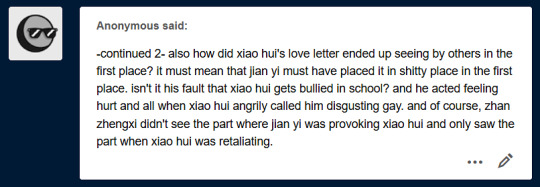


Good evening, dear anon-san!
Before we get any further, I got your another ask that it’s okay if I won’t answer your question. I’m not sure why you felt that way but you had gone through the big trouble of writing your thoughts, so I want to try and give you mine. Also, I don’t talk about Zhanyi too often, so I don’t want to pass chances when people give me a nudge to do so. Anyway, I hope you won’t mind I decided to answer your ask.
You had a lot of things to talk about, so I thought I would give my thoughts some structure by picking up some overall themes.
A bit of a TL;DR: I imagine your interpretation of Jian Yi’s character is very much of an unpopular opinion. And I’m afraid I won’t be agreeing with it very much because I have always read him and his relationship with Zhan Zheng Xi quite differently. That being said, though, I do want to applaud your courage to share your views with us. It makes me feel privileged that you feel comfortable enough with me to be open about your opinions.
Zhan Zheng Xi and Xiao Hui
Let’s start this with perhaps the easiest topic: XH having a crush on ZZX. It’s true she didn’t really hide her feelings for ZZX. She tried to muster up enough courage to deliver her confession letter many times and also approached him directly. However, it was clear ZZX was bothered and felt uncomfortable by her affections. (ch. 51, 52, 98, 99. 102, and 156)


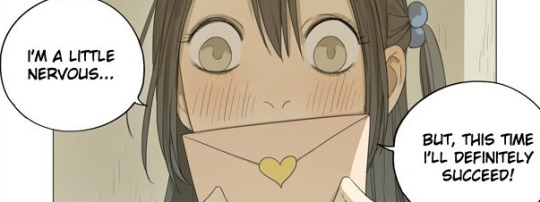
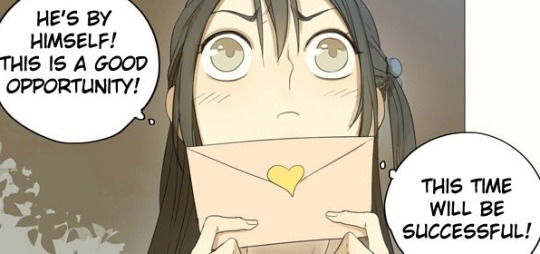
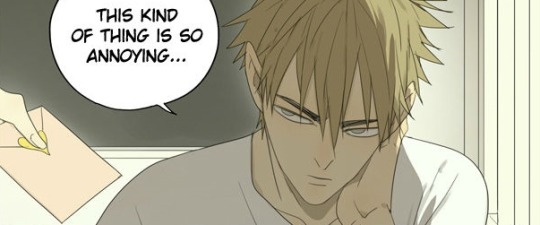
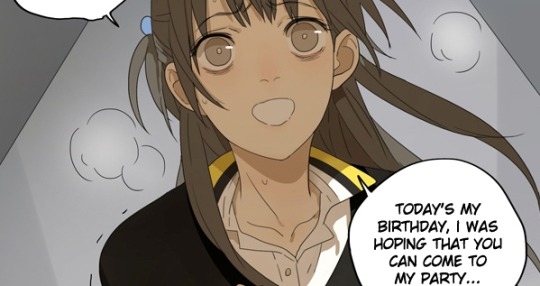
She was quite persistent and forward, but I don’t think she deserves to be called a stalker. Not even close. I think we’re forgetting that middle school is that awkward time in life when it’s starting to be noticeable that girls develop faster than boys. Girls of that age can actually be very open about their crushes while boys feel embarrassed, bothered, and annoyed by them. Nor are boys really interested quite yet. I think that’s very much apparent in ZZX and XH’s case.
A short storytime. When I was in middle school (about 12-13 years old) I had the most intense crush on this boy in my class. My very soul was consumed by how much in love I was with him. And I had no problem being open about it, either; I gave him birthday and Christmas cards publically, forced him to write on my friends book, and overall was quite pushy with him. He never returned my passionate feelings but was rather annoyed, embarrassed and disgusted by them. After two years, my feelings passed. Was I a stalker, though? I don’t think so.
So, yes, it was very understandable and realistic for ZZX to be bothered by XH’s advances but I wouldn’t brand her as a “stalker” and make too direct conclusions about their relationship. Rather I think that’s how it usually goes in that age.
Jian Yi and Xiao Hui’s letter
Overall, JY was in a very difficult position when he found out about XH’s feelings for ZZX. On one hand, he was very much in love with ZZX, and it had been his most precious secret that he’s both wanted to confess and hide. Worst case scenario, his romantic feelings might end their childhood friendship or put them in a position where others could easily discriminate and bash them. On the other hand, XH’s advances put pressure on JY and painfully remind him that it’s not as simple for him to confess and be open about his crush. I have always sympathized with him because being in that position can be very painful and conflicting. (100, 101)
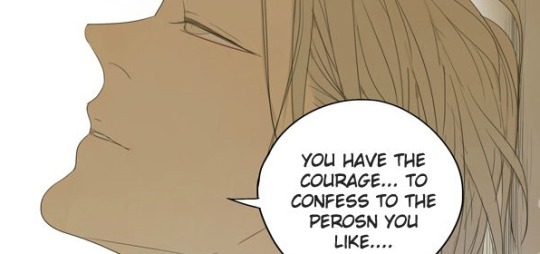
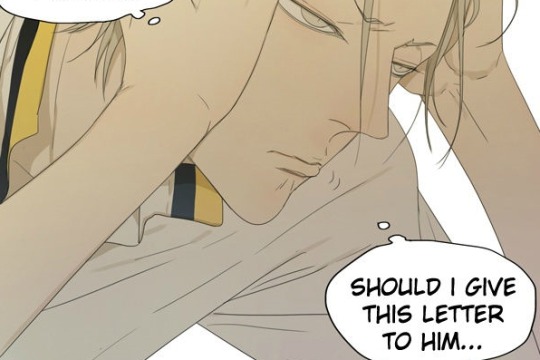
I mean, imagine someone asked you to deliver a confession letter to the person you have been in love with for years. Can you imagine how crushing that would feel? A big part of me, at least, would certainly think my crush was doomed. And it was obvious JY struggle between doing the right thing and doing what his heart wanted to.
When JY agreed to give ZZX her letter on the condition that she won’t come near him, I think that was the most manipulative JY got in that whole story (ch. 100):
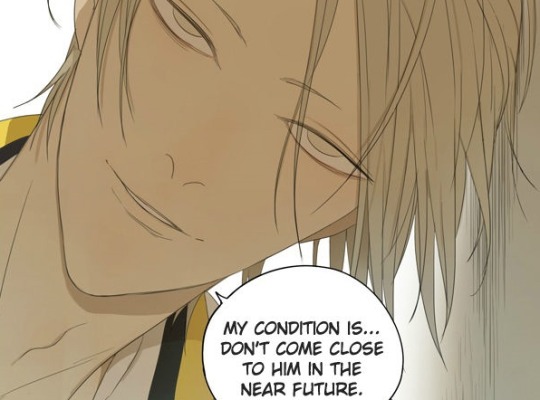
And I don’t think even that was very successful. He told her to stay away but... what was the endgame? Was JY’s plan to make her believe he had given ZZX the letter and prevent her from finding out the truth by telling her to keep her distance? But at some point, she would have grown anxious and approached ZZX again, right? The truth would certainly have come out eventually.
I think he hadn’t thought it through at all but rather that “don’t come near him” plan was a desperate attempt to buy some time. I don’t see that as JY trying to isolate ZZX in a toxic way at all but rather him trying to prolong the inevitable. His feelings for ZZX never had the same promise of a future as XH’s feelings - and straight love, in general.
Also, let’s not forget that JY did end up giving ZZX the letter despite his own difficult position (ch. 102):
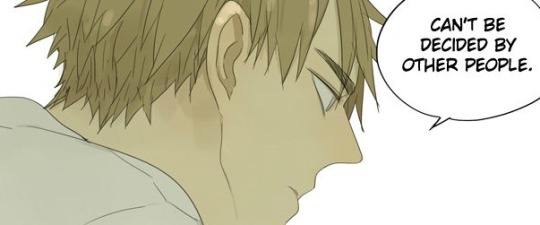
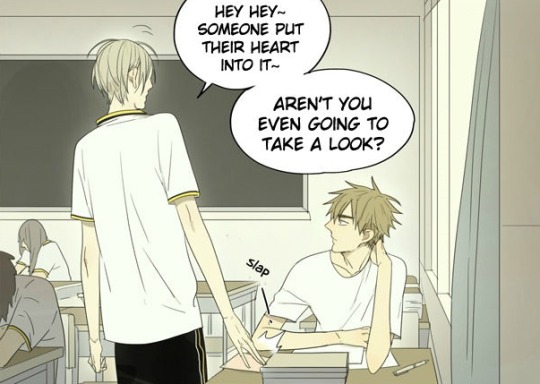
What ZZX said made him realize it wouldn’t be right for JY to decide things for him. He couldn’t advance his own goals that way and feel good about it. But at the same time, giving ZZX that letter put JY’s feelings at a big risk. Basically, JY came close to watching the person he loved returning someone else’s feelings. I’m not sure I could have done the same if I had been JY, and I bet many of us would have struggled to make up our minds, too. Would that make us toxic manipulators, though?
Xiao Hui’s letter exposed
XH’s confession letter being exposed to everybody was a messy situation for all parties. It exposed so many private and vulnerable feelings for anyone to see and make fun of. And usually, the more we want to protect something inside us, the stronger we react when it’s either exposed or poked at.
Even if I don’t really see JY worrying about ZZX’s reputation as a bad thing or something problematic, I have always wondered about that part (ch. 158):
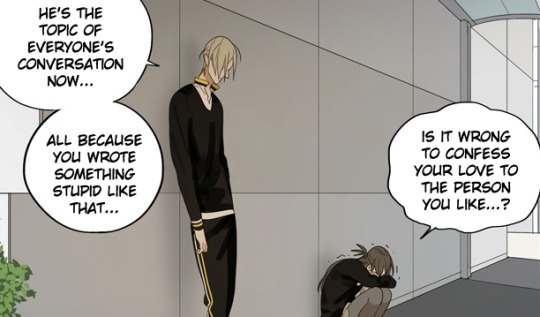
It always seemed like an odd thing to worry about in that situation to me. But I suppose he just didn’t want ZZX to become the center of gossiping. People were making fun of the letter and both its writer and who it was addressed to. Again, romance is quite a tender topic at that age, especially publically. To be involved in those kinds of things - even involuntarily - would most probably put you in the kind of awkward position that you can never quite live down. So, yeah, even if my center of worries wouldn’t probably be protecting ZZX’s reputation, I still get where JY was coming from.
I also suppose JY didn’t want XH’s crush to be public knowledge because it made his situation that more difficult and an uphill battle. The rumors and gossips would stoke and contribute to the overall rhetoric that ZZX has a girlfriend or that he’s popular among girls. But again, I don’t really see that line of thinking as manipulative. I don’t think he was pretending to be sad or trying to provoke XH to make her look bad in ZZX’s eyes. I’m sure I would have felt somewhat the same in his situation, actually.
However, I do agree that readers (if that’s what you meant by “people”) were too eager to brand XH as a problematic homophobe and hate her guts. What she said was wrong and hurtful but still not that surprising (ch. 158):
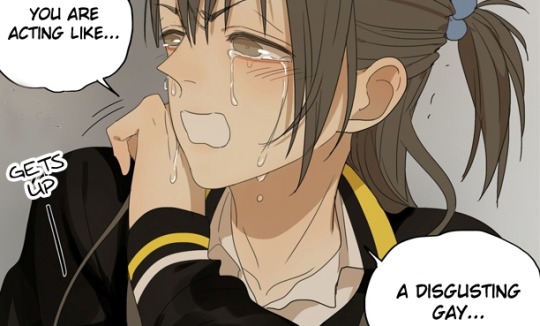
She had been publically humiliated and her feelings had been made of by everyone. She was hurt and embarrassed, and when JY blamed her she lashed out and threw the easiest and most obvious insult she could think of. I don’t think it’s fair to judge her whole character based on one moment when she was so vulnerable and humiliated.
What comes to ZZX, I don’t think it was a case of him conveniently walking in when JY had been bashed by XH and him judging the situation wrongly (JY as the victim and XH the villain). The way ZZX handled the situation tells us that he could see behind the emotional escalation and recognized the pain both JY and XH were suffering (ch. 158 and 159):
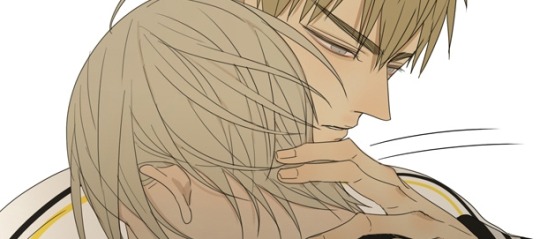
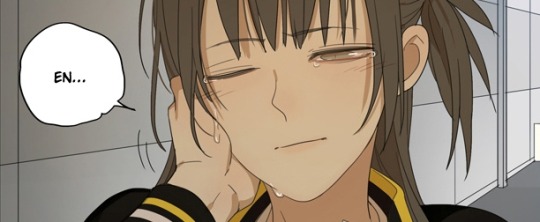
He understood XH had poked a very vulnerable spot with her “disgusting gay” remark and why JY had gotten upset. Not long ago before the letter incident, he had seen how insecure JY was about his feelings for someone of the same sex and how scared he was of being rejected because of it. It was the last thing JY wanted people to talk about out loud but also where you could hurt him the most.
But ZZX also realized the situation XH was in and why she had lashed out. He was very gentle with her and treated her feelings with respect despite turning them down. He saw his own little sister in her, not a villain or a bad person. I’m sure his reaction would have been vastly different if he had thought XH was out to deliberately hurt JY.
Jian Yi’s orientation and manipulation
I can’t say I see JY using emotions to knowingly influence and manipulate ZZX’s decisions but I do think ZZX has an obvious soft spot for his best friend. It goes all the way back to their childhood when ZZX promised to protect him, and later JY’s special place in ZZX’s eyes is represented by the rhetoric of lifelong promises between them (ch. 97, 127, 159, 161, 169, 285):
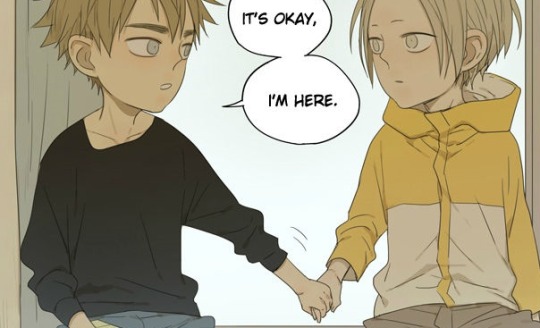

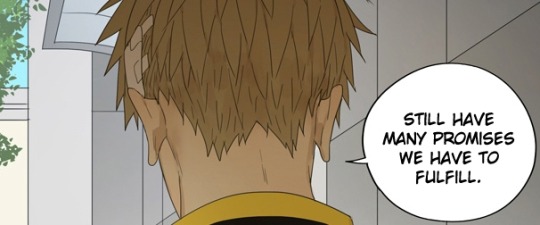


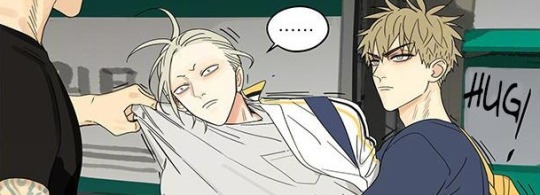
To me, that’s pretty much the essence of ZZX’s character. He’s loyal, protective, and surprisingly comfortable being so caring. We can see him treat his little sister very similarly to how he treats JY. So, when he sees his best friend crying and thinking there’s something wrong with him because he’s different from others, it’s his second nature to comfort and reassure JY.
Overall, JY has talked about his orientation or feelings for ZZX three times in the comic so far in a way that has changed the course of the story. (If you wish to read more about how I see the Zhanyi storyline go check out my other earlier answer.) The most shocking and dramatic turning point for both of them was probably when JY’s feelings came to light for the first time (ch. 143):
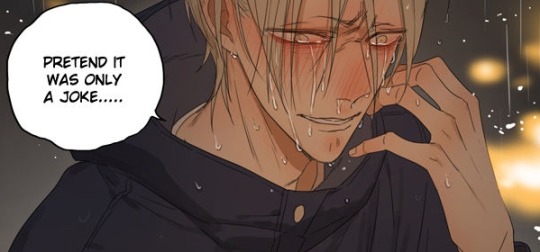
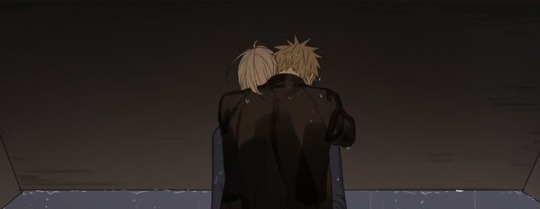
I really can’t see JY being emotionally manipulative at that moment. I would say his reaction is more than understandable and realistic instead. I don’t know if you have ever had to come out to anyone about your sexual orientation, dear anon-san, but it’s always a nerve-wracking experience. I’ve told about my own bisexuality to my parents and best friend and it was insanely scary both times even if I was confident they wouldn’t have a problem with it. Despite everything, there’s always that little “what if” rattling in your head.
Now, multiply that by XXX and put yourself in JY’s raincoat. He was a teenage boy who had just kissed his lifelong best friend and couldn’t play it off as a joke. The more he tried to run and hide, the more the feelings he had buried for years poured out in a mess of tears and fragmented thoughts. I mean, we had read about how deep their friendship ran for 100+ chapters by then but I’m sure many of us were still nervous and unsure about how ZZX would react.
However, ZZX isn’t unable to set his limits even when offering comfort. I think that was apparent the second time JY’s feeling were addressed when JY was drunk and looking for something ZZX wasn’t ready to give him yet (ch. 165):
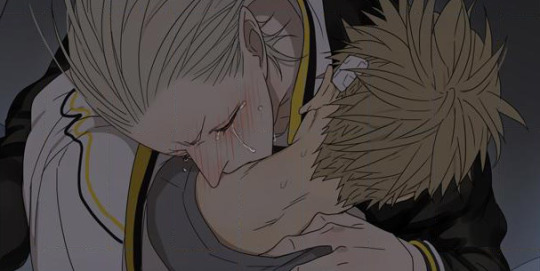


JY was genuinely very emotional and in a vulnerable place but ZZX had to reject him. I actually talked about that moment in one of my earlier answers because I have always found it interesting and complicated. JY was so insecure and afraid of ZZX rejecting him that he wanted to push the limits to find out how ZZX felt about him (both being in love with him and someone of the same sex). It almost seemed like he was tired of being anxious and kind of wanted to get it over with. But ZZX wasn’t quite there yet. He had expressed his support when it came to JY liking men but wasn’t ready for what JY was really feeling. Unfortunately, that meant he had to hurt the already vulnerable JY but the bottom line is, he did reject him. He might have a lot of affection for JY but he’s also very in tune with what he wants and isn’t ready for. That’s also a part of him being honest and loyal. If he had allowed JY to have his way, ZZX wouldn’t have been true to JY or himself.
The third and last time was when JY finally, officially confessed and - according to my interpretation - ZZX returned his feelings. Again, I don’t see JY being emotionally manipulative but there is one aspect that has always caught my attention (ch. 209):
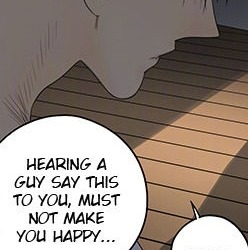
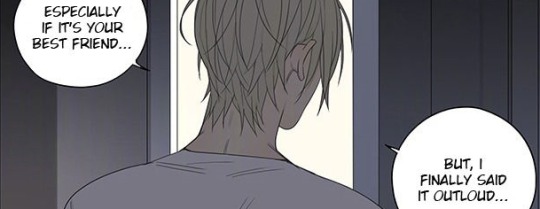
JY says he likes ZZX so much he’s about to explode and whether it’s about their past or future, it’s always been and will always be about ZZX. This time JY’s fear of rejection manifests itself a bit differently, though. He kind of rejects his feelings himself before ZZX even says a word. He already knows ZZX isn’t happy about being loved by another guy and his best friend at that, so there’s no need for ZZX turn him down. Also, by seemingly shifting the goal of his confession (you won’t feel the same way but at least I finally said it) JY is protecting himself.
Could that behavior be taken as manipulation? I guess on some level, but I think it’s also a very natural and realistic reaction. It can be used to influence someone’s decisions but it’s also a defense mechanism. One that I - and I’m sure many others - can personally relate to very much. And I don’t see JY saying those things in that situation as a way to try and make ZZX feel sorry for him and return his feelings that way. This was the first time he was completely open and honest about his love for ZZX - confessing while looking straight into his eyes - so it’s no surprise he behaved defensively like that.
Also, I believe ZZX had already made up his mind about what his answer would be before he even asked the question. He had reached his resolve and was comfortable with it. All he needed was for JY to say the words out loud.
Jian Yi, Mo Guan Shan, and He Tian’s money
Okay, the last topics! This was something you only briefly mentioned but I felt like they supported your view on JY that already differed quite a lot from mine, so I thought I would give my two cents about these, too.
I think JY is exactly the kind of friend Mo Guan Shan desperately needed when he was falsely accused of assaulting that girl. In fact, JY is the kind of friend all of us should have: someone who won’t hesitate to stand up for us. Because I don’t think “anyone would have done the same thing” for MGS. Actually, that’s why She Li picked him as the scapegoat in the first place (ch. 178, 186, and 184):

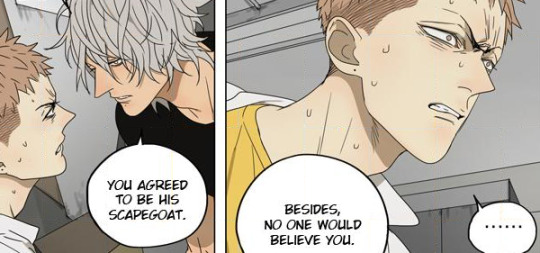
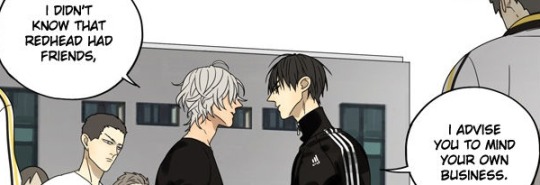
Not only did SL take advantage of knowing MGS was a social outcast at school and people were prejudiced against him so no one would even doubt the things said about him but he also knew MGS didn’t have the kind of friends who would step in. He Tian most certainly was one of them, but so was JY the way he didn’t hesitate to barge into the office and loudly demand justice for MGS (ch. 185):
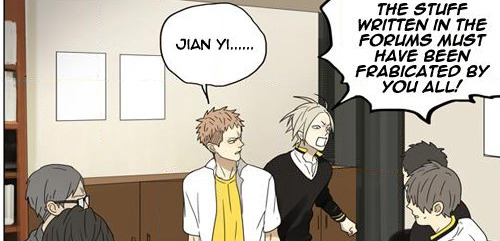
Let’s remember, when the assault case was going on HT, JY and ZZX were the only ones defending MGS. Not even the teachers seemed to think “innocent until proven guilty” or even entertain the thought that MGS might not have done it.
What comes to JY talking about HT having a lot of money (or being rich or poor in general), I think it’s just a part of him being cheeky and the kind of humor 19 Days has. JY’s character has this obliviously and unapologetically immature side that can be a bit annoying at first but soon becomes one of his most lovable features. I never took this side of him as an offense but rather him just being a 15-year-old boy among other teenage boys that will fire back just the same (ch. 258, 296, 298, 301, and 310):
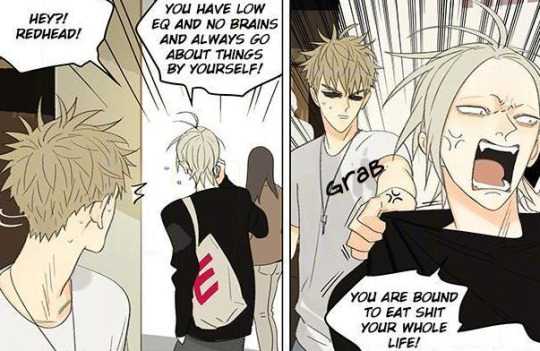
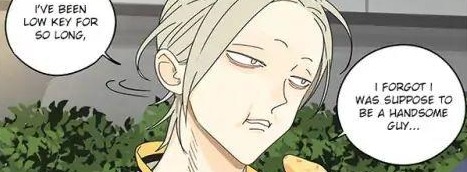
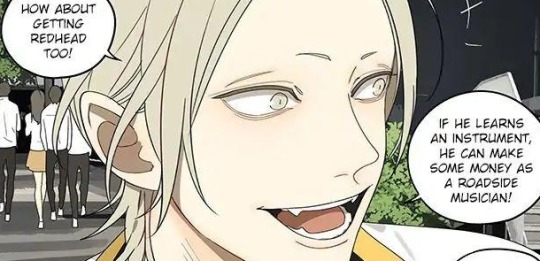
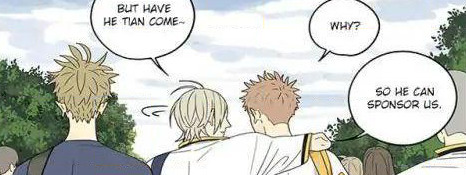
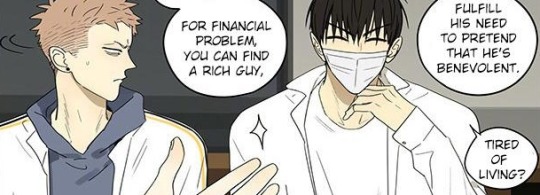
JY doesn’t really have a filter and he likes to brag a little when, for once, he’s in that kind of position, but there’s no true malice in his words.
A few quick notes that I won’t get into deeper than this:
I don’t know about ZZX being demisexual but overall BL does seem to have this trend of making male protagonists fall in love with each other without identifying as LGBT. BL has been criticized for this because it’s a way to avoid talking about the fact that men who are attracted to other men are, in fact, gay (or bi). In many BL stories, the protagonists are portrayed as straight and them falling for a guy is just special circumstances and they’re gay for just that one guy. And while I don’t personally have a major problem with it, I can’t deny it feels a bit of a cop-out. Does Zhanyi fall into that category? On some level, I guess, but it’s also too early to say. The boys are just figuring out who they are as individuals, so JY, for example, identifying as gay might be said out loud one day. Don’t think that will ever happen in ZZX’s case, though.
I also don’t think JY is trying to isolate ZZX from other people. Now that he’s more secure regarding ZZX’s feelings for himself and their relationship, he’s even included XH to their group.
Phew!
Was that all? I think that was at least the most of it, if not all. If you think I skipped something or would like me to elaborate on something, let me know!
As I warned you in the beginning, I ended up disagreeing with the majority of your interpretation. Hopefully, I wasn’t too harsh with my wording or ways of putting things. Even if our views were pretty much the opposite to each other, your thoughts prompted me to look at JY’s character and Zhanyi from a new perspective. And that’s always a good thing. Thank you again for that opportunity and for sharing your interpretations with us, dear anon-san!
143 notes
·
View notes
Text
Himiko & emotional intelligence
This is an aspect of Himiko that I deeply appreciate and want to talk about here, especially since I haven’t seen a comprehensive post about this character trait. I think this is especially important given her desire to Kill and Replace, but it also contradicts portrayals of Himiko that construe her as not particularly smart or strategic. Emotional intelligence is actually a huge asset of hers, in many terms, including as a weapon. She exhibits a profound and seemingly intuitive understanding of other people’s emotions and can modify her own behavior accordingly for her own ends. Below is a listed breakdown with specific examples, in no particular order of importance:
1. Intuitive understanding of unspoken feelings

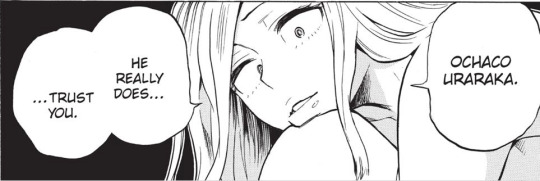

This is probably the most prominent example, and which we see time and again. Himiko repeatedly makes assertions based off tangential information, which she surmises into an accurate reading of other people’s character. Ochako and Izuku are basically complete strangers to her, but with minimal interaction, Himiko’s able to deduce important relationships to both of them. In the latter examples, while Izuku and Jin have alluded to their feelings to or around her, Himiko cuts right to the heart of the issue: not only does Izuku hold Ochako’s abilities in a conflict situation in high regard, he trusts her; not only does Jin feel guilty for Magne’s death, he feels the most guilt, and cooperating with the yakuza hurts him because of his guilt.
She confidently makes a statement about three different characters, and she’s shown to be correct in how she interprets their feelings. Her intuitive deduction often acts as a narrative device to show authorial intent (that Ochako does have a crush, that Izuku does trust her, Jin does feel guilt), so it’s important that her statements are accurate. As a result, she happens to become one of the most emotionally perceptive characters in the series, almost to an unnerving degree, able to correctly make snap judgments about people’s feelings and relationships. But how else do you use a quirk like Transform, right?
2. Blending into her role

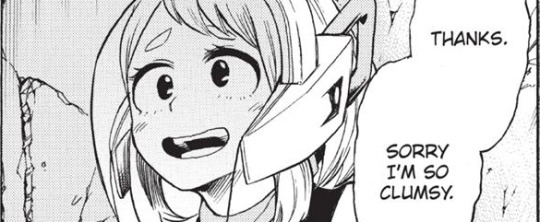

We’ve so far seen Himiko in four different transformations (Rock Lock isn’t on here because I got lazy lol). Quite obviously, she’s not perfect—Kemi’s classmates at Shiketsu notes that she’s been acting weird, and Izuku quickly figures out that the Ochako he rescued during the Hero License Exam was an imposter. That said, Himiko does several things very well that shows it’s not carelessness on her part, so much as reasonable limitations given how much she knows about each of these people.
Starting from the obvious: her mannerisms. Himiko adjusts her mannerisms according to whomever she’s imitating, including expressions, body language, and (I’m assuming, w/o the requisite Japanese knowledge to go on) speech. Her personas are distinctive in each instance, and tailored to suit the situation they’re in, from Ochako’s sheepish look to Izuku’s direct, urgent communication. Himiko assumes a, at the very least, passable imitation of people she’s, again, barely met, adopting salient behavioral traits so she doesn’t easily get found out. Even when Izuku calls her out, he points out technical flaws in her imitation of Ochako (that she didn’t float, the lack of planning when coming to save him) rather than obvious tells from personality.
That said, where and when Himiko uses her Transform ability is also strategic in nature. For sustained periods of transformation, she selected a target who she could imitate more easily, whose strangeness would be more likely to get overlooked. Shishikura Seiji says this about Kemi:

Himiko’s target and surroundings are carefully chosen to minimize chances of discovery, all strategic considerations that rely on an ability to read the atmosphere and people’s dispositions. She makes use of moments of confusion and plays off of people’s (but especially heroes’) need to react and help, betting on them to act before asking too many questions. This also raises an interesting question for me: in the hero license exam as Ochako, did she fall deliberately, counting on Izuku to catch her? Canon doesn’t make it particularly clear either way, but to speculate about it is fun in its own way.
3. Curiosity towards others
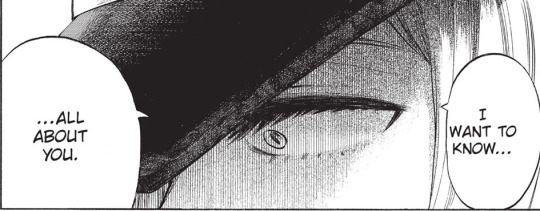
This trait ties in obviously to Himiko’s fixation on Kill and Replace, but it also serves to expand her understanding of other people. By asking these questions in her drive to satisfy her curiosity, Himiko must also necessarily take in and process the information she receives in response, so she necessarily acquires an (emotional) understanding towards others. While this line is directed to Izuku, her interrogation of him broadens her perspective about not only Izuku himself, but those who are like him—in this case, heroes. Both Himiko and Tomura (in the mall scene) seek out Izuku to elucidate certain ways of thinking that are foreign to them, and seem to come away from the interaction with some knowledge gained about the enemy. While Tomura is the one who clearly grew during his encounter, in beginning to use his acquired philosophy to gain legitimacy, it would be inaccurate to say Himiko gained nothing from hers, even if it was marginal enough not to be addressed in the canon narrative yet. She’ll obviously have more interaction with Izuku in the future though, so there should be plenty of opportunity to show how this encounter affected her too.
4. Using emotional information for her own ends

All of her skills amount to this—a brilliant play in the Hideout Invasion Arc that is vastly under-appreciated. Let’s set the scene: she and Twice have been drafted into the yakuza, whom neither of them much like, and now they’re embroiled in the yakuza’s affairs which involves a confrontation with heroes. They’re disadvantaged in terms of sheer physical power, they’re trapped in the battlezone with a significant risk of getting arrested, and their true target (Overhaul) is quickly making his escape while Mimic slows everyone down. Mimic is someone with whom she’d had a brief but antagonistic interaction that we know of, maybe more went on off-screen. Regardless, she understands enough about this person to figure out where he’s hiding (which stupefied the heroes), and exactly what to do to make him reveal himself against all his best interests. How she goes about this sets the course for the rest of the chapter.
With the right combination of words, she coaxes Mimic into self-sabotaging by revealing his location, and the heroes react exactly as she wanted them to. They prioritize subduing Mimic; once Izuku catches on to where he’s hiding, he takes him out, and it occupies all of the heroes for just long enough for her and Twice to make their escape. Himiko talks the situation into her favor, and ends up with one of the most troublesome yakuza members out of the way, and the road cleared for Twice and herself to execute their own plan to sabotage Overhaul.
I don’t think I need to go on about how amazing it is to manipulate a chain of events like that. Suffice to say that achieving such a result required a remarkable understanding of Mimic’s character and tics. She knew what to say that would dig the most at his insecurities, what would piss him off the most, and how the heroes would react. Basically, she played them, pretty much effortlessly and with very little time to think everything through. As stated in point 1, her ability to grasp a situation and all personalities involved seems pretty much intuitive, allowing her take advantage of what is going on around her. This is one of those scenes when the cunning of a character truly shines through, and it happens by allowing Himiko to take control of the situation just by reading someone’s personality and emotions.
5. Emotional intelligence=empathy?

One would think that this all amounts to an extremely sympathetic reading of her, and Himiko does tend to get very sympathetic reactions out of fans. After all, she’s redeemable by her age, she’s fun, and she has extremely endearing interactions with Twice. People particularly like to cite the scene above as evidence that she’s empathetic, and therefore not just a surface-level sadistic serial killer. I somewhat agree on these points, but although I’ve just spent a lot of words detailing indications of her emotional intelligence, I hesitate to assert that it necessarily makes her more predictable in terms of her loyalties or willingness to self-sacrifice.
So as to not get too deeply into what other people think or don’t think, I’ll just present my own argument here. While Himiko does show herself to be perceptive towards other people’s feelings, upset at the team’s loss of Magne, and reassuring when Twice is distressed, it may not come from a totally selfless, empathetic place. This is something of an extrapolation from her behavior in other instances, like the serial killing lmfao, but also this bit towards Tomura:

When faced with the possibility of doing something she doesn’t like, her reaction drastically differs from Twice. Twice is hurt by Tomura asking them to join the yakuza, but Himiko doesn’t seem to feel hurt; rather than echo Twice’s plea for consideration, her reaction is a logical, problem-solving attempt to remove the element that is making her do that which she dislikes. Her gesture towards Tomura is antagonistic. Her expression is placid, she even calls Tomura by his first name, but her action is a threat, making it clear she will hurt someone to get her way.
What I read from this interaction is that, to Himiko, people are disposable if they become ‘unpleasant.’ It’s the people on her good side who warrant her reassurance, but given that it’s Tomura she threatens here, that can change at the drop of a pin. This is why I hesitate to point to her emotional intelligence as something that indicates unconditional loyalty or compassion; there is very clearly a self-centered and opportunistic streak in the way Himiko evaluates people around her and her relationships to them, and that’s a trait that’s often overlooked. People are welcome to interpret her however they want, but I think her willingness to rebel against and threaten the people she deems friends is something that bears acknowledging.
6. Bonus: she still cares to remark on what Tomura thinks though
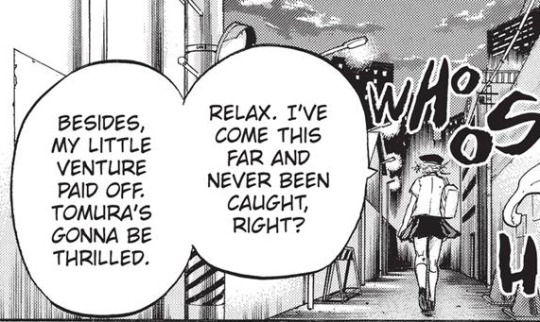

IT’S CUTE, that’s all.
Emotional intelligence doesn't always point to good deeds and intentions, and I think this aspect of it is ignored when it comes to Himiko. Focus on her character tends towards the moments when she's being compassionate (and I get that because it's really cute) but I feel like it undersells how manipulative she can be. She regularly uses her people skills to infiltrate, confuse, and sabotage, which is also very a interesting and fun part of her character. She can be strategic! She can be cunning! It's just a different type of intelligence that most of our main characters exhibit, especially in terms of how she uses it, but that's also part of what makes her a great villain.
1K notes
·
View notes
Text
COVID-19 19: Laura Cozijnsen

“Laura you are being irrational you wanted masks but you got disposable gloves!”
To start off the COVID-19 19 interview series, I invited Laura Cozijnsen for a discussion at her office in Tsim Sha Tsui on a Thursday morning. Laura is the founder of Lighthouse Consultancy, a communications consultancy delivering diverse public relation campaigns and events with high profile clients such as Tai Kwun, HKUST and HKIA. Alongside Laura’s entrepreneurial success at Lighthouse, she is an award-winning MC and public speaker hosting events such as the 2010 Expo in Shanghai. With Laura’s longstanding involvement and commitment for Hong Kong’s communications industry, this interview hopefully reveals a glimpse into the potential changes and innovations Lighthouse Consultancy and the larger creative industries will have to go through in order to adapt with COVID-19. And as much as it is important to consider the new corporate strategies set in motion, I also wanted to know how Laura was personally coping with the pandemic whether it be with how she greets her dog when she comes back from work or on the political nature of the face mask. Everyone in Hong Kong has their own memories of SARS and now COVID-19, and this is Laura Cozijnsen’s:
T: Reflecting on the past, what was your understanding and experience of SARS in 2003?
L: 2003, I was working for a media company starting in Hong Kong. I remember vividly that it was very scary. The times were scary. Scary in a sense, there is almost like this fog of fear around hong kong. I think it was scarier then now. I remember vividly because my role back then was a regional role. I had to travel to Singapore, Malaysia and Indonesia. We had a few trips planned before SARS. There was this Singaporean company who called us and said “please don’t come to Singapore, you are from the SARS zone”. And I felt so bad, we always felt so welcomed to have meetings and then we could dine out. And then all of a sudden all we got was “you’re from the SARS zone”. It was also a time when I felt…we felt collectively sad. And the loss of medical professionals - the doctors, the nurses and the caregivers all live in our memories. And of course Amoy Gardens and the area around it, no one wanted to be near the buildings. That was how scary it was.
T: I wrote an essay before this all happened - an essay focusing on illness narratives. I wrote about how prevention was also part of an illness really, because it was a social reaction. So I wrote about the prevention methods in the United Kingdom versus Hong Kong. It reminded me that one time, I told my mom that I was going to a birthday party buffet in the Metropole Hotel in Mong Kok. I didn’t know at the time, because they changed their names and everything. So my mom was like “What’s wrong with you?”.
L: I think it was different from now. SARS was more a Hong Kong/China thing. At the beginning of coronavirus, it felt very much the same. There was China and there was Hong Kong. No one knew that it would blow up in the rest of the world. And now it felt like it was the whole world going through this. And from a financial perspective, it’s worse now. Because SARS was just here, and now the rest of the world. I think, is this nature’s way of telling us like “wake up”. No one can escape.
I had a friend in the UK that caught coronavirus. She is from Hong Kong, she works in London. Her mom visited her in January and her mom came back early March, after staying with her for two months. And the tests at the airports, she was confirmed as a case. And then my friend started feeling coughs and heavy breathing, and it was only then that she realised that she might have coronavirus. She was not tested, because they said we do not have enough test. So the numbers…what does a number mean?
T: You touched on it briefly, but how has it changed in 2020? And especially in the earlier months, when it felt so much more like an “asian problem”. What was your perspective in Hong Kong?
L: I thought it would be like SARS. Okay, as long as we continue doing the precautions we will be okay. But then there was also this scare of the lack of masks. Everybody was trying to get a mask. You know the internet meme of “two boxes please”? When someone says, I have a source and then you respond with “two boxes please”. That has become a joke amongst friends but that was the most scary. Because we had no idea we would need so many masks. And it was Chinese New Year. The Wuhan lockdown was 25th of January. And that really sent a message. I should send you my Facebook Live, I did a facebook live on the survey results. It was amazing, the day Hong Kong people started wearing masks was before the Wuhan lockdown. So why would we know, how come we can predict that we need to wear masks? It was before the first confirmed case in Hong Kong. So there was this collective memory of this type of illness, and the knee-jerk reaction of us needing to do this.
This was so funny, one day like many others I was trying to get a box of mask for myself and my mother who does not live with me. I went all over the neighbourhood trying to get masks. We ended up at a grocery store, and the saleslady said “We ran out of masks, why don’t you get some gloves?”. I think the irrationality got the better of me, I bought two boxes of gloves. So it’s still sitting in my kitchen, unused. That was the moment where I realised “Laura you are being irrational you wanted masks but you got disposable gloves!”. I think it was also realising that the death rate in Hong Kong was much less than SARS in Hong Kong was reassuring. But yes, that was the early days.
T: Especially the HKU Prevention of Diseases department, they continued to speak out even after Carrie Lam was asking citizens to not wear a mask. And the team at HKU, they were like “please wear a mask!”.
L: There are so many mixed messages! I think a lot of them come out and say “don’t wear a mask because there is a shortage”. If you don’t have enough stock, you should be clear about it. We have stock for how many days, what’s the best alternatives. You cannot say you do not have to wear one, it is irresponsible. When you look at the statistics, how the growth was being contained in certain cities you realise mask wearing helps. When you look at the President of the United States, he does not even wear a mask, he does not wear a mask in the hospital.
Which brings to the question - how do we select our leaders, how are our leaders being selected and why are they our leaders?
When I was writing my thesis, inevitably people would start talking about the Anti-Mask Law, last year in Hong Kong for the protests. But I think as researchers in that role, we report what is being brought up. And its totally okay, with people there has to be politics.
I think we should provide all medical and sanitation staffs a bonus and a longer holiday after this. Because they work their asses off. I’ve got close friends working in public hospitals that were so stressed, understandably stressed. You also see the beauty of someone going into the Dirty Team with SARS experience, bringing in new nurses and doctors who do not have SARS experience. Hopefully that would educate them and help them understand what it is like. There is a good thing going on as well, those who have experienced it say, “I need to do this because I want the second and third generation of caretakers to know what it's like.”.
T: Going on more of a business perspective, since industries have been pushed into a digital realm during COVID-19, how has that changed working in event management?
L: I think there are a few layers, when you see something that is such a change that is so abrupt. I would think the first thing to do is internal stabilising within the company. In early Feb, we talked about how COVID-19 would affect us as an industry and what we have to brace ourselves for. Every month we have a “situation room meeting”. We basically talk about how business is, what it is going to be like. So internal is phase one. The second is facing external but not in terms of switching gears but understanding what our clients are facing. Because we are all human. They might be afraid of losing their job or bottom line. So really understanding their concerns is what is important. And the thought then would be to switch gears or to think about new things. It would hopefully in the next year that hybrid events could be an option. Once we have this, we can go back and have internal education and the talk yesterday for clients we can reassure them and tell them that we have done this before.
Everything begins with the team, then to understand what the market and client wants and then do it instead of jumping right in. Because without an internal support or understanding you can never do it well. Of course during this time period, all companies are under a lot of stress. It is a time to tell people’s virtues and real characters.
T: Do you think it will change the future of physical events, do you think people will be less willing to participate since you do specific location based events?
L: I think there is going to be a push and pull. There will be a switch in terms of the proportions for a while. And if digital picks up and serves the purpose then we will see events in a different light. Digital events will become less of a ‘nice to have’ and more of a main thing. The benefits have not been capitalised before. I do think that physical events are important because we are human beings, we crave social interactions and seeing each other. But it will be very different.
T: Thinking about your colleagues at work, since they are younger do you think their understanding of SARS is vastly different to yours?
L: I don’t think a lot of them remember, I think at least you have to be 30 years old to have good memory of SARS because it was 17 years ago. To pick up a new thing it does not necessarily have to be for young people, you might see older generations willing to pick up new things. It does not mean that young people will be more accepting to change. So I think the future of education is about growing a generation of agility, flexibility and change. Instead of having to tell students to take ten subjects and pass all of them.
T: How have you and your personal circle (family and friends) been coping with COVID-19?
L: It’s interesting, I get to see more friends now than before. We will call each other more. Before, I had a busier schedule. I do not think that without COVID-19, I would have met so many friends if that can be considered a plus. Family - my mother has been through SARS, she is okay. She has more supplies than she needs, but her only thing is that she is a big church person. So I was teaching her how to use Facebook to watch mass.
T: My grandma does that too! She tells me, “Yes we can go to mass together online!”.
L: I think that has changed, my mom is 78 and she can still learn which is pretty amazing. I also think the world has slowed down. And for us to realise when there is less work, what is important. It is the friends and family that we have. I have friends who paid horrendous amounts of money just to get their kids to get back on the soonest flight. I asked them, “Can you wait for a week? It would be maybe 1/10th of the price.”. And they responded with, “No it must be today.”.
T: This question is more of a precursor to developing one of my other projects, something I want to extend beyond this interview series: In terms of understanding the political nature of the mask, what is your opinion on Hong Kong’s culture of donning masks?
L: I think mask wearing in Hong Kong is a constructed social defence, because that is something we can do. It is almost like psychologically I can do something about it. SARS has redefined for us what a mask is. Because it used to be if you were sick or for a medical staff. But now after SARS, if it is the flu season, you see a lot more people wearing masks. Especially now, according to my research, it is 96% of Hong Kong people wear a mask. Maybe every now and then before the pandemic, someone wearing a mask would be not judged that much. So in fact, the social judgement can change. And not to mention last year, the anti-mask law, and now people see differently. It is something that we feel i can control - both on a hygiene level and on a choice level. So I will do it.
T: How do you feel about the anti-mask law? How did others go about it? Because when I first heard of that law I wondered what people who were sick would go about their day. Even if you were stopped by authorities how can you really prove that you are sick?
L: Personally I was quite resistant to the anti-mask law because I think it is a personal choice. Of course there is a discussion with those who would be held responsible in the eyes of the law with those participating in unauthorised rallies but I still think this is a human right. I think we should want to choose whether we want to wear a mask or not. Of course if a police officer needs to check my HKID for whatever reason, they can request me to temporarily take off my mask. But you cannot say you cannot wear a mask. It’s like if its for religious purposes, oh you cannot wear a veil. It just does not make sense. Or by telling people that you cannot wear a mask it makes people want to wear a mask, its a kind of reverse psychology.
T: I would like to talk about the situation in Mainland China. There are videos on the Internet of people coughing on lift buttons. Now, I do not know if these videos are one hundred percent real or staged. But even the very act of filming it or recording it from a security camera, what does that mean for the health and safety for people living their day to day lives?
L: I feel the most sorry for the people in Wuhan. I think they would require a lot of support after this because it is like where the nuclear bomb hit, right? You didn’t know it was happening, it happened, you didn’t know how to react, you didn’t know who to trust, and you’re just trying to fight for your life. And it is so sad to see videos of people living there and reporters trying to cover footage, its such a quiet city. It is a city that needs a lot of love. And politics is one thing but we always need to remember we are all people, whatever political affiliations we have we are human beings. And imagine that feeling in Wuhan, is like the feeling of being in SARS in Hong Kong. Like, “Fuck, what’s going on? What’s going to happen next?”. I still remember during SARS when I go home, I’d take off all my clothes and then run straight to the bathroom and take a shower before I’d play with my dog. And my dog would be looking at me like (makes confused face). Even now, its not as serious. I would go home, wash my hands and then take off my mask and change into home clothes and then I’ll play with my dog. But she still looks at me confused. And I’m sure people with kids as well. Just imagine doctors and nurses with kids, they (kids) don’t understand. If this is happening to us, we aren’t even in the epicentre. Imagine those in the epicentre.
T: I remember when they did the lockdown in Wuhan, initially they said it was two weeks. But when I saw the lorries barricading the city. I thought to myself, “This is not for two weeks. This is something very serious.”
L: I think for us in communication there is a lot to learn. How should we communicate? What should we communicate? And I think the Taiwan government this time has done a good job. There is so much to learn from them, how they communicated, what to say and what not to say. It is not a parental way of ruling, it is more like how can we work together. I think it is a lot to learn in terms of communications and media.
1 note
·
View note
Text
Has anyone else noticed the similarities between the relationship between Solas and Mythal, and the one between Leliana and Divine Justinia? Could this be an intentional parallel?
I already talked a bit HERE about why I think it’s weird how... reverent? Solas is when talking about Mythal. And I’ve since realized, I feel the same way about Leliana’s relationship with the Divine.
Divine Justinia wasn’t a good person. She didn’t have the same beliefs or values as Leliana, despite claiming to be pro-mage, or she would have done something like Leliana does when she becomes Divine. But she doesn’t, she does nothing for mages. A trait that you would think would annoy our super progressive pro-change Leliana. Justinia seems to want to improve the Cirlces, like Cassandra, where Leliana wants them gone entirely. Justinia refuses to outright say anything in defense of the elves, where Leliana immediately welcomes them into the Chantry as the Maker’s children. When we meet Leliana in DA2 she even talks about how Justinia is considering basically declaring war on Kirkwall because of the rebel mages, an extreme and unnecessarily violent reaction against a whole city just because of a small groups of freedom fighters, ones that pro-mage Leliana likely agrees with. Which also means that Justinia knows something about the situation in Kirkwall, and she likely knows everything after our wonderful all-knowing Leliana gathered information there, and yet she takes no action to stop, or even discourage, the abuses in the Gallows. She could have removed Meredith, or Elthina, or at least just sent a letter saying “hey, cut that out”, but she did literally nothing.
Not to mention, she was terrible to Leliana, and terrible for her. She manipulated her and used her. That’s the only reason she took her on in the first place, because she knew Leliana could be manipulated and used. She saw Leliana as a tool. It doesn’t matter that she was nicer about it, or that they became friends, or that she came to regret it at some point. Justinia doesn’t “release” Leli until after she’s dead, when she can no longer benefit from “having” her. It was selfish, and cruel. Justinia is a ruthless enough person to believe in doing bad for good’s sake is good, but she’s not willing to do the bad herself.
But Leliana never gets upset about any of this, or angry. She never says anything negative about her. In her quest she acknowledges that Justinia feared that she was using her just like Marjolaine had, but she goes on to in the very next breath jump to defend Justinia from the implied accusation. It was okay because Justinia was doing it for the world not herself, it was different because she wasn’t cruel, because Leli chose to take the position, because they were “friends”, etc. She even at one point calls Justinia “the best of His servants” (so Justinia was “the best of them”, hmmmm?).
So, we have two pretty radical pro-freedom religious leaders (because despite what Solas tried to tell the People they still remembered him as a god) who have a strange, almost romantic loyalty to a person who is described as motherly but shown to be ruthless and cruel. Someone who had vastly different values than them, and has done terrible things that we know they should not have supported, and yet are never criticized by them. They even go so far as to say this person is “the best of them”. Pretty clear parallel, no?
I wonder what else these two pairs have in common? Was Mythal Solas’ mentor? Did she use him, like Justinia used Leliana?
#Honestly it kind of reminds me of what idealization is like with BPD (for me at least).#''This person can do no wrong therefore everything they do must be right''#leliana#solas#mythal#Is this a headcanon or meta or theory or what?#idk enjoy my ted talk#it's also possible that the dissonance in Leliana is just from Bioware trying to retcon things to be more pro-chantry?#but I've always seen Leliana as a very dissonant person#she convinces herself of things she doesn't believe because she has to believe them to believe the other things she believes#I'm really happy DAI gave her true freedom and agency to believe her own beliefs and act for herself#hashtag leliana for divine always#long post
63 notes
·
View notes
Text
Thoughts on Mirio Togata and a certain Quirk...
Y’all finally ready??? lets go
SPOILERS FOR ANYONE NOT HAVING READ THE OVERHAUL ARC
(also contains minor spoilers from other arcs? major at the very end for Overhaul arc)
time to,,,,, talk about why I, personally, don’t believe Mirio should be as deserving of OFA as everyone else thinks he is, why Sir Nighteye was in the wrong and everything about that.
Now I do want to,, say a few things first
yes, if you know me even a little bit you will know I am not the biggest fan of Mirio - he actually happens to be in my top 10 most disliked characters. HOWEVER I’m going to do my best to keep my thoughts neutral (to be fair, it was the fanbase that turned me off liking him)
the exact same thing goes for Sir Nighteye, but even worse - again, I won’t rag on him and I do understand why he acted the way he was, sorta
this post will honestly be a mess oof. but mostly I’m going to just dump all the thoughts I can; including how the timeline would change, characters personal feelings and such
THIS POST IS JUST MY OPINION THUS FAR! it might change when Season 4 of the anime airs, and I have extra time to go through the arc again. and of course, if you think Mirio does deserve OFA then thats perfectly fine too! everyone has their own opinions, I don’t expect this to change any minds.
Power-wise, Mirio is deserving - however, this is factoring his own quirk out of this
ALSO NOTE this post has no structure as I’ve said before so...oops?
Ok so to basically start this off; we see Mirio before he loses his quirk as a rather hardworking, bright and sunny student. And yes, first thoughts would be ‘he is the perfect choice’, and I see why people think so. His mastery of his own quirk is rather impressive; if anything, he might’ve been like All Might, able to master OFA much faster. Not to imagine how the quirk would mix with his own, and with future quirks.
But seeing the type of person Mirio is...someone who holds himself so proudly over how he controls his current quirk...I don’t think he would’ve accepted OFA to begin with. He’s already shown the instance of this in canon.
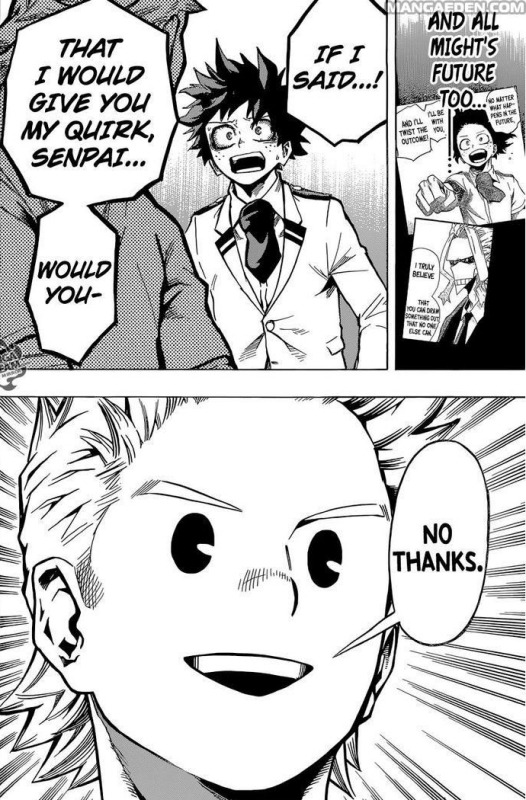
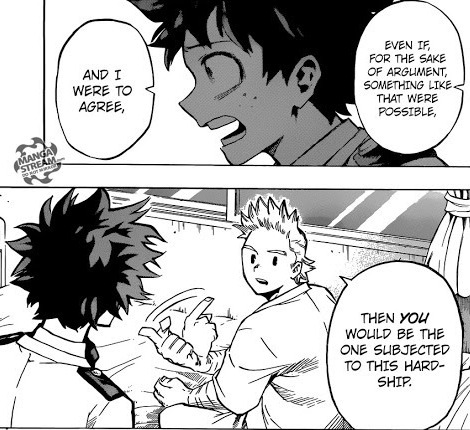
I understand the occurrence of this interaction wouldn’t be the same, but regardless it counts for how he might approach it all. He strikes me a lot like All Might; he’s already powerful enough with his quirk, he’s already got enough control - why would he need to accept this gift, regardless of the power it holds, or the sentiment?
He’s already standing in the ring.
Which also leads me to something All Might has said before, when confiding in Bakugou about why he chose Midoriya to be his successor of all people.
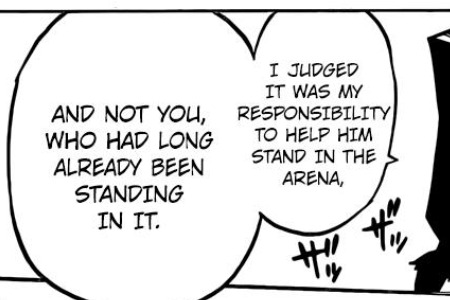
Again, I know the circumstances aren’t the exact same. But I feel like Mirio is the type of character who would prefer the quirk go to someone less fortunate, for he already has so much going for him.
Of course, I could be completely wrong. He might have accepted it, if for the sake of All Might and Sir Nighteye; but I would like to think he wouldn’t. Mirio also reminds me of Midoriya in that regard; caring for others over themselves.
This is also partially why I want to believe that Mirio wont get his quirk back. I feel like it would be so much better for his character to remain quirkless, and to become what Midoriya could’ve been if he had not gotten OFA. That would make his character arc really improve and be really good writing for him.
I’d also like to point out that whilst Mirio is very well much like All Might when it comes to personality and how he holds himself as a hero...one major thing brings them apart, this major part being something Midoriya excels in, and we’ve seen this is various instances.
Mirio...is hesitant.
He was hesitant when it came to their first meeting with Eri. Yes, he is a seasoned student, and knowing how dangerous Overhaul was - it was for the best that they let Eri go.
But you can’t always hesistate. Sometimes you have to jump in...and I feel like Mirio doesn’t have that drive, not like All Might and Midoriya. It was this exact same trait that caused All Might to choose. Midoriya leaped in to save Bakugou, consequences be dammed. I don’t think Mirio could do that.
And now...Sir Nighteye.
My distaste for Sir Nighteye is unique - and it might mostly stem from the fact that I am a Midoriya stan.
Now, I do understand why he was firstly portrayed as he was - bitter towards our protagonist. His character is a rather complex one; he starts off as a rude man but eventually we see why and how he came to be that way, and what shaped him - All Might’s future.
Anyone being faced with the death of the Symbol of Peace, the strongest hero, and having no way to change it would be unnerved. Sir Nighteye was scared, and his reaction is justified...in a way, considering he worked with All Might himself. The two were work partners, and it was this uncertain future that split them apart.
Sir Nighteye had every reason to grow apart from All Might, he only wanted to try protecting him. Being one of the only heroes who knew about One For All, he also wanted to make sure it was passed to the right successor, which is understandable.
But Sir Nighteye, I feel, approached the situation in the wrong way. We see that very clearly when Midoriya has to fight him in order to be accepted as his intern.

This scene just...rubs me the wrong way when it came to Sir Nighteye’s character. There were plenty of other ways he could’ve tried to deal with this.
He doesn’t have to accept Midoriya, no, but he should’ve put his bitter resentment aside. He only knows Midoriya as the kid who breaks his bones with his quirk. He doesn’t know how much Midoriya had to fight to control this quirk - and even then, he still can’t control it.
But also Midoriya’s expression when he finds out Mirio was ‘first in line’;
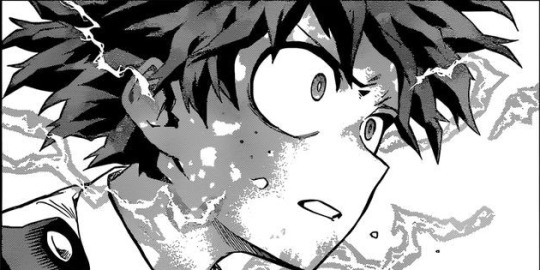
Midoriya still likely suffers from something akin to Impostor’s Syndrome - again, various hints have been placed throughout the manga/series itself. That’s not surprising.
Sir Nighteye’s dismissal of him wielding OFA was awful.
Sir Nighteye shouldn’t have a choice in the first place. That’s also what annoys me.
OFA is not his quirk...I don’t understand why he went and trained a successor for a quirk he can’t pass, for a quirk that isn’t his to decide. All Might isn’t the best teacher...but Sir Nighteye didn’t trust him, obviously. He didn’t trust the Symbol of Peace to be competent enough to find someone worthy.
That ‘someone worthy’ ended out being Midoriya. But Sir Nighteye still blatantly went ahead with this ‘great idea’.
Sir Nighteye as a character does improve - by the end of the Overhaul Arc, we know he has come to terms with Midoriya - has spoken about him, ect. But the fact he gets killed off right after still left the sour taste in my mouth of his first introduction.
Not to mention his quirk; I understand that Sir Nighteye was frightened by All Might’s death, but doesn’t his quirk allow him to show the future? They could’ve looked to see who All Might chose; and they could’ve risen that successor together.
All the hardship and bitterness could’ve easily been avoided.
And now, y’all, lets go through the current canon events and dissect how everything would’ve turned out if Mirio had gotten OFA instead;
(leaving off from the standpoint where Midoriya still saved Bakugou from the sludge villain, but was never offered OFA)
The Entrance Exam: Uraraka possibly would’ve been seriously worse off than in canon. We don’t know if the teachers would’ve stopped the robot in time for nothing serious to occur - since no one would be there to punch the robot.
Quirk Assessment Test: not terribly bad, but a student possibly would’ve been expelled - even several.
USJ: At the very least, Tsu and Mineta would be dead. Aizawa and All Might would also possibly be dead, and perhaps even other students. The League would’ve been much more successful, and the media would be even more down UA’s throats.
Sports Festival: Todoroki maybe wouldn’t have indulged to anyone about his backstory; he would’ve gone on to use only his ice. I don’t believe many of the other students who he’d consider ‘strong enough’ would try to encourage him like Midoriya did during their battle. It’d also be safe to say that because of this, he wouldn’t visit his mother afterwards.
Hero Killer: Stain: Due to Midoriya not interning with Gran Torino, and seeing as the events with Tensei would still occur, Tenya would still go after the villain with revenge. It’d likely that both he and Native would die by Stain since there is no Midoriya or Todoroki to intervene.
Final Exams: Nothing too terrible happens here - but its likely that Bakugou would be off worse.
Training Camp: Bakugou and Todoroki, perhaps even more students would’ve been kidnapped by the League. Kouta likely would’ve been killed by Muscular, and still would’ve hated heroes.
Kamino Ward: AFO vs All Might still occurs - but the outcome very well could’ve ended differently. The League might’ve gotten away with the students they kidnapped, and All Might might lose due to the fact he was holding back due to Bakugou in canon.
Provisional License Exam: Again, not that bad - some of the students might’ve not passed alongside Bakugou and Todoroki. If Toga still sneaks in, she either would’ve gotten no blood or the blood of someone else.
Overhaul/Internship Arc: Very possibly Eri might’ve never been saved. The prophecy with All Might not be twisted. Sir Nighteye still might die...and Mirio could’ve still, very likely, gotten shot. Where does that leave him? Probably without both his original quirk and One For All. The villains would win.
And that’s only if UA still remained open after earlier events. UA would be at the very real possibility of closing after the events of the USJ, allowing at least two students and possibly one or two teachers to die.
Midoriya, as a character, has made such an impact that the storyline would be vastly different. Several characters changed for the better because of his presence in the storyline with OFA. So many characters had the real chance of being badly hurt or killed if Midoriya hadn’t interfered in some way, shape or form.
He can’t interfere if he doesn’t have OFA.
Midoriya possess more of a hero’s ideals than Mirio when it comes to several,,, things in general. Mirio doesn’t really possess what Midoriya does, and would almost feel like an All Might copy.
Midoriya is truly working to make this quirk his own...Mirio would’ve had a better time, but we never would’ve seen the struggle our lovely green protagonist went through. The pain, the blood, the tears...Mirio wouldn’t have that - at least, not to the same extent.
And that is why Mirio doesn’t suit being the MC, or being the holder of OFA.
#bnha#mha#boku no hero academia#my hero academia#mirio togata#sir nighteye#all might#midoriya izuku#one for all#meta?#my thoughts are a mess sorry if this post isnt easy to read#lemillion#big three#queue
31 notes
·
View notes
Text
Harry Potter and the Cursed Child: Thursday 23rd May, 2019 [Pt. 2]
Aaaand here we are again! To say I was excited for this part two would be an understatement. I was bouncing off the walls and honestly? They did not disappoint. This was another great show from what’s already an excellent cast. If you’re not excited yet, you will be.
ACT THREE, SCENE THREE: DRACO’S OFFICE
Jonathan got so angry in this scene and it just took it to another level. I want Scorpius to be that angry. To fight it. To fight for him. His dad isn’t this person and I need him to reject it. it’s so important for both this version of Draco and for Scorpius to process about his dad in general. Plus it’s wildly fascinating to see Scorpius be so smiley and awkward and fail so completely at being the Scorpion King in the previous scenes, just for him to then lose himself in these life long fears and let his emotions take over him in this one. The way he reacts without thinking and attacks is more in line with the Scorpion King. (Presumably.) Yet he was only able to ‘achieve’ it when he wasn’t trying. It makes you wonder how much of the Scorpion King is actually inside of him... (Obviously not a lot, or at all. But it makes for an interesting discussion.)
ACT THREE, SCENE NINE: AU DEMENTORS
My heart broke for Michelle who didn’t manage to get herself hooked onto her dementor and had to walk off stage instead. It’s only happened two or three times (as far as I’m aware) so for it to happen to her on her opening night was just awful. I really hope she doesn’t let it get the better of her. After all, she wasn’t the first and she won’t be the last. These things just happen, you know?
I’m only mentioning it now because I thought people might want to know what happens in this situation:
Basically, two people in black cloaks with hoods up come on. One is stood in front and holding the cloak out to block your view as they wave it in what presumably is meant to be in a dementor-y kind of way, while the other focuses on hiding Hermione (or Ron) as they walk off the stage. It does the job but I do wish their cloaks had been modified dementor costumes instead! At least that way it still looks like they’ve been taken by dementors rather than it being an obvious failure.
I’m still being blown away by Jonathan and I could not be happier. His Scorpius is still the same, but the subtle changes from just having that different energy on stage really brought out his A game. I particularly loved his interaction with the dementors in this scene. It could just be because I was sitting closer than usual so I could actually hear the wispy gasps he was making as he struggled to catch his breath, but that combined with how he made his body loose and slow and floaty as the dementor attacked was just incredible. (Although maybe I’m just biased because you know the dementors are my favourite. These scenes are important to me.)
ACT THREE, SCENE ELEVEN: SLYTHERIN DORM
“I know. Okay.” - I loved the anger from Albus in this line. I can’t even begin to describe to you what he does with his face when his anger peaks like this. But it’s concentrated and scary. He’s furious. It’s brilliant.
Albus never moved from the spot he was in, round the other side of the bed to Harry. It meant it was always between them. Fitting really, given how they once again fail to overcome the barriers that separate them.
ACT THREE, SCENE TWELVE: GODRIC’S HOLLOW DREAM SCENE
I absolutely adore what Kathryn did with Petunia this scene. The pauses and emotion in her voice as she recalled Lily (“she tried - bless her - it wasn’t her fault) came as a surprise but was also completely welcomed. It reminded me of that deleted scene from the movies. The one where she’s talking to Harry in the living room and she says he didn’t just lose a mother that night, she lost a sister too. It was beautifully done. Plus getting to see this glimpse of that side of her, a part she’s clearly kept hidden for years, was wonderful. It really made me sit up and take notice because I expected to get nothing but a reminder of how awful she is in scenes like this. To suddenly be hit with the realisation there’s more to her than ‘villain’, that there’s human and heart in there somewhere, was vastly more compelling to watch.
ACT THREE, SCENE TWENTY: THE MAZE
“Your dad loves you, very much” - The second time he said this, it felt rushed and he sort of let it drift off towards the end. It was obvious he felt awkward even having the thought, let alone saying it out loud to Cedric. I like that because it says something about him since he did still say it. It wasn’t the heartfelt message we’ve seen from Albus’s before, but it still shows his heart and this Albus’s awkwardness.
ACT THREE, SCENE FOURTEEN: SLYTHERIN DORM
Albus held his hands up and did a ‘I could strangle you’ kind of gesture at Scorpius, who was paying zero attention, and it was very them.
“You may not have been there, Albus, but you were fighting - fighting alongside me.” - Albus looked so happy and moved by this statement. I swear he said something or went to? I can’t remember for sure. But he definitely reacts to this confession more than any other Albus I can recall and I’m super happy about that. He liked the idea he was there with Scorpius and fighting together. It was sweet.
ACT THREE, SCENE SIXTEEN: OWLERY
We’ve finally got the ‘let’s make history’ line, wooo! I love that this Albus gets it too. It really suits him. If any of them would deliberately set out to make such a bold change in the world, it’s this one. Dominic delivers it with such energy too. It’s perfect.
ACT FOUR, SCENE THREE: GODRIC’S HOLLOW
Albus, of course, immediately runs off after Lily and James as they exit the stage. He isn’t thinking, he’s feeling and following his heart. (I really do love this scene.) Scorpius is quick to run after him and he grabbed his wrist and pulled him back and didn’t let go until he’d stopped and wasn’t a flight risk anymore. I liked that because, after all their awkwardness about touching, he didn’t hesitate in moments when it mattered.
ACT FOUR, SCENE FIVE: GODRIC’S HOLLOW PLANS
“Still, if I had to choose a companion to be at the return of eternal darkness with, I’d choose you” - As soon as Scorpius started this line, Albus immediately began to look a little bit uncomfortable. It was like he suspected what was about to be said, or he at least thought he did, and was nervous about it for some reason. There are so many ways to read into that and I love it for that reason. But for me, it related back to his reaction in Hogwarts through the trees. When Scorpius said he wanted someone like Harry Potter to get up to mayhem with, Albus looked sad. Like he almost expected a comment like that. So it makes sense for him to expect Scorpius to want Harry Potter, the saviour and everyone’s hero, in this moment too. But once again Scorpius surprises him (and only him) and tells him he’d choose him. Again. Always. Basically, it was really sweet and it was also interesting to see this Albus doubt himself with Scorpius again despite already having numerous reassurances.
“We just need to work out where to find some… Demiguises.” - His pause, which is actually in the script and I had completely forgotten about, was adorable (and relatable) because it was like he wasn’t sure how to pronounce the word. Bless.
ACT FOUR, SCENE SIX: ALBUS’S ROOM
“We’re starting with Dad” - The stage direction says his firm here and this Albus absolutely is. His tone and the look he gave Scorpius left him with no doubt that this was no longer up for discussion. They were starting with ‘dad’.
ACT FOUR, SCENE EIGHT: GODRIC’S HOLLOW HUGS
Even with a new Potter around I still could not take my eyes off the Malfoys. I think the audience were in agreement as the awwws that filled the theatre warmed my heart. My favourite part though? After they had hugged, Draco cupped Scorpius’s cheek and gave him this look full of love. I couldn’t see Jonathan’s face today but they did this on Sunday too and you’ll be happy to know Scorpius gave him the same look back. Now doesn’t that just melt you?
ACT FOUR, SCENE TEN: ST. JEROME’S
“Draco, trust my dad. He won’t let us down.” - It was really interesting to have an Albus move to stand directly in front of Harry and not Draco for this line. It felt less like a confrontation with Draco and more like him standing up for his dad. That says so much about Albus. One, that he’s probably smart enough not to piss off his best friend’s dad and risk them being separated again. And two, it’s like he’s giving something back to his dad in return for Harry’s ‘there’s plenty you’re good at’ line. Neither of them are there yet but they’re reaching out to each other and working together at this point. It’s nice. As was Harry’s face when he looked from the back of Albus’s head and over to Ginny and back again as Albus spoke. You could see how moved he was by Albus’s words and actions. That really meant a lot. It was lovely to see Harry have this silent conversation with Ginny about it too. It mirrored their silent conversation back in act one over the map table. That was about Albus too. But this time it was finally about something positive.
ACT FOUR, SCENE ELEVEN: ST. JEROME’S
“I really liked her, mum” - I was either too overwhelmed with all the new things to really pick up on it or maybe Dominic emphasised it more in part two, but I really picked up on more of his Albus’s mannerisms this time around. Like here, when he’s sat on the bench with his mum, Albus is sat with his shoulders a little hunched and one of his feet is on top of the other. He looked a little smaller and a tiny bit uncomfortable and a lot awkward. I think he was doing something with his hands too...
You know what? Let me just drop some random observations on you that I’ve made about his Albus so far: occasionally hunches his shoulders, will sometimes play with his hands and fingers just like Scorpius - they’re the definition of awkwardness when they’re both doing it together, he rocks back and forth from one foot to the other all the time - it makes him appear nervous and full of energy and I love it, and he never hesitates to raise his voice and won’t hold in his anger. As for the closest interpretation from our previous ones? Sam Clemmett, but Dominic is less restrained and happier.
I said my goodbyes to the unscripted Albus and Scorpius hug in this scene on cast three’s last show. Little did I know Jonathan and Dominic would still bless us with something. While it isn’t a full blown hug, the fact that they still run to each other and physically reach out and make contact as soon as the duel is over is the most important bit and it still happens. I also loved the fact Scorpius didn’t want to let go or stop looking at him and didn’t do so until Ginny had made her way over to them. He then seemed to accept he’d be safe and that his mum might need that reassurance he’s okay too.
Albus tightened his grip on his wand as soon as Delphi said ‘then kill me’. He didn’t raise his arm so his wand was still down by his side, but the fact that he held onto it so tightly at those particular words was interesting and it explained his next reaction. So when Harry says he won’t, Albus immediately bolted forward. Harry had to hold him and used enough force that he made Albus’s clothes all bunch up around his shoulder and neck from where he had to be pushed back. I’m pretty sure even Ginny stepped in and helped contain him. I really hope this stays because I want to see it over and over again. That pure determination and anger. The fact that it took fully grown adults to hold him back. Also! The two Malfoys as they watched Albus in this moment was something else. They were both clearly a little shocked, but Draco in particular seemed to be looking at Albus like he hadn't seen him before. It’s wildly fascinating. Plus the whole thing reminded me of Sirius Black’s death in the movies. How Harry is restrained and then let loose but is still unable to kill Bellatrix even though he’s so incredibly angry and has the chance. It gave me a whole new understanding of Harry’s later line: ‘you’d watched her murder Craig, you were angry, Albus, and that’s okay. And you wouldn’t have done it”. Because Harry isn’t just speaking as a reassuring parent here, he’s speaking from experience. That’s how he should be using his past to help his son.
ACT FOUR, SCENE TWELVE: DEATH SCENE
Albus reached out and held onto Harry’s arm with both his hands as the Potters were killed. Then once Lily had been murdered and Harry fell to the ground with a cry, he reached down and held onto Harry’s wand with him. It read as support in so many ways, and so differently to how Joe’s Albus handled the wand. Joe would take it from Harry’s hand completely and replace it with his hand while holding the wand in his other. To me that read as confirmation that love was stronger than magic. Because that’s what Harry, in every timeline, always needs in that moment. Love. No spell can fix or save this. But now you have Dominic’s Albus who appears to help Harry keep hold of his wand. Yet that to me still represents love as I see this as them finally coming together. Getting through this moment, through his history, together. It’s the end and the start for both of them.
ACT FOUR, SCENE FOURTEEN: HOGWARTS STAIRCASE
I honestly don’t know how to describe their last hug. I’ve overused the word awkward but there really isn’t any other word to describe it. It was just all hands. They didn’t seem to know where or how to touch each other. It ended up looking like they were both doing the big fish, little fish, cardboard box dance around each other. Yet miraculously, this strange air patting thing they were doing somehow seemed to work for them. No one is surprised...
ACT FOUR, SCENE FIFTEEN: GRAVEYARD
I was feeling a lot of things during this scene so very few mental notes were taken. But I do remember how Albus looked a little bit horrified as he looked down at all the gravestones. He didn’t seem to be particularly happy or comfortable being there. Understandable. But that didn’t stop him from walking over to Cedric’s grave when Harry started talking about him. It was like he didn’t have as much to fear if he had his dad with him. It was a really nice way to end this journey. That, and their hug. Although I was terrified for a second that they had cut it because the lights started to dim before they had even started. It was such a shame how little we got to see it before it was too dark!
Other little changes and notes:
The light in the Time-Turner was a different colour! There was the normal yellowish orangey light, and now it’s also blue sometimes. I can’t recall exactly which colour it was for each scene but I’m sure there’s a reason as to why it changes and when. It’s probably something to do with when and where they’re using it in time but until I’ve seen it again I won’t know for sure.
You know when Ginny removes the light bulb from the wall in Delphi’s room? Well now there’s a pulsing, glowing blue light inside and it emits thick smoke. I actually really liked this. It gave the illusion there was something more beyond that wall. Something sinister.
I also just have to mention all the eyeliner. So Snape now has this really obvious (and questionable) smokey eyed thing going on, Delphi is wearing so much of it she gives me Megan from Puffs vibes (particularly pre-reveal), and even Bane seems to have been given a makeover.
And there we have it! If it isn’t already abundantly clear, I love this cast. Their new interpretations are fresh and it’s making the returning cast members step up and everything has slotted into place wonderfully. I said this yesterday and I mean it even more so today: this next year is definitely going to be a good one.
[Again, there’s so much I’ve missed out but I’ve run out of time and memory. I am seeing the show again on Saturday 25th though so hopefully I’ll pick up on the things I’ve missed then. Please feel free to leave any specific requests for scenes in my inbox. I can’t promise to answer them all but I can try!)
#harry potter and the cursed child#TCCleanne#long post#mypost#it's now 2.30am so the fact you're getting words at all is a miracle so please excuse any and all typos#I promise I can actually write like the educated adult that I am! :')
39 notes
·
View notes
Text
A Guide to Writing PTSD & Psychosis
Something I’ve noticed over my (too many) years on Tumblr is that sometimes, first-hand accounts of mental illness can be hard to come by. It’s totally understandable, and it took me a long time to get to this point, but it can put writers in a bit of a bind who aren’t satisfied with only the DSM-5 and Wikipedia to accurately portray their muse(s)’s MI. That being said, hi, my name is Holo, and I’ve been living with PTSD and comorbid psychosis for almost a decade at this point, and I’d like to share some of my experiences.
This is by no means a complete or exhaustive guide. The thing about brains is that apparently they’re complicated, and that means that everyone develops MI differently. While there are broad strokes that are generally consistent across diagnoses (and said broad strokes are typically what make up the ‘criteria’ of any MI), not everyone will have every single symptom, and not everyone will display the symptoms they do have the same way. I really do recommend using these sorts of guides as guides to writing MI, rather than actual rules.
I’mma start with some basic definitions. PTSD is post-traumatic stress disorder, which is a disorder that develops after witnessing or experiencing a traumatic event. Not everyone who goes through trauma will develop PTSD, and I believe the actual statistic is somewhere between 20-30% (double-check my factcheck before you quote me on that, please). Comorbid mental illnesses (or comorbidities) are MIs that occur with or alongside the ‘primary’ illness, usually because of said ‘primary’ MI. For example, my psychosis is comorbid with my PTSD; it is because of my PTSD that I have psychosis.
Psychosis itself is more of a broad term than a specific diagnosis, and it will generally assume one (or more) of three forms: 1) delusions, 2) hallucinations, and 3) disordered thoughts. I personally struggle mostly with delusions and hallucinations, and I don’t particularly experience disordered thoughts, so that’s what I’ll mostly focus on.
Before I move on, though, I want to share something that an old psychologist of mine told me and that I’ve never really forgotten: it’s possible, and even common, to experience and exhibit occasional symptoms of MI without ever actually having that particular mental illness. A random delusion or general panic attack does not mean your character has psychosis or PTSD. Again, brains are complicated, and what defines a MI diagnosis is the consistent, pervasive presence of multiple symptoms that interfere with the patient’s day-to-day life. You can have obsessive-compulsive tendencies without having OCD. You can be anxious without having anxiety. You can be depressed without having depression.
Another thing is that a lot of MI have symptoms that overlap (which is why comorbid MIs are, again, pretty common). My PTSD comorbidities include depression, anxiety, claustrophobia, and psychosis. In fact, when I first started displaying my PTSD symptoms, I was diagnosed with depression because that was the comorbidity that showed up most prominently at the time, and it took several more years before my doctors and I realized that my depression was a symptom and not the full illness.
Alright! Let’s see if I can break down things into more manageable chunks to talk about.
PTSD
PTSD symptoms are wide, varied, and incredibly subjective from person to person. In my experience, this variance starts with what exactly was the trauma that the PTSD is originating from. Someone who was in a war, for example, will have different triggers and experience different symptoms than someone who was abused (and even then, someone who was verbally abused will once again have a vastly different PTSD experience than someone who was physically abused). Figuring out what your character’s trauma was that caused them to develop PTSD is your vital starting point.
In my experience, PTSD tends to develop slowly. One of the things doctors look for when diagnosing PTSD is that patients are still suffering after six months have passed from the initial trauma. After my initial trauma, I thought I was fine. I was asymptomatic, until months later when symptoms started to creep up on me (and as I mentioned earlier, at first it appeared primarily as depression, and I didn’t even connect it to my trauma at the time).
I experience hypervigilence with my PTSD. I am always aware of where I am, looking for possible exits and escape routes. I get nervous and anxious if I feel trapped in a room or area. (I tried going to a corn maze once. It was a bad time.) I also have an exaggerated startle response. If someone sneaks up on me, accidentally or otherwise, I’m going to react much more dramatically than other people. It’ll frighten me a lot more than it would someone whose startle response isn’t so pronounced. At worst, I’ve had experiences where someone sneaking up on me and startling me as a joke sent me into a full panicked meltdown. (I’d been having a rough time before that, but it was the straw that broke the camel’s back, so to speak.)
To which I’ll segue rather smoothly into things building up! I find it really difficult to ‘destress’ and relax if I have a lot of small triggers and uncomfortable situations pile up on me within a short period of time or without respite, to the point where something rather minor can set off an entire chain reaction and end up with what looks like an extreme overreaction.
Panic attacks can look different from person to person, or even day to day. Sometimes, panic attacks show up for me as in inability to focus, irritation and snapping angrily at every little thing while my hands shake to the point where it’s difficult for me to hold things. Other times, it’ll look like a screaming, crying mess, huddled up in a ball in a corner on the floor. How people express panic attacks varies greatly, and no one way is an ‘incorrect’ portrayal of your character’s panic attacks.
Flashback episodes are an easy, prominent way to showcase PTSD in media, and so it’s something that a lot of people are familiar with, but in a very narrow way. While it’s possible for someone experiencing a flashback to completely lose touch with their current reality and experience an exact repeat of their traumatic incident, that’s rarely the case. More often than not, my flashback episodes feel more like an overlay, where both reality and my flashback are happening at the same time. Innocuous things will suddenly seem much more ominous and dangerous, I’ll mistake the people around me for those who were present during my traumatic incident, and I tend to experience hallucinations (which I will go into more detail about later on). Someone in a flashback episode could even experience age regression, usually back to the age they were during the initial trauma. Flashback episodes and how someone experiences them are extremely personal, and I strongly suggest doing more research on the topic to find more varied accounts, and piece together how your character would respond to these events, if they even experience flashback episodes at all.
I’d like to take this next moment here to mention triggers. Triggers are highly subjective, depending on the person and their trauma, and they can often be obscure and strange. A particular scent or a familiar name could easily be enough to make someone extremely uncomfortable. Sometimes, triggers are only marginally connected to the initial trauma, or not seemingly connected at all. Conversely, something that might seem like an obvious trigger might not be a trigger at all! Brains are fucking weird like that. Also, a very common experience with PTSD (or any MI with triggers) is that day-to-day life is disrupted in favour of specifically avoiding known triggers. Crowded places will trigger my aforementioned claustrophobia, and so I will often avoid social outings, to the detriment of my friendships and familial relationships. (Which is a good example of triggers having nothing to do with trauma, actually. I was alone when my initial trauma happened. Why the hell am I afraid of crowds. @brain explain this) And not only this, but some days a trigger might not affect me at all! Triggers are so, so subjective. They’re a minefield of possibilities and dangers that can shift on what sometimes feels like a daily basis. It can be a real headache to deal with. Taking the time to get into the mind of your character and deciding what triggers them and what doesn’t it another important part of defining how you write their struggle with PTSD.
Psychosis
Since it’s what I have the least experience with, I’ll talk about disordering thinking first. Disordered thinking is pretty much exactly what it says on the tin, and people experiencing disordered thoughts can appear distressed, confused, and have issues articulating their emotions, even to the point of not being able to form full sentences or fully acknowledge questions being asked of them. I strongly suggest doing more research on this topic outside of this post if you think it might apply to your character.
Delusions are, again, fairly self explanatory. Delusions are probably my most prominent version of psychosis that I struggle with on a daily basis. Personally, the most frustrating part of delusions is that I’m well aware that they aren’t real, but I can’t shut them off anyway. In general, my most common delusions is that Person X is out to get me/is trying to sabotage me. Logically, I know that this is ridiculous, but I still have the anxiety and panic that that situation would induce. While I’m sure there are psychotic people out there who cannot distinguish their delusions from reality, and that is absolutely a valid way to portray it, I have personally never met someone like that. It seems to be a lot more common that delusional psychotics are aware that their delusions are not real, and yet we are still forced to change our patterns of behaviour to accommodate for that delusion as if it were real regardless.
Hallucinations are broad and come in way too many forms. Media likes to portray hallucinations as full-bodied apparitions that are indistinguishable from real life, and while that can be correct, I find that I rarely experience those. Most of my hallucinations are tactile hallucinations. These are hallucinations where I feel as though I’m being touched by someone or something, usually in a negative way (these hallucinations can even trigger or be triggered by a flashback episode). There are also auditory hallucinations, visual hallucinations, and even olfactory and gustatory hallucinations, although I’ve never had experiences with the latter two. Often, I find I can fairly quickly differentiate hallucinations from reality, just by doing a quick check around me. If someone is not touching me, the feeling of a hand on my arm is a hallucination. Visual hallucinations (of other people) tend to not interact with the rest of the world the same way a real person would. Auditory hallucinations do not have an obvious source, and those around me won’t react to the noise. And, of course, the usual disclaimer of everyone who experiences hallucinations experience them differently applies here too, this is just my personal experience with hallucinations.
In conclusion
PTSD and psychosis are both broad MIs with a lot of complexity that vary from person to person. I fully encourage you to continue your research into these MIs and discover what is right for your character(s). I’d like to reiterate that this post is non-exhaustive and has focused on my personal experiences with my day-to-day life as someone who has these MIs. This post is absolutely available for you to reblog if you’d like, and my ask box is right here if you have any questions or discussions you’d like to direct to someone willing to be a first-person source on these topics.
I hope I’ve helped! Now go forth and write! :D
88 notes
·
View notes
Photo
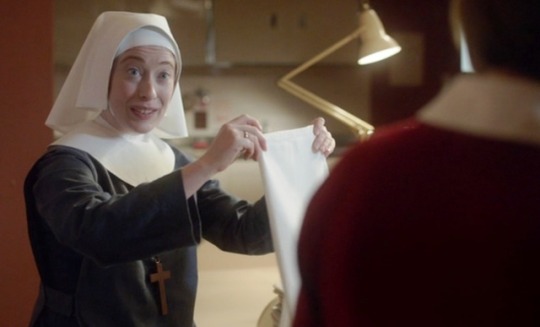
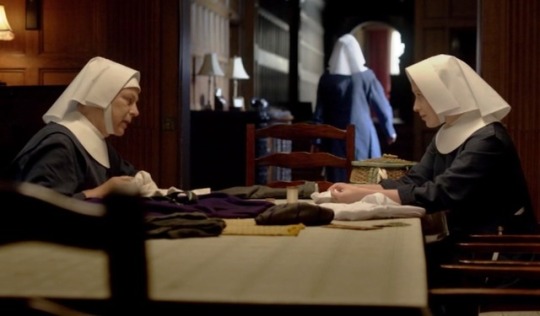
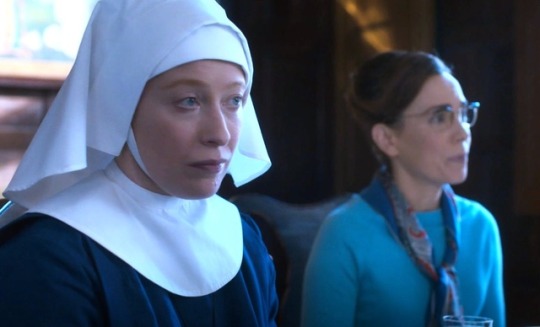
CtM Thursday Thoughts
Sister Winifred, Callings, and Obedience
It’s Thursday again, and time for more Thursday Thoughts. This week, I thought I’d further address a topic I responded to earlier about Sister Winifred and obedience. More thoughts follow:
So, over the years, many fans (including me) have pointed out how the show never seemed to really figure out what to do with Sister Winifred. She didn’t get a lot of lead stories, and there didn’t seem to be much of an arc for her. There were also questions raised by the Christmas special by some fans (on and off tumblr) about why she had to be a midwife when she could have worked at the orphanage all along. I was thinking and I noticed something–even though the show has been somewhat inconsistent with Sister W over the years, there’s one theme that has been espeically consistent with her, and that’s the issue with the vow of obedience.
First, though, I do want to say that I think the orphanage was probably a retcon (there wasn’t even as much as a hint before the CS that the order had an orphanage), although in the case of Sister W I don’t think that impacts this aspect of her story that much, because the issue of callings and obedience has been built into her character since she first showed up on the show. Her first major lead story, in episode 3x04, has her mentioning that, although she had been a teacher before, she became a midwife upon joining the order because that’s what all sisters in this order do. Still, even though she had the training, she didn’t have the “same joy as others” in the practice of midwifery. She kept up with it, though, and eventually found that joy through her working with the Moss family and Mrs. Rubin. That was only the beginning of her association with these concepts (obedience and calling), though.
Another key scene involving the vow of obedience happens in episode 4x06, and while the main speaker in that case is Sister Evangelina, it’s Sister W she’s talking to. Sister E talks about how for her, obedience is the most difficult vow and talks about having to go “where others believe you are called”. She also goes on to talk about the “joy of midwifery”, which Sister W has learned to discover but still, she will have issues.
I think in terms of joining a religious order, Sister E is right about the vows. A lot of people bristle at the vow of chastity, but both chastity and poverty are vows that are fairly straightforward. Anyone seriously considering joining an order that requires these vows will have a general idea of what they’re getting into before they join, and they join at least to some degree ready to make that sacrifice. Obedience is trickier, because while it may sound simple at first, it’s a lot more comprehensive. In fact, it encompasses the other two vows as well. Basically, a vow of obedience means that you’re giving up the right to decide basically anything about your own future. Your superior(s) tell you what you are supposed to do, and you are expected to follow that, whether you feel a natural inclination or not.
Sister W got to revisit the question of obedience and callings in episode 5x03 with the Dorothy Whitmore story. In that story, Sister W was ordered to take over Dorothy’s teaching post for the rest of the term while the school looked for a permanent replacement. In this case, even though she had started out as a teacher and had loved her job, Sister W didn’t feel right taking Dorothy’s job. Still, Sister J reminded her that she had taken a vow of obedience, and she took the job.
Over the years, even with the unevenness of Sister W’s arc, this point of struggling with obedience has been brought up in various ways–from suggestions of her sneaking out to the cinema, to dancing in the 2016 CS, and more. In the latest CS, she struggles even more openly, finally expressing her objection directly when she’s faced with an situation (the orphanage) of feeling a conflict between what she perceives as God’s calling vs the calling of her superiors in the order. It’s interesting that in the image I’ve used here, Sister W’s immediate reaction to Sister Mildred’s mention of obedience is framed with Shelagh also in the shot, because Shelagh is a contrast to Sister W here. Shelagh is someone who had made those vows once upon a time, but has since renounced them. Shelagh has seen both worlds, and wasn’t able to stay in the one (the religious life) because she felt a new calling that was stronger. In fact, Sister Bernadette used to be the show’s main focus character on the obedience/callings question but her resolution was vastly different to what Sister W’s has turned out to be. Shelagh isn’t bound to going “where others feel she is called” anymore, but Sister W is, and it’s a conflict because I don’t think leaving the order is an option for Sister W. Her issue is not with the religous life itself–it’s more with how to live that out, and what her vocation is within that calling. By the rules of the order, the Mother Superior makes those decisions and Sister W has to go along.
Now, who knows why Mother Jesu assigned Sister W to Poplar, but she made the decision and because of obedience, Sister W has to follow that. The question arises now on what Sister W would have done if the new superior, Mother Mildred, hadn’t changed the call. She would have had to obey. It’s difficult to really think about the implications of all of this, because joining a religious order has never been something I’ve seriously considered, although the concept has intrigued me from an outside perspective. As the story played out, though, that turned out not be be a question. I would guess that a sister can make her wishes known but the final authority is still not hers. It’s up to the Superior to decide where she thinks an individual sister should be assigned.
This idea was also reflected in Sister J’s story in this ep with the line (pointed out in @mg-bsl381‘s excellent post yesterday) of not being “allowed to want anything”. I do think there’s a degree of hyberbole there (she’s exasperated because she’s facing the idea of a call she does not want), because one of the things that makes the vow obedience especially difficult, I imagine, is that even if you may want something, you have to do what you’re told no matter what.
Getting back to Sister W–I’ll reiterate that I think this has been the most consistent part of her story since the beginning. She was a young schoolteacher who felt a call to the religous life and joined a midwifery order, so she became a midwife. Eventually, she got to follow a new call by serving in the orphanage, but she did find a degree of joy in midwifery in Poplar. I’m also reminded now that in the CS, her first response to Sister J’s announcement that they had to go back to the Mother House was “our work is here”. She had made peace with her call to work in Poplar, or at least she thought she had. And then she went to the Mother House and found a new calling, which was eventually affirmed by the new Mother Superior but ended up raising major issues about the vow of obedience in the process. We can sometimes learn a lot from having to do things we’re not orignally inclined to do–and to a degree, everyone has dilemmas like this. In the case of a religious order and actual vows, though, the dilemma is more pronounced. Sister W has been the primary example of this issue on the show since joining the cast, although others (like Sister J from time to time) have been confronted with this issue as well. Since vows and obedience are such central concepts in the religious life, I’m wondering how these issues will continue to be explored as the show continues without Sister W.
That’s all for this week. Next week, more thoughts!
29 notes
·
View notes
Text
Leo Fitz, Cedric Diggory, and the “Evil in another Reality” Trope: A Comparison
I’ve been trying to pinpoint exactly why DeathEater!Cedric in The Cursed Child infuriates and disgusts me so much, while at the same time I consider HYDRA!Fitz in Agents of Shield Season 4 to have been an interesting and memorable (while still upsetting) storyline. I think I’ve narrowed it down to three reasons – one major, two relatively minor. I was originally just going to post this as a couple paragraphs, but somehow it morphed into an essay? That I’m giving an overly-serious title and posting in the tags even though I don’t really want it to get much attention?
I’m aware these are both pretty controversial plot twists in their respective fandoms, and I’m just going to state here and now that I don’t want to get into any debates or arguments or “well actually”s about this. Everyone can have their own opinions, that’s fine, but I’m trying to lay my thoughts out so that I can make sense of them (and work through a bit of the discomfort I feel over seemingly having a double-standard between these two characters).
Looong post and Cursed Child negativity under the cut:
The major difference between these two plotlines, in my opinion, is the level of control the characters had over their actions. Yes, I know that AoS itself has been kind of pushing this whole “Fitz made his own decisions” thing, but … I just don’t buy that, both from what we know of Fitz and from the situation the writers themselves set up. I’m not saying he was brainwashed or mind-controlled like, say, Bucky Barnes, or Daisy in the Hive arc, but I think the reality lies somewhere in between. When AIDA and Radcliffe plug each of the characters into the Framework, they erase their greatest regret, profoundly transforming that person’s ‘life’ and personality in the virtual world. Right away their arcs are characterized by a lack of choice – it was never Fitz’s decision to keep his father in his life; it was Radcliffe’s and AIDA’s. One might say (and I think the show suggests) that, while that’s true, every decision that Framework!Fitz makes after that is his own. And yeah, that’s fair. But the important point is that Fitz himself had no say in becoming Framework!Fitz - so can he really be held accountable for his avatar’s actions?
We can never say with certainty that, in the real world, being raised by his abusive father would make Fitz evil himself. Yes, we see this happen in the Framework, but the Framework is a computer program designed by an evil, all-powerful magic book with a nasty tendency of destroying the morals and eventually lives of those using it. The persona of Framework!Fitz is what this program predicted Fitz would become in these circumstances – but since he himself has never lived through these situations, only experienced them through false implanted memories, one cannot claim to know how he really would have reacted. And moreover, while AIDA claims that she simply ‘adapted’ herself to the world created by the Framework, I have a really hard time believing that she didn’t have some hand in designing it. It would be too much of a coincidence for Framework!Fitz to become a scientist experimenting upon Inhumans/replicating their powers when all along AIDA wanted a body with Inhuman powers for herself. So I see Framework!Fitz as, at most, what Fitz could have been had things gone drastically different, but not necessarily what he would have been – and certainly not who he is.
With Cedric in The Cursed Child, none of these outside interferences exist. In the bad future, he becomes a Death Eater entirely of his own volition. This takes place within the normal Harry Potter world, albeit in a slightly altered timeline, not in a virtual parallel universe run by artificial intelligence.
Now for the two more minor reasons that Cedric’s storyline bugs me while Fitz’s doesn’t. While Framework!Fitz’s circumstances still do not excuse his actions, they explain his turn to the dark side much better than Cedric’s do. In the Framework, Fitz’s avatar has been raised not by his loving mother, but by his cruel, demanding, and ruthless father, in a world where HYDRA is the widely-accepted government. Being raised since birth in an environment devoid of morals and compassion doesn’t necessarily /have/ to turn out an evil person, of course, and it cannot justify their actions – but it at least serves as some sort of explanation as to how that person turned out the way they did.
In the bad timeline of the Cursed Child, Cedric has no such backstory. Nothing of his life is changed – his personality is still the same, his morals are still intact – until the point when he is humiliated in front of the school at age 17. The book seriously expects the reader to believe that a character who had been defined by his integrity, maturity, and commitment to fair play, who had a strong base of friendship and support from his classmates, and who was in his penultimate year of high school anyways, would have willingly joined a violent extremist cult simply because of some schoolyard teasing. At most, I could see Cedric becoming bitter and resentful of Harry, but there’s still a huge gap between ‘jerk’ and ‘murderous terrorist.’ And even in circumstances where he didn’t like Harry much, I still can’t see him not giving his all in the fight against Voldemort.
The final reason for my opinion lies in the way each of these two works treats the character’s turn to villainy. While Agents of Shield is a bit ambivalent on how much responsibility Framework!Fitz bears for his actions, everything becomes clear after Fitz has been freed from the Framework. We see the good, caring person we know and love return – and he is beyond horrified at what his virtual self has done. Throughout all of season 4C, a lot of time is dedicated to the fact that the characters cannot believe Fitz is capable of these actions. Once the cast gets back to the real world, he is treated with forgiveness and compassion by his fellow main characters and by the narrative itself. The gang makes sure he knows that they will stand by him no matter what.
Conversely, in The Cursed Child, there is virtually no emotional weight to Cedric’s betrayal. For an event that completely altered the fate of the Harry Potter universe, there’s amazingly little thought or care put into actually addressing it. It’s a throwaway plot point. Nobody acts like it’s a shock that Cedric could have done these things; nobody is personally affected by his actions in any way that relates back to him. Heck, we never even see him in the bad future! I get that Albus and Scorpius are the main characters and they obviously never knew Cedric, so I’m not expecting them to have had a huge reaction to it, but … something, on the part of any character, would have been nice. And the worst part is, when we actually get to see ‘real’ Cedric during the maze scene, he acts so laughably OOC that you could honestly believe he is the sort of arrogant, self-obsessed person to become a Death Eater over a minor slight! Everything about his story in The Cursed Child just screams of lack of caring, and honestly feels like a slap in the face.
So anyway, I think those are the basic reasons why I can accept Fitz’s arc but not Cedric’s. It’s all about the intent – with Fitz’s, it seems like the creators went in with great love for the character, trying to explore the idea of him being a vastly different person and how this would affect him and his loved ones. With Cedric’s, it seems like they decided to make him turn evil just so they could have a ‘bad future’ AU. I don’t think either character would willingly join HYDRA or the Death Eaters if they were free to make their own choices, but given the way everything is set up, I can accept Fitz’s turn (in the context of the Framework) but never Cedric’s.
I know that a lot of people were really disappointed by Fitz’s Framework arc – and that’s completely understandable. I’d be lying if I said I wasn’t shaken up myself; this post is in part my way of sorting through my emotions around it, even half a year after it happened. And on the other hand I know that some people were okay with Cedric’s arc in Cursed Child, and that’s fine, too! I’m glad if you could enjoy the story and get something out of it that I couldn’t. But these are just my opinions, and I’m not to challenge anyone with them or to have them challenged; I just want to put them out there.
As a final observation, maybe The Cursed Child itself is a reason why I’m okay with Agents of Shield 4C – because the “beloved character is evil in an alternate timeline/reality” plot was already done so poorly there that anything AoS cooked up would have looked good by comparison. :P
#Agents of Shield#Leo Fitz#pro Leo Fitz#Cedric Diggory#Cursed Child negativity#Cursed Child critical
10 notes
·
View notes
Note
Do you like Echo? I really want to now that she's a regular but I can't shake my wariness of her. It seems like she's constantly in the antagonistic role for our mains, but then she'll look sad for like 2secs and people will feel bad for her. But I don't. Do you feel me? Im open to her changing and growing with the spacekru, and I hope I like her character next season. But as of right now I don't understand the fascination some people seem to have of her.
An Egregiously Extensive Echo Essay
I’m gonna throw this wild analogy at you: Echo kom Azgeda is James Bond.
She is a dangerous, beautiful, ruthlessly loyal spy. She serves the queen (or king) and has to kill a lot of people. Fanatically loyal, always gets the job done. She gets captured, she makes allies, she lies to people, she gets friendly with the enemy and then later has to fight them or kill them to save her country.
bad difference: she doesn’t get to have smokin’ sex with the enemy officer (yet)
good difference: she feels actual, on-screen, sincere regret and anguish for deaths that she knows are necessary for her people but will nonetheless cause pain to someone she respects. I don’t think I’d personally seen a movie with genuine anguish from James Bond until Casion Royale came out.
So James Bond is a superhero if you’re British, but if you’re Russian or Communist or you work for a well-paying criminal mastermind, he’s basically like a horrific monster who kills your friends and blows up your factory and keeps your homeland from winning the cold war either militarily or economically. Either way, a loyal killer lapdog of the monarchy.
That’s Echo. If you look at where she’s coming from, even the fact that Bellamy helped her once isn’t enough to counteract the belief from her people and her queen that the Sky People represent an extreme danger to the clans and to Ice Nation. So they betray Lexa (who they see as an unfit conqueror anyway), and take out the enemy stronghold (Mt. Weather). To do that, Echo lies to a man who helped her once and saved her life. Yes, it’s a cruel and terrible thing to do. Yes, he’d be in his rights to hate her forever. But that doesn’t make Echo any less of a hero to her people.
((sorry this is getting long, so…. behind the cut))
The way I see The 100, the show goes to extreme lengths to show that everyone has motivations for evil acts. Most of the time, those motives start out “good” (such as self-defense, protection of community, stopping cruelty). In a few cases, it becomes evil when A) the harm done so vastly counterbalances any possible rational good (Dante), B) when someone is just a total sadist (Cage), or C) when ego and neglect and vanity cause the literal apocalypse (Becca/ALIE). Echo does not meet the standards of either A, B, or C. None of the major Grounder characters do (maaaaaybe Luna? !SQUIRREL!). Anyway, Echo, like our main characters Clarke, Bellamy, Kane, Jaha, etc… she’s done terrible things to protect and serve her people. I don’t hate or even dislike her character for that. She just is a character in this universe. And I certainly adore Bellarke, who have done as bad or worse than Echo for the same reason, so I can’t point fingers on the whole military actions thing.
We didn’t get to really know Echo until this season, and I think the show tried hard to put a lot of character building in while not forgetting about what they’d used her for in the past. They did an… adequate job. There’s definitely stuff that could have been handled in a smoother or more complex manner, but at the end of the season I’m generally satisfied with how they brought her into the regular cast. Weak episodes aside, there were several of her scenes I liked, and plenty of points at which I felt sympathy for her, just as you mention in your ask.
The biggest thing I had wrt Echo going into season 4 was “How is her relationship with Bellamy going to be handled?” Because I stan that guy, and she did him dirty. She did him as badly as Lexa did Clarke, except no one was there to intervene and save the sky people this time. I was pretty frustrated with their dynamic in the first half of s4, especially 401, because I thought their scenes really underplayed the anger that Bellamy ought to have been feeling. And then again in 405, their pivotal conversation didn’t feel successfully dramatic to me because I was just asking “WHEN IS BELLAMY GOING TO BE MAD ABOUT STUFF?” Like, Echo was a pivotal agent in a plot that got his friends and lover killed, she lured him into a potential bloodbath to disrupt a peace summit, she held a sword to Clarke’s throat, she mortally injured Octavia, and she advocated for war with Skaikru. Even if Echo was just protecting her own nation, it’s incomprehensible that Bellamy wouldn’t be angry that she used their past shared trauma to personally manipulate him. And then like, basically assassinated his sister.
For most of s4, I was like “????????” about how this was going, but that was more about Bellamy>>Echo than about Echo the character. Luckily, 410 went a LONG way to fix that for me. In 410, we finally saw Bellamy’s rage. I normally am not here for guys choking women on TV but in this unique case it felt really earned as a climactic fight. He almost kills her the same way they killed Lovejoy, the same way Murphy and then ChippedKane almost killed him. I cheered cause WOOOO DRAMA.Bellamy found out Echo was interfering and would try to assassinate his sister AGAIN, so he tried to kill her and his violence took on a form that is indicative of his lessons on the ground. We saw him finally let out that rage that was suppressed during their earlier encounters.
I’m glad he didn’t kill her, and she didn’t kill him, but I think they needed to come close. They needed that release, so the real forgiveness could come. We’ve seen Bellamy forgive–or at least live with–the people who tried to kill him or his loved ones before (Pike, Murphy, Jaha, Kane). Bellamy at his heart is a loving person who is damaged by anger, not made strong by it. Forgiving Echo at least enough to help her survive is absolutely in character for him at this point in the story. That’s what makes him a heroic protagonist. Being a protector is a core trait for both him and Clarke, and part of why they’re ultimately so compatible. Does that mean Bellamy could fall for Echo? Ehhh… They’re in a fairly unique situation and I wouldn’t take sex off the table. I think a delicate strange friendship will come about. But I highly doubt he’d actually fall in love with her. If I was shipping them, that’s a really complex dynamic to write a ton of fanfic about. As I’m not, I don’t care.
“Do you feel me? Im open to her changing and growing with the spacekru”
Anon, I have to say that nope, i do not feel you on this. Specifically, I don’t think she has to “change” if ‘change’ means to go from being a bad person to a good person. From the POV of her journey, she did the right thing by her people every step of the way until 410. The conclave was the first time she went outside her orders and did a dishonorable thing to save her people. Ironically, the Skaikru did the exact same thing that very same evening. A lot of people cheated at that event. But why it mattered to Echo’s character is that honor was the heart of her story–and it was honorable, to her mind, to kill in defense of her nation in s3 and s4. But when she let her fear and distrust drive her to break the rules of this (totally outrageous fucking bonkers) murder game, she violated her own honor. Roan came down hard on her for that, because Roan happens to care a lot about honor when it comes to fighting, I guess. Echo went too far in 410–just as Clarke and Jaha and Miller did. Just as Bellamy has before, as Lexa has before. She was punished for it, essentially ordered to die in a few days time.
I don’t look at Echo’s character and see a bad person who needs to learn to care about things–Echo clearly cared about a fucking LOT. It just wasn’t what our mains cared about. Echo did have to learn a lesson about when to have restraint, but then that’s what everyone on the show has had to learn. Other than that, her being in a antagonist role has been entirely a function of plot on the show. The plot was that she worked for the enemy. Otherwise, she is pretty similar to our heroes, only taller.
We did see, at several points this season, that Echo’s fierce loyalty to Roan and the Ice Nation caused her anguish when it came to betraying Bellamy. She was fully aware of what he’d done for her, and that between them personally he didn’t deserve to be so horrifically betrayed. To be a little callous, that’s more genuine visible remorse than we ever saw from Lexa or Pike or–check this out–Emori. As a viewer, I feel like we’ve been given enough material to see her position and to understand where she comes from. I’m content with her being in the main group. I think she’s one more interesting person in a mix of interesting characters who are trapped together in space.
I mean, I may have a bad reaction if we have to SEE her make out with Bellamy. Like, I hope I don’t have to see that. Otherwise, I’m cool with her on the show. I feel bad when she makes a face like a kicked puppy. I think making deep and meaningful connections with people outside her clan will enrich her as a character.
#echo kom azgeda#becho#bellamy blake#bellamy x echo#the 100 meta#roan of azgeda#the 100 season 4#ice nation#the 100#ask#Anonymous#i probably could have said that in like 4 lines instead of 1200 words#but this is me and i am verbose#you know that if you follow me#if you want a really controversial opinion#i think Emori has had to grow as a person since she was introduced#far more than Echo has#because Emori when we met her was living a completely predatory and murderous life#it took falling in love and learning to trust for her to change#and she has changed by opening her heart and learning to take care of others#Echo already loved people and her community#she just had to be plot positioned to be on the hero's side
141 notes
·
View notes
Text
Star Wars - The Last Jedi thoughts
So I saw it last night and I have mixed feelings. There were things I liked a lot and things I didn't like at all, but overall, I think it was mostly a positive experience to me. Like, I didn't regret seeing it, I never was really bored, even though I rolled my eyes a few times and had instances where I had to exchange a suffering look with my mate, when seeing something particularly dumb.
I liked it a lot more than Rogue One, that's for sure but then again, all the prequel movies were better than Rogue One, so not a high bar to clear.
The movie definitely did have problems but Rey being a "Mary-Sue" wasn't one of them. As with most times, that term is thrown out a bit too easily for female characters and I honestly doubt that most people using that term would have applied it to Rey had everything been exactly the same but her gender.
It just didn't really feel like Star Wars at times, not the way TFA did. I think in that regard, TFA was the better Star Wars experience.
Well, to the more in-depth stuff after the spoiler:
- I think one of my biggest problems though, that I have a bit of a hard time understanding the state of the galaxy at the moment and who exactly each faction is and how many factions there even are, because both new movies really did a bad job at explaining things. Who exactly is who? There is the Republic but that one was destroyed in the last movie, kinda, but do they have nothing else left? Then is the First Order the new faction that has absorbed the old Empire bits or is it a different entity from them? I would think the former but honestly, the first movie kinda implied that the First Order and the Empire Remnants are different things. Also, why is the Resistance so ill-equipped? Did nothing from the Rebellion/Republic remain? Weren't they kinda in control for a good while? Why and how is the First Order so massive? And why was the movie behaving as if the First Order was constantly winning? Sure, the Resistance lost a good portion of their fleet and the Republic planets, but their fleet was nothing to write home about anyway, about a dozen ships if you counted the bombers, but hell, the First Order lost 2 of their dreadnoughts, one massive fleet with more than a few star destroyers, their starkiller base and the fleet around that and their supreme leader. Since I don't know the scale of anything, I can't tell if these losses have been devastating or something not even worth mentioning. Was this a "darn, lost two dreadnoughts. Oh well, let's roll out our other 60" moment or a " FUCK! SHIT! FUCK! WE LOST 2 OF OUR 3 BIGGEST SHIPS!" moment? It could be either one, seeing the potentially unlimited resources and manpower the First Order seems to have. At the same time, whenever we see a planet that isn't any empty battlefield, the people on that planet never really seem to give a shit about what is going on one way or another. So what's the deal there? Are the people of the galaxy so jaded about the Rebellion/Empire conflict that they are so done with it that they are just living their life and hope they won't get hit? Who is in control of what? I don't know and honestly, I doubt even the movie knows. All I got is that the Resistance lost a good portion of their people, maybe, but they have allies sorta waiting and the way these movies treat these kinda things, those allies could be anything from a full-fledged fleet of destroyers to a few junk ships with misfits and cast-outs. Say what you will about the Prequels, but they did give the GFFA a tangible feeling of scale and life. We saw how things worked there, we understood how different kinds of people lived in different places in the galaxy. We knew who was what. Sure, people joke about the taxation and border politic stuff, but honestly, at least it gave us something. I kinda knew how people on various planets lived and felt about the state of the galaxy as it was, whereas I have really no clue whatsoever about anything in these movies, except that the First Order is evil. - And while TFA was way worse in the sense of how it used time, this one also had moments where the timeline was questionable, to say the least. The excursion to the gambling planet, while I appreciated the message they were going for and I did actually kinda like that, the gambling stuff itself was rather meh, it didn't really feel Star Wars-y. It was just a 20s-30s casino with an alien paintjob, which was disappointing. - The movie's humor was a bit obnoxious as well. Most of the shoehorned in plushies can die in a fire, as can the humor that came with them. I could tolerate those ice pokemon on the last planet but those furbies which you can no doubt buy for 9,99€ at some point with Chewbacca were just obnoxious and broke the illusion for me whenever we saw them. That one weird alien pushing coins into BB8 was just dumb, for example. In general it seemed to me there were a few inappropriate for Star Wars moments in it, but then i remembered the things Jar Jar and R2 did in the prequels so never mind. - I too feel that Luke got a bit shafted and I can see why Mark Hamill would hated these things. I have a really hard time believing, that even for split second emotional reaction, that Luke Skywalker would have considered decapitating his sleeping nephew who at that point hadn't done anything yet. Luke wasn't really supposed to be jaded at that point. He was willing to give his father a chance in the face of the Emperor and I have a lot of trouble that he would even consider walking up to his sleeping nephew with his lightsaber on his person, let alone draw it "in a moment of weakness". What I would have believed is that after the Kylo debacle, that Luke would have been tempted to kill Rey, sensing the same darkness potential in her that he saw in Ben before he turned. That at that point, a Luke who lost his faith, sense of self and was plagued with doubt and guilt, would be tempted to do such a heinous thing. And that Rey would wake up, and see him doing that and would have served as a similar point of her hero falling from the pedestal, only it would have made more sense, imo. But not a Luke who at this point was by all intent at a good point in his life with a new jedi order on the rise, the galaxy seeming okay, his family being okay and all, that that Luke would even for a second have the notion that killing a sleeping family member is something he should do. - Similar to the factions thing, I think I would have liked to know a bit more on Snoke. I guess that we didn't really need to know anything more than that he was basically the Emperor for all intents and purposes but I dunno, I felt he fell short of that. The Emperor was initially like Sauron, in that even as barely as he appeared in the first movies, he cast a long shadow on the Empire and we felt that it was his will and influence that drove things, that behind Vader was an even bigger threat. Didn't really have that with Snoke. - Rey being a nobody. Don't know how fair that complaint is, since it is mostly because I had liked the idea that she would be a Kenobi. I do like the concept that it is the Skywalkers fucking things up/fixing things in the galaxy and Rey having been someone completely unconnected to that was a bit weird. Like, I got what they wanted from that, and fair enough, but I felt a bit let down. Things that I did like: - I quite liked the characters. I like the new characters Finn, Rey, Poe, Kylo and Rose. Didn't really care much for the hacker guy. That whole side-quest thing and resolution with him was just meh. I liked the Vice-Admiral and the lesson/conflict she had with Poe. That clash of vastly different viewpoints and the lesson that there is a time and place for everything and that you can't solve everything with grand actions and risky gambles was actually nicely done and I appreciated it. -The old guard was really great to see again. The robots didn't get a lot to do and I am honestly disappointed with how they used Chewbacca as he seems to have resigned himself to just be a follower. I had hoped he would take charge at some point, like he would tell Rey and others what to do in certain situations but he wasn't really active. I guess him not being able to talk English/basic is kinda the reason but dunno. Luke and Leia were of course great and had such a great presence that they always stole the show. Their scene together was great. Leia's dynamic with Poe was interesting and compelling, as was the Luke and Rey thing. The Rey-Kylo dynamic was a bit...difficult. It wasn't bad, it just was, I found the change that Rey underwent with regards to her opnion on Kylo a bit unrelatable. She got sympathetic to him a bit too fast, for not good enough of a reason. Sure, redemption is a good thing to seek and probably the reason why Rey got so force chosen to begin with, being the thing that Luke is no longer, but at the same time, I felt a familial connection would have gone a long way to explain that better. Like, if they had gone with the Jaina-Jacen thing in the books, or even the family relationship to the Kenobi's or something else. I dunno, it wasn't terrible but for Rey it felt a bit like too fast of a jump, from "you're scum" to "we all make mistakes and it is not too late for you". I get that she had a vision but come on. I also quite liked the Rosa and Finn team-up. It was interrupted by a bit of a lame humor at times but the perspectives they shared were interesting enough. And not going to lie, i really liked Rose's sister and was rather sad she died, would have loved to see more of her. - maybe a bit childish but I really loved that they finally used the activating/deactivating mechanism meaningfully in a fight. That was pretty neat to see. And while I think TFA had the best lightsaber battle scene in the whole star wars franchise, the battle against the Imperial Guards was a pretty good one. The lightsaber fights all around are handled excellently so far, in both movies. A lot more visceral and brutal than the jumping around in prequels but also more impactful and exciting to watch than the OT, where it was always more of just a conversation between the characters. Which wasn't bad or anything but the new ones were that as well on top of exciting and raw fights. That said, weird that Kylo forgot his ability to freeze enemies/things in place, but maybe he was too emotionally torn to use his fancier force powers. - Luke being all badass. Every AT-AT unloading on him and him just walking out, completely unphased was such an anime moment, that I kinda loved it, cheesy as it was. The twist there, that Luke was projecting from his backwater planet, was rather interesting. The force in general is used rather differently all around. - I actually liked the Yoda scene, was a great moment and when i first saw him, I was prepared to hate it but honestly, really good use of the character. He didn't look horrible either. - the space battles were fun enough.
-Luke dying was a bittersweet moment and I expected to have a stronger emotional reaction but I was kinda alright with it, the way it was done.
That's as much as I remember right now, probably some other things that I might recall later on. But yeah, overall, I didn't love it but nor did I hate it. It had its many, many flaws but it also did a lot of things well, so, overall sitting on a more pleasant experience than a bad and boring one like Rogue One but I can't deny that I was somewhat disappointed despite going in there with the expectation that it would be horrible. Apparently I didn't, and believed deep down it would be amazing.
#star wars#star wars spoilers#the last jedi#star wars the last jedi#spoilers#star wars the last jedi spoilers
1 note
·
View note
Text
On Buffy and Faith
My girlfriend (@ruckafangirl - follow her!) asked me to write a bit about the relationship between Buffy and Faith after the two-parter I just finished reviewing. I can do that. I'll be doing a followup post after Angel's crossover story. I don't think it's a stretch to call Faith the most significant relationship in Buffy's life - more important than Joyce or Willow or Angel or Riley or even Giles. They have, thus far, drifted through one another's lives only briefly, but the way they've touched each other has changed them both to the core. They are sisters, lovers, twins, enemies... they switch bodies, and there is no discomfort, because they know each other in a way neither of them has ever known someone else, with the possible exception of Buffy and Kendra. To every generation, there is but one... but they are two. And one. From what we see, neither of them has any formal martial arts training before they are Called, no real experience in combat. I absolutely think Faith's been in some scuffles, but the sorts kids who get in trouble get into - drive a fist into a nose or slam a face agianst a table and it's done. Buffy's athletic experience, meanwhile, is cheerleading - a physically demanding activity, and dangerous, but it's not combat. Seriously, though, cheerleading IS dangerous. Like, on par with major contact sports dangerous. The work cheerleaders do is underappreciated and vastly undercompensated, and you should get on Google after you read this and learn about the way the major sports leagues treat their cheerleaders because it's a travesty. The point I was getting at: To be the Slayer isn't just to get a stack of physical gifts. It's not just strength and stamina and reflexes and speed and resistance to magic and illness. The Slayer, when Called, is changed on a mental and spiritual level. She learns martial arts - not at the point of being a grandmaster; if that was the case, they wouldn't need to train, but at quite a high level - from the Call. She gains the ability to sense vampires and dark magic. The Calling infects her dreams, turning them from a safe way to rest between days normal and traumatic alike and into terrifying prophecies of death and destruction and oncoming evil and apocalypse. As a champion of Good, the Slayer's mind is opened to the worst of Evil. There is no one else who understands the Slayer. How could they? From childhood - and a fourteen-year-old is a child, if one starting to grasp at adulthood - she is drenched in blood and the stench of the grave, her sleep interrupted by demons to the point that it is safer for her to be awake fighting them than to close her eyes. She knows what vampire dust, what grave soil, what demon ichor looks like, smells like, tastes like. She is Called, and she never knows safety again. How much must it have hurt, then, for Buffy to have met Kendra, made friends with her, found a sister in spirit and experience, only to have her killed? The episode where Kendra dies sells that as being a tragedy because of the lost chance for Buffy to take time away from being a Slayer, but she loses a sister there. Angel and Drusilla and Xander and Joyce strip her of the few people who she really relies on, really trusts, the people who understand the most about her, and that story is one of the most difficult in the series to watch. But when Buffy died, the Slayer line passed from her to Kendra, so Kendra's death passed it from her to Faith. And in Faith, Buffy found a second sister. One who could speak to parts of her that she didn't know existed. The lust between them is obvious - moreso from Faith than from Buffy, though that seems to be more from Buffy's straight-laced nature than from a serious difference in level of feeling. Then comes the Deputy Mayor's death. The death of a man who was on his way to offer help to them in stopping the next apocalypse. It is an accidental killing, an innocent caught in the crossfire of war, no more Faith's fault than the death of a young man killed by a vampire while Buffy was fighting the Master would be Buffy's. But... everything changes then. Faith's reaction to that is more immediately devastating, but no one reacts well. They are failed by the Council and by Buffy's friends, manipulated by the Mayor, and they betray each other. Faith's betrayal of Buffy's is deeper and more primal, but Buffy fails to stand by Faith, fails basic tests of empathy with Faith, and helps - with a huge, huge, HUGE assist from Wesley, who was the worst actor in the situation - drive her into the Mayor's arms. So by the time of the two-parter, Faith has tried to kill Buffy, and Buffy has tried to kill Faith. Faith has poisoned Buffy's boyfriend, and Buffy has killed the one real parent Faith ever had. They are sisters, and they are lovers, and they have done these things to each other. Could their hatred for one another be anything but all-consuming? Evil Angel told us about the power of passion in the well-intended but badly-assembled episode where he murdered Jenny. It's a running theme in the setting - passion steals Angel's soul, passion kills Jenny, passion saves Angel and kills him, passion and the urgent need to feel even its echoes brings people into reach of the burrowing demon. And Buffy and Faith's most passionate relationships are with each other. So of course, when Faith awakens, Adam is forgotten. Faith touches Buffy's soul; Adam is merely an unstoppable murder machine. But it's more than that. In season 3, it's clear how much each of them has that the other wants. Buffy craves the simplicity that Faith seems to live life with, the honesty. Want, take, have. The ability to have her power be something other than a burden. And Faith? She wants the mother, who she never sees the abuse from. The good Watcher who cares for his charge. The loyal friends. The ability, even for a moment, to relax, knowing that there are others around who will actually care for her. Here, for a brief time, they get those things. Well, Faith does, anyway - what Buffy gets is a huge pile of the consequences of the things Faith does, plus a reminder of how bull-headedly always wrong the Council is. Seriously, the last decent choice they made was hiring Ripper. Anyway, Faith gets the friends and the mother and the Watcher and the boyfriend, but all she can do is run, because that's all she's ever really known how to do, and getting those things doesn't change the life she's lived or the trauma she carries. She could trust the Mayor only becaue she knew exactly how he was using her; that Riley and Giles and Joyce and Willow didn't want things from her meant she couldn't trust them. But they are still the Slayer, still drawn as moths to the same flame. They are still sisters and lovers and cannot disentangle themselves from one another. It is their nature. Until one of them is dead, they'll never be free of each other. Even then, I expect the memory of the dead will haunt the living.
11 notes
·
View notes
Text
The Cult of “Face” in China | 面子
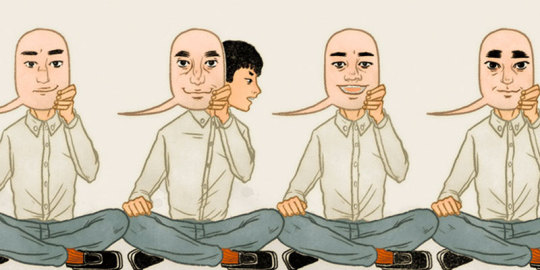
The Chinese concept of “face” (aka 面子 or miànzi) refers to a cultural understanding of respect, honor and social standing. Actions or words that are disrespectful may cause somebody to “lose face” while gifts, awards and other respect-giving actions may “give face”.
It’s a complex concept that is important to grasp if you want to really understand Chinese culture. Here’s what you need to know.
Of all the idiosyncrasies of Chinese culture, the concept of “face” is perhaps most difficult for Westerns to fully grasp.
Because “saving face” is such a strong motivating force in China, it’s also one of the most important concepts in understanding the Chinese Mind.
As we dive deeper into this concept, we’re going to cover the following basics:
Defining Face to a Western Audience
Cultural Context of Face in China
How to Operate within the Reality of Face
Tips for Giving and Receiving Face in China
The goal in the end is that you’ll not only better understand the concept of face in China, but you’ll also be able to see how it influences the way you relate to people and do business in the country.
How Do You Define “Face” Exactly?
As a sociological construct, the Chinese concept of face is difficult to define.
The famous Chinese writer and translator Lin Yutang (1895 –1976) even went so far as to say that “face cannot be translated or defined.” He did, however, characterize it as “…abstract and intangible, it is yet the most delicate standard by which Chinese social intercourse is regulated.”
The closest translations are along the lines of “pride”, “dignity” or “prestige”.
But these don’t tell the whole story.
Face-management is much more than just impression management (or “protecting and enhancing your ego”) in the Western sense. Of course, no one — regardless of culture—wants to look bad or have their ego bruised. But the Chinese concept goes beyond the narrow Western concept of face (and is perhaps closer to the Arab concept of “honor”).
It’s also worth noting that the concept of face in China is vastly different than the concept of “guanxi” in China. Although both are equally important to understand.
Comparing Western Ego vs. Chinese Face
Unlike “Western face”– which is more self-oriented and individualistic — Chinese face is more other-directed and relational.
In other words, it’s less about your own personal pride or ego, and more about how one is viewed by others. Unlike Western face, Chinese face can be given or earned. It can also be taken away or lost.
Chinese face can be given or earned…it can also be taken away or lost.
As a general sociological statement, Western cultures tend to focus on the individual as an independent, self-reliant being. In raising children, the focus is on helping them develop a strong sense of personal integrity and individuality (misbehavior is often blamed on lack of self-esteem).
In contrast, for some 4,000 years, Chinese culture has downplayed the concept of the individual—instead emphasizing the supremacy of the family and group.
It was all about bringing honor to your clan. With the emphasis on the collective, the sense of self blurred so much that it practically didn’t exist. In fact, individualism was seen as immoral.
The point is that Chinese face can be communally created and owned. In 2008 study Cultural ‘Faces’ of Interpersonal Communication in the U.S. and China, Yvonne Chang of the University of Texas explains:
“Deeply rooted in the Chinese concept of face are conceptualizations of a competent person in Chinese society: one who defines and puts self in relation to others and who cultivates morality so that his or her conduct will not lose others’ face. This contrasts with the American cultural definition of a person who is expected to be independent, self- reliant, and successful. The end result is that a Chinese person is expected to be relationally or communally conscious whereas an American person is expected to be self-conscious.”
Guilt-Based vs Shame-Based Cultures
Without digging too deep sociologically, suffice it to say that this social phenomenon of face has a lot to do with the teachings of Confucius. He taught that if you lead people “with excellence and put them in their place through roles and ritual practices, in addition to developing a sense of shame, they will order themselves harmoniously.”
Here we see that the flip side of gaining honor is avoiding shame.
Thousands of years ago, China developed into a shame-based culture. This is in contrast to Western cultures, which are more “guilt” or “conscience-based”.
Generally speaking, the Chinese “behave properly” generally to avoid shame and they fear losing face—not necessarily because they might feel badly about their actions.
For many, anything goes….as long as you don’t get caught!
In China, shame isn’t just personal feelings—again, it’s a relationship-based thing that serves as a form of social control. Any sort of family or clan-kinship shame is covered up.
This is also in stark contrast to the US, where airing your dirty laundry and private business on talk shows is seen as socially acceptable (in general, the Chinese aren’t big on updating strangers on their menstrual cycles via Twitter).
Ethics of “Face” in Relation to Truth
Western cultures tend to think in terms of “truth” and “rightness” (where being innocent and right is most important). Westerners are taught to respect objectivity and facts. The law applies equally to everyone the same and our behavior is something that should be directed by our consciences.
In the West, your honor or face is more about your personal integrity. We tend to admire the integrity of those who uncompromisingly face objective truth, regardless of how self-damaging the results may be.
In the US, you can admit and apologize for your shortcomings and gain respect for your honest efforts to learn from the past. Americans are generally forgiving if someone takes responsibility for their problems.
For instance, during his Presidential run, George W. Bush spoke openly about overcoming his addiction to alcohol. This is something that no Chinese official would ever do it—it would be a devastating loss of face and almost impossible to recover from.
In contrast, Chinese society has always functioned on basis of personal relationships rather than objective customs and laws. Indeed, the rule and laws laid down were often to serve those in power (and often arbitrary and ever-changing). Complicating matters, Confucian teachings say that you’re supposed to treat people differently depending your relative statuses.
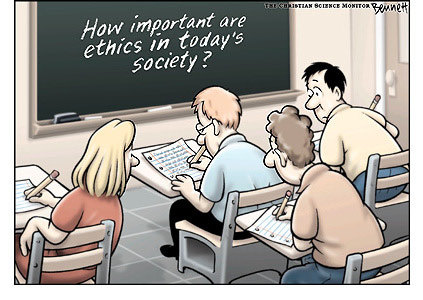
How important are ethics in today’s society?
As a result, Chinese “ethics” has never been based on universal principles of good and bad. Instead, they’re more based on the circumstances of the moment—a system that the West calls “situational ethics” (much to the chagrin of people doing business in China).
Similarly, the Chinese concept of the “truth” is not black or white either. The emphasis is less on always telling the objective “truth,” and more about what the situation and relationship calls for.
When it’s OK to Lie in China
In some ways, this helps explain the cultural differences on lying.
The Chinese will go through great lengths to protect face (their own as well as others). In fact, it’s perfectly acceptable to tell a lie—even a bald-faced one—if it serves to protect face.
China’s culture of shame doesn’t think of lies in terms of “right” and “wrong.” Instead, the goal of Chinese truth is often to protect the face of an individual, group, or even nation. In these situations, both parties can usually read between the lines and know when the “truth” is being re-packaged to help protect face (and they unfortunately will often assume that Westerners will know as well).
For instance, a hotel receptionist might tell you an obvious lie when he tells you that they don’t have any vacancies. This might be their face-saving way to avoid having to tell you that their hotel doesn’t allow foreigners.
Westerners often have a hard time with this. We don’t like to be bull-sh*tted. Our reaction is to call someone out on a lie. But in most cases, open confrontation is counter-productive, and will often result in denials or feigning ignorance.
So I’d recommend not backing your tour guide (or whoever) into a corner and calling them out if you catch them in a lie (it would be viewed as very rude, even cruel). In general, it’s a good idea to leave the Chinese with a way out of any potential face-losing situation.
Instead, if something goes wrong, always talk privately. Try to avoid assigning blame. And use the passive voice, as in: “IT seems as if there’s a problem.”
Flattery can often be very effective too: “I know this isn’t your fault but since you are very smart, what do you think we should do?”
Cultural Context to the Idea of “Face”
The concept of “face” in China is very much a cultural construct, therefore the best way to truly understand it is by seeing it within the context of Chinese society.
China’s “Super Girl Contest” Reality Show
For starters, we can look at the once hugely popular Chinese singing contest called Super Girl Contest, which is basically their version of “American Idol”.
Nearly half of the girls can sing English songs and the competition is just as intense as the US or UK versions….but their response to winning and losing tells us a lot about this Chinese concept of “face”.
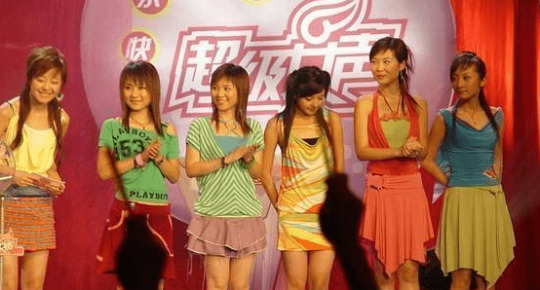
China’s Super Voice Girls reality show shows us a lot about the cult of face in China
Westerners will notice that a disproportionate amount of time of the three-hour show is spent with mutual emotional consoling by the singers, hosts and judges.
In fact, to protect against the shame of being eliminated, the show spends more time focusing on the losers rather than the winners!
And even though they had a version of the tough Simon Cowell in a judge named Wu Qixian, you won’t find him fighting with the other judges. Instead, it’s much more of a love-fest than American Idol—with everyone working hard to help protect face.
Unlike the “win-lose” zero-sum mentality of the US, Chinese reality shows and competitions also typically share the prize money.
For instance, in the 2006 show “Win in China” (the Chinese version of “The Apprentice”), the winner gets 10 million RMB. The runner up gets 7 million and the other three “losers” get 5 million each!
Chinese Idioms About “Face”
Illustrating the obsession with face-management, there are literally dozens of short sayings and proverbs, called Chinese Chengyu, that have to do with “face”.
These idioms give you some incredible cultural context into this idea of face in China.
“Men can’t live without face, trees can’t live without bark.” 人要脸树要皮 – rén yào lǐan, shù yào pí
“A family’s ugliness (misfortune) should never be publicly aired” 家丑不可外扬 – Jiāchǒu bùkě wàiyáng
“Face-Saving project” 面子工程 – Miànzi gōngchéng For example, “That new expensive airport is just another face-saving project for local officials to suck up to their bosses.”
“Blacken one’s face” 往脸上抹黑 – Wǎng liǎn shàng mǒhēi For example, “He blackened your face to get you back for what you did.”
A traditional insult is to say that someone “has no face”. 没有面子 – Méiyǒu miànzi
Similarly, one of the worst things is to “lose face”. 丢脸 – Diū liǎn
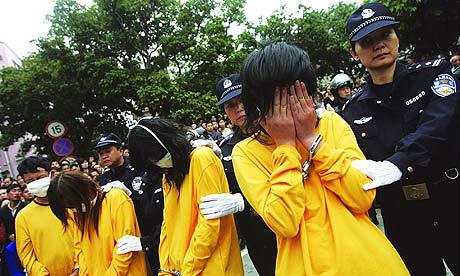
Walk of Shame: prostitutes in “shame parade”
How to Operate within Chinese Face
So now that we understand how to define face and what it means within the context of Chinese culture, the next step is more actionable.
How can we make sure that we “give face” to our friends and colleagues and minimize the risk of “losing face”? Here are a few thoughts on how to operate within the reality of face in China.
How to Gain or Lose Face in China
Warning: Don’t treat this concept of face, or “mianzi”, too lightly. This is especially true if you’re doing business or spending a long time in China.
Foreigners working in China (who don’t appreciate the full cultural importance of face) often complain that their Chinese counterparts are “too sensitive” about being offended or having their feelings hurt.
Similarly, many ex-pats in China—as well as other Asian countries such as Japan, Korea, Thailand, Singapore—can tell you stories of how their local friend suddenly stopped talking to them (probably because they somehow caused them to lose face).
And from the Western perspective, it is true—the Chinese are generally more sensitive to any perceived slights having to do with losing face since it’s so ingrained in their culture. This thin-skin is largely a product of culture that has valued social harmony as the prime rule (and generally avoided criticism).
In the West, many of these slights are seen as minor and quickly forgotten. But in China, failing to appreciate face can cause serious problems.
While an American businessperson might be respected back home for his frankness and being a “straight-shooter,” he would likely be viewed in China as uncultured, overbearing, and rude.
For instance, an American subordinate attending a meeting where his boss is presenting would generally think nothing of raising a question, making an alternate suggestion, or even disagreeing in front of others.
In China, this would be a serious face-losing situation for the subordinate, boss, and even the company. In fact, making someone lose face can sometimes insult someone so deeply as to create an enemy for life.
Losing face can sometimes be so insulting as to create an enemy for life.
Indeed, revenge is very much part of the equation—and not just on Chinese soap operas, which include a heavy dose of avenging face-losing situations. I think it’s safe to say that throughout China’s long history, face has started many unnecessary conflicts.
In terms of practical China travel advice, a loss of face can result in some form of sabotage, non-compliance, or foot-dragging.
For instance, let’s say that you’re frustrated by an employee who is processing your visa or permit. You start ranting and raving loudly—demanding to see the manager, etc.
Don’t be surprised if your application is “lost” under the bottom of the pile.
Viewing China Through the Lens of “Face”
A better appreciation of face can go a long way in helping visitors better understand China.
For instance, foreigner business people will often notice that Chinese employees will often go to great lengths to steer clear of them. Most chalk it up to “being shy” or their inability to speak English.
That’s just part of it.
For the average Chinese person, talking to a foreigner is scary because it there’s a lot of potential for appearing incompetent and losing face, especially in front of other employees or the boss.
Even though they’re in their own country, many Chinese somehow feel that they’re supposed to know how to speak English when talking to a foreigner (instead of the other way around). Or even if they do speak it, there’s the fear that their English may not be understood, corrected or even laughed at (worse if they’re English majors and it’s part of their job description).
In general, the Chinese avoid situations when others can see them making “mistakes” (such as incorrect pronunciation).
While other Chinese people all know the ground rules governing face, they don’t know what they’ll get with a potentially unpredictable, emotional and loud laowai.
For better or worse, many Chinese have a perception that Westerners easily lose their cool and will fly off the handle at the drop of a hat. Worse, they might’ve personally witnessed or experienced past incidents where an angry foreigner exploded in frustration (leading to a loss of face for all parties involved).
Similarly, the average Chinese person on the street can also be apprehensive when being approached by a foreigner (asking for directions, taking a photo, making conversation, etc). In these situations, you can increase their comfort level by, well, not acting like a loud, back-slapping foreigner (yes, I’m looking at you Americans).
If you want to copy an American, I’d recommend taking John Wayne’s acting advice:
“Talk low, talk slow, and don’t talk too much.”
Pretend that you’re trying to feed a nut to a nervous squirrel–approach at an angle, don’t attract too much attention and no sudden moves.
Preserve China’s National Face
Operating under the construct of Chinese face goes way beyond just how you relate to family, friends and business contacts. In fact, many events in Chinese history can be better understood when viewed through the lens of Face.
All Chinese children learn about the incredible timline of Chinese history (through the CCP’s version of history nonetheless). The Chinese are keenly aware of their own history of “humiliations” at the hands of foreign powers.
This has resulted in a strong sense of nationalism—almost to the point of defensiveness and over-sensitivity.
On a practical level, avoid any criticisms that might be taken as disparaging (even about the government).
The 2008 Olympic opening ceremony is an obvious example of the importance of building up national face (you could say that it was the ultimate “face project” of modern China). It’s no wonder that they invested so much time and money in wowing the world. Not to mention the pressure on the actual athletes!.
Example: Hu Jintao’s Visit to the U.S. in 2006
Even at the highest levels of government, failing to grasp the symbolic importance of Chinese face can cause problems, intentionally or otherwise.
Take the example of former Chinese President Hu Jintao’s 2006 visit to the US. Even though many of the mis-steps by the US and George W. Bush were probably unintentional, many Chinese netizens who got the real scoop believed that it was an intentional campaign to make China lose face on the international stage (especially since they spend so much thought into face when hosting foreign leaders).
President Hu had insisted on an official “state visit” (the highest form of diplomatic contact), which was given to his predecessor Jiang Zemin in 1997. President Bush didn’t give it to him, instead using the more neutral term “official visit” (Hu’s face was somewhat saved in the Chinese media by translating it as “state visit”). There was also wrangling before finally being given the full 21-gun salute, instead of the originally planned 19-gun salute.
Similarly, Hu was refused a full state dinner. Bush instead gave him only a state lunch (resulting in the fact that the meal wasn’t even reported in the Chinese media). During the greeting ceremony on the White House lawn, the loudspeaker introduced Hu as the president of “the Republic of China” (the official name of Taiwan), instead of the “People’s Republic of China”.
It gets worse. While Hu was giving his official speech, a protester from the banned Falun Gong group loudly heckled him from the stands. It took the Secret Service three minutes to escort her out.
The final act of humiliation occurred at the end as Hu started to leave the platform that he was standing on with Bush. As Hu was about to walk away in the wrong direction, Bush hastily reached out and grabbed Hu by his suit jacket to pull him back on the stand. If the scene occurred between only American politicians, it probably would’ve passed with little notice.
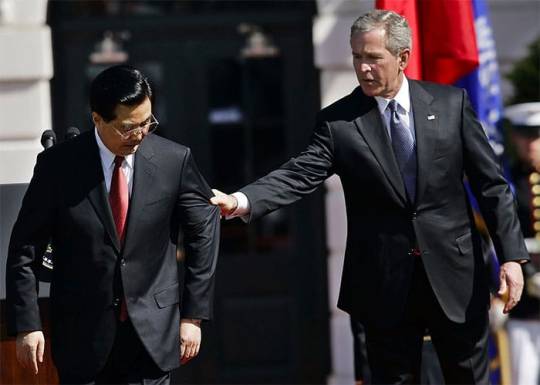
Bush grabs Hu Jintao’s suit jacket, causing him to lose face
But from the Chinese point-of-view, it was deeply insulting to see their nation’s leader being tugged at and treated like a small child.
In fact, the whole affair was so disastrous from a Chinese face-losing perspective, that the Chinese state media downplayed the visit– preferring instead to focus on Hu’s visit to Bill Gates’ mansion and to Boeing’s massive facilities in Washington State.
In January 2011, Hu finally got his full state visit when he was invited to visit President Obama (along with the 21-gun salute and state dinner). According to Philip M. Nichols, a Wharton professor of legal studies and business ethics, the visit was “symbolically successful”—explaining that “One of the things the meeting accomplished was that President Obama treated President Hu—and by extension the People’s Republic of China—with respect.”
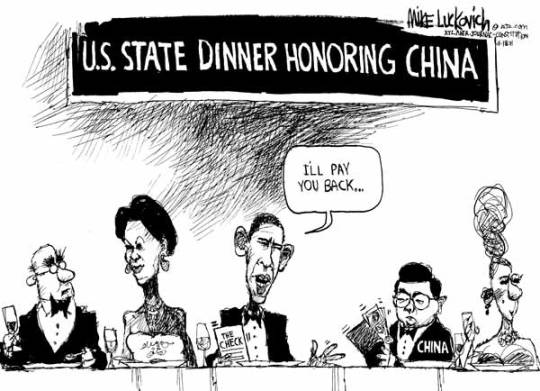
Another Example: 2010 Japanese Boat Incident
When I was living in China in September 2010, the Chinese state media was obsessively reporting on a two-week long spat between Japan and China. If not for face considerations, I doubt that the incident would have received all of the attention that it did.
If you know anything about Chinese history, you’ll know that the worst face-losing events were the Japanese invasions and occupations. Suffice it to say, there’s still very strong anti-Japanese sentiment in China (it’s very safe to say that they’re the most hated nation in China).
The basic incident: A Chinese trawler collided with a Japanese patrol boat in an area claimed by both countries. The Japanese coastguard let the crew go but arrested the captain. China responded with escalating threats and economic sanctions (even suspending Japan-bound shipments of rare earth metals crucial in advanced manufacturing).
Eventually, Japan let the captain go, although they didn’t give the apology that China demanded (after all, they have their own national face issues to deal with too).
Tips for Giving Face in China
Here are some simple tips to help “give face” to a business counterpart or friend in China.
Praising someone publicly: This is true especially in front of their elders or boss.
Giving high marks on customer evaluation forms: The Chinese are generally generous, especially when giving reviews of their teachers.
Treating someone to an expensive meal or banquet: The most common face-giving technique that makes Chinese business and society run is the big banquet.
Giving sincere compliments: Make sure that you’re showing that you’re enjoying yourself when being treated out.
Giving an expensive gift: If possible, the best thing you can give is an imported gift that can’t easily be bought in China.
Avoid These Face-Losing Situations
If at all possible, try to avoid these particular face-losing situations with a Chinese counterpart:
Openly criticizing, challenging, disagreeing with, or denying someone.
Calling someone out on a lie.
Not showing proper deference to elders or superiors.
Turning down an invitation with an outright no (instead, they usually say “maybe”, “yes, maybe”, “we’ll do our best”, ” let’s think/talk about it later,” or “I need to discuss it with so-and so first”)
Being late on a flimsy excuse (demonstrates that you don’t respect or take them seriously).
Interrupting someone while they are talking.
Being angry at someone –mutual loss of face for both parties
Revealing someone’s lack of ability or knowledge (such as being able to speak English).
https://www.china-mike.com/chinese-culture/cult-of-face/amp/?__twitter_impression=true
0 notes